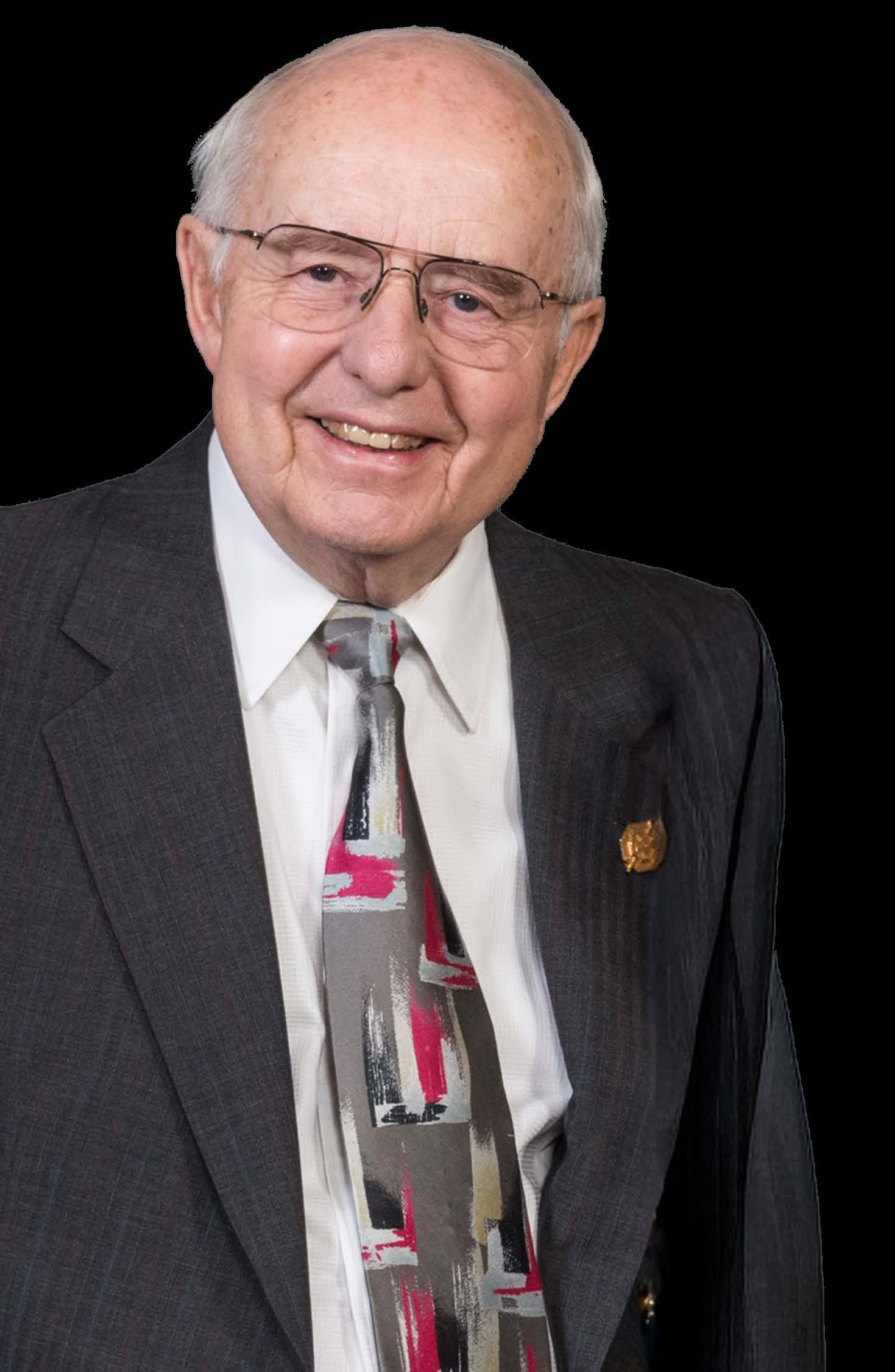

A LIFE OF AND Service Leadership
JAMES M. COPELAND
Jim’s legacy will be that of the NSDA’s second founder—the man who took the promise established by Bruno E. Jacob in 1925 and truly made it a reality.”
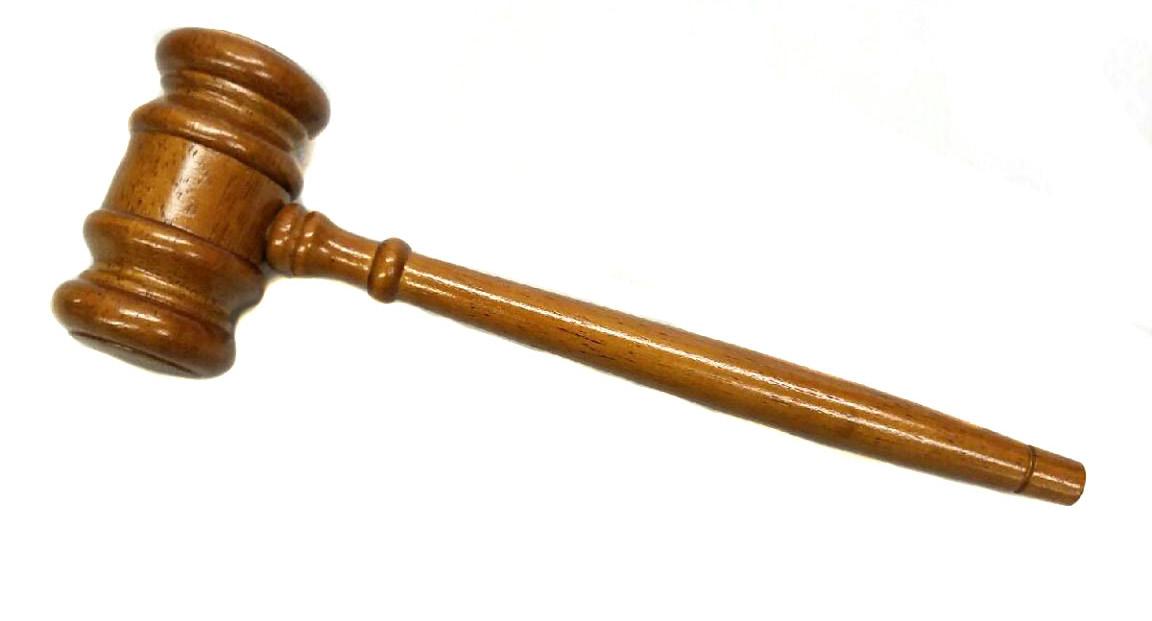
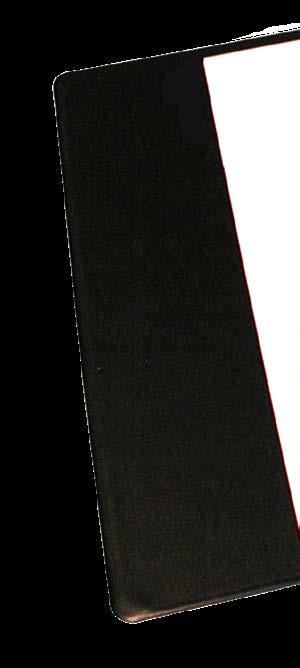
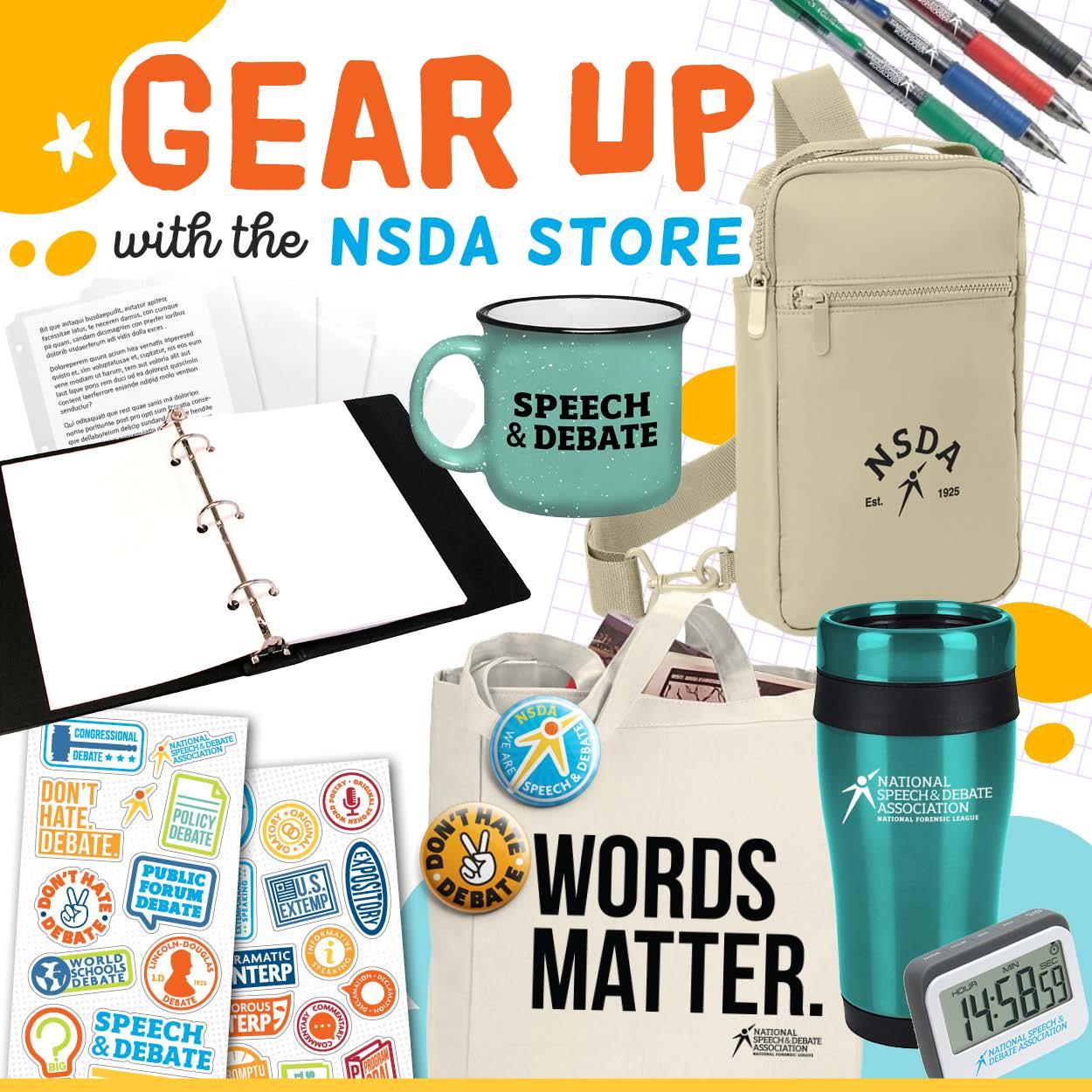
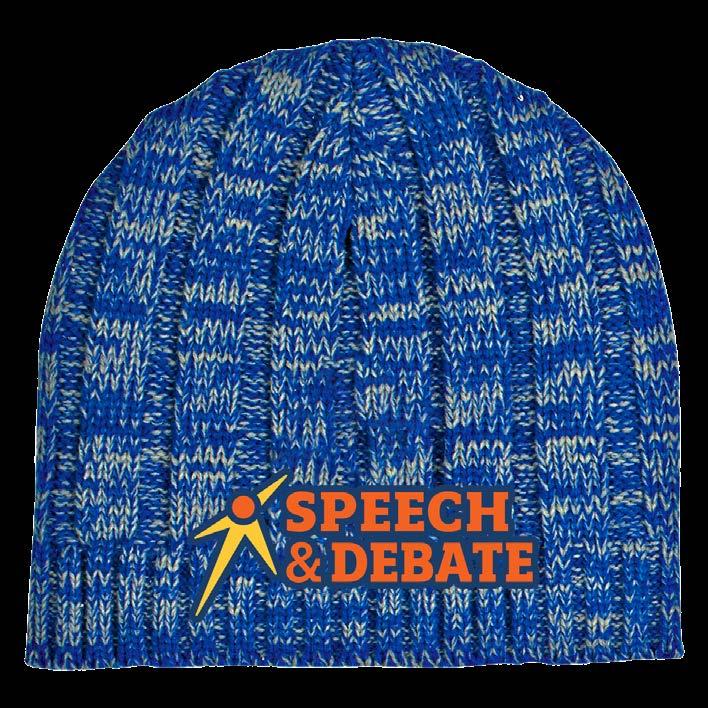
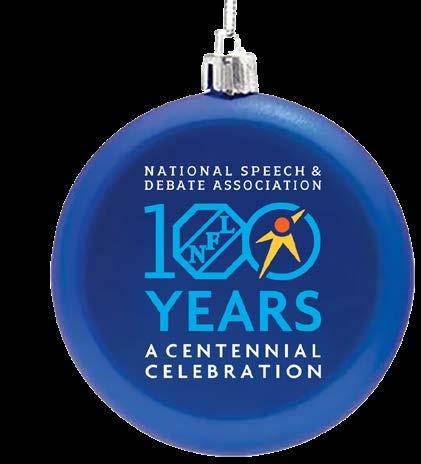
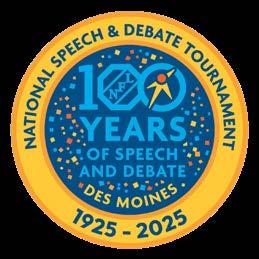
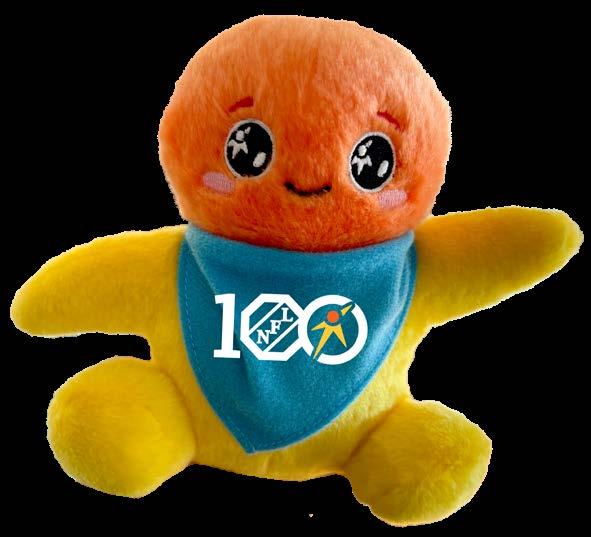
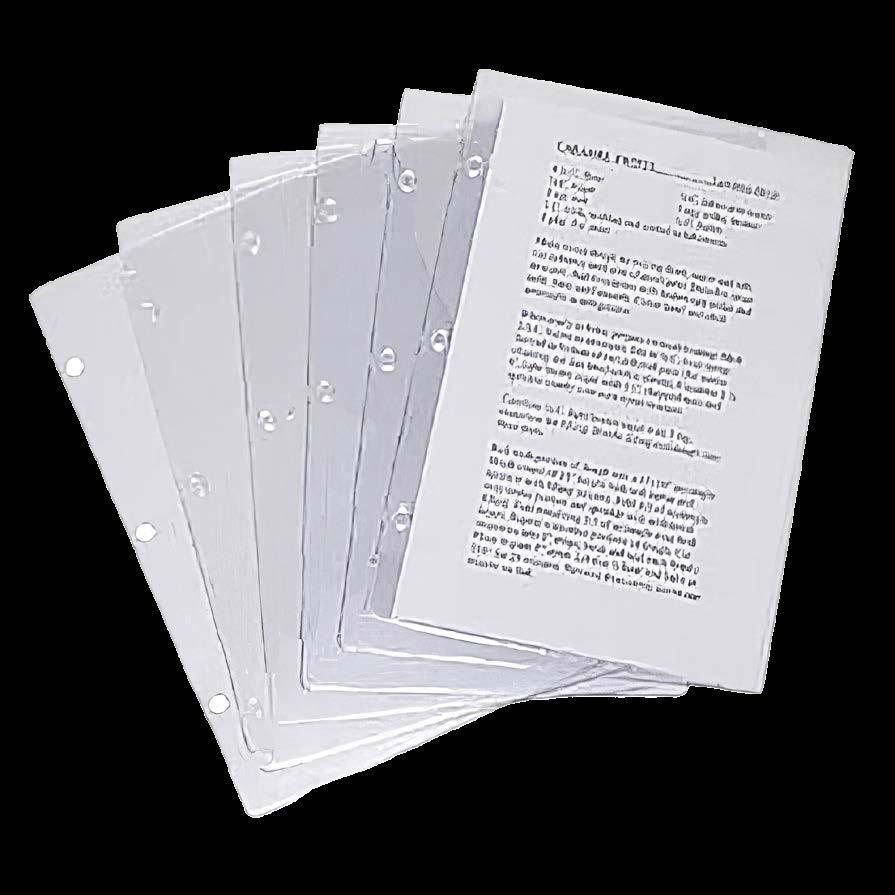

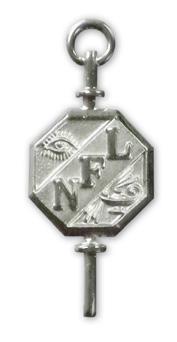
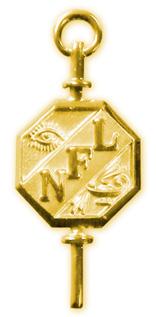
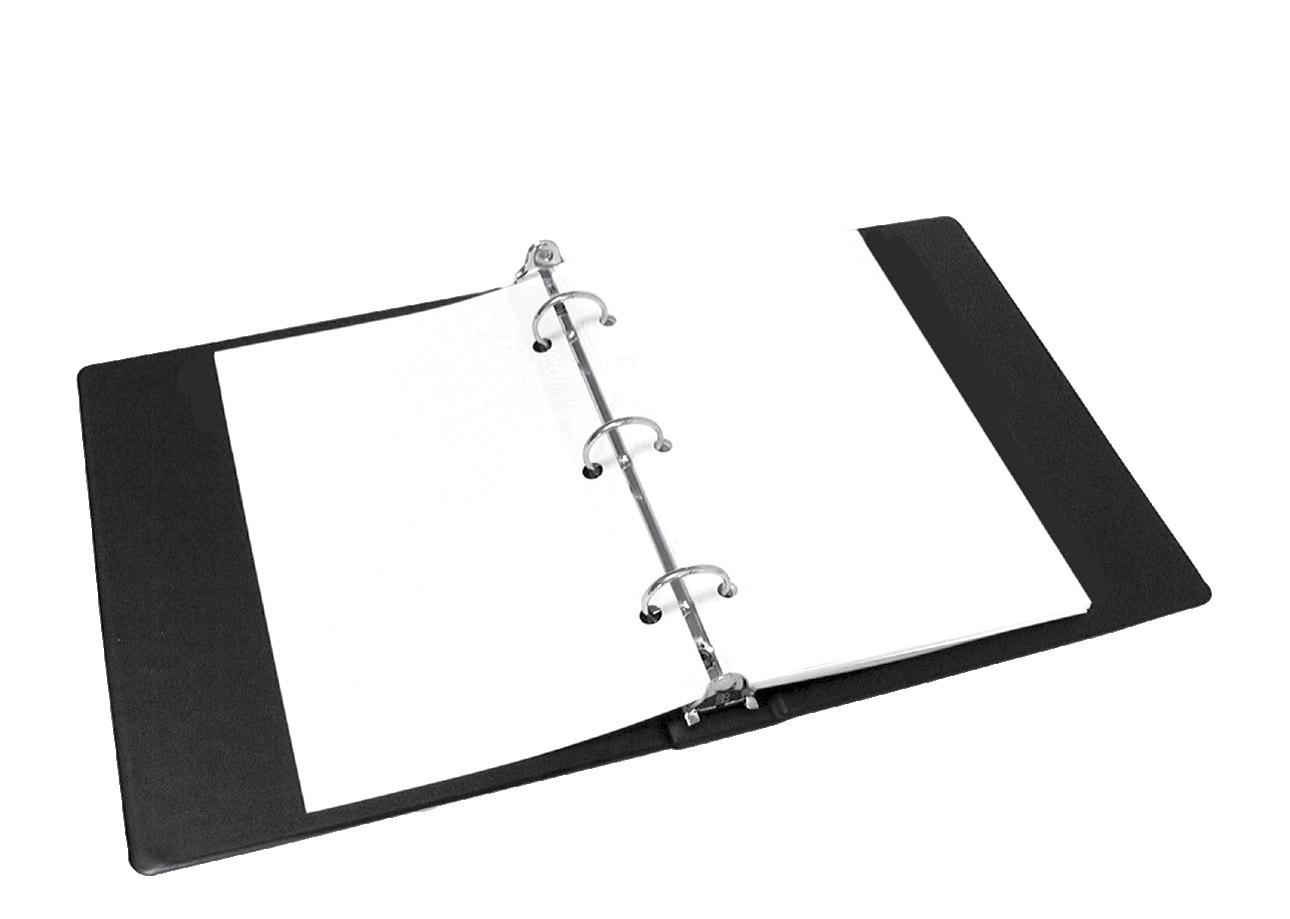
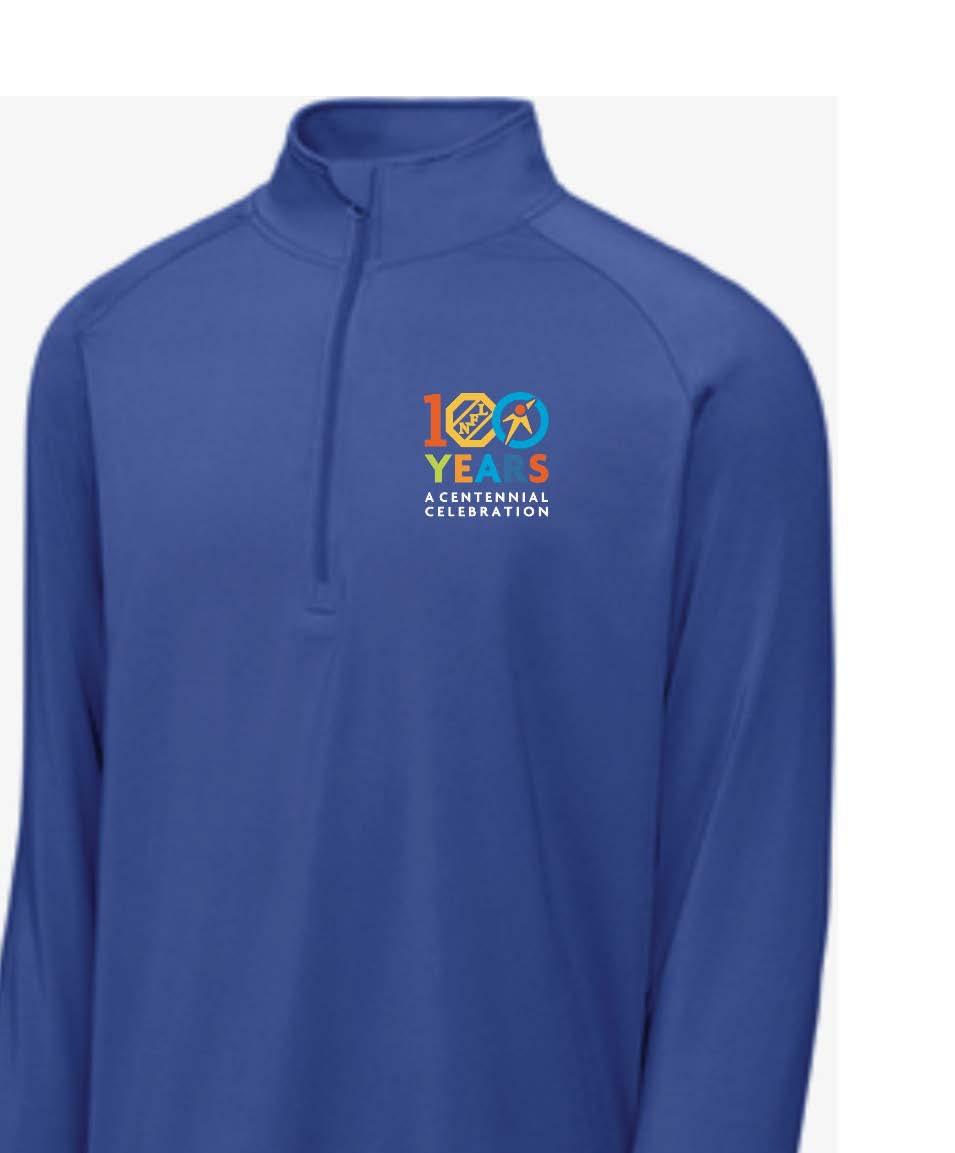
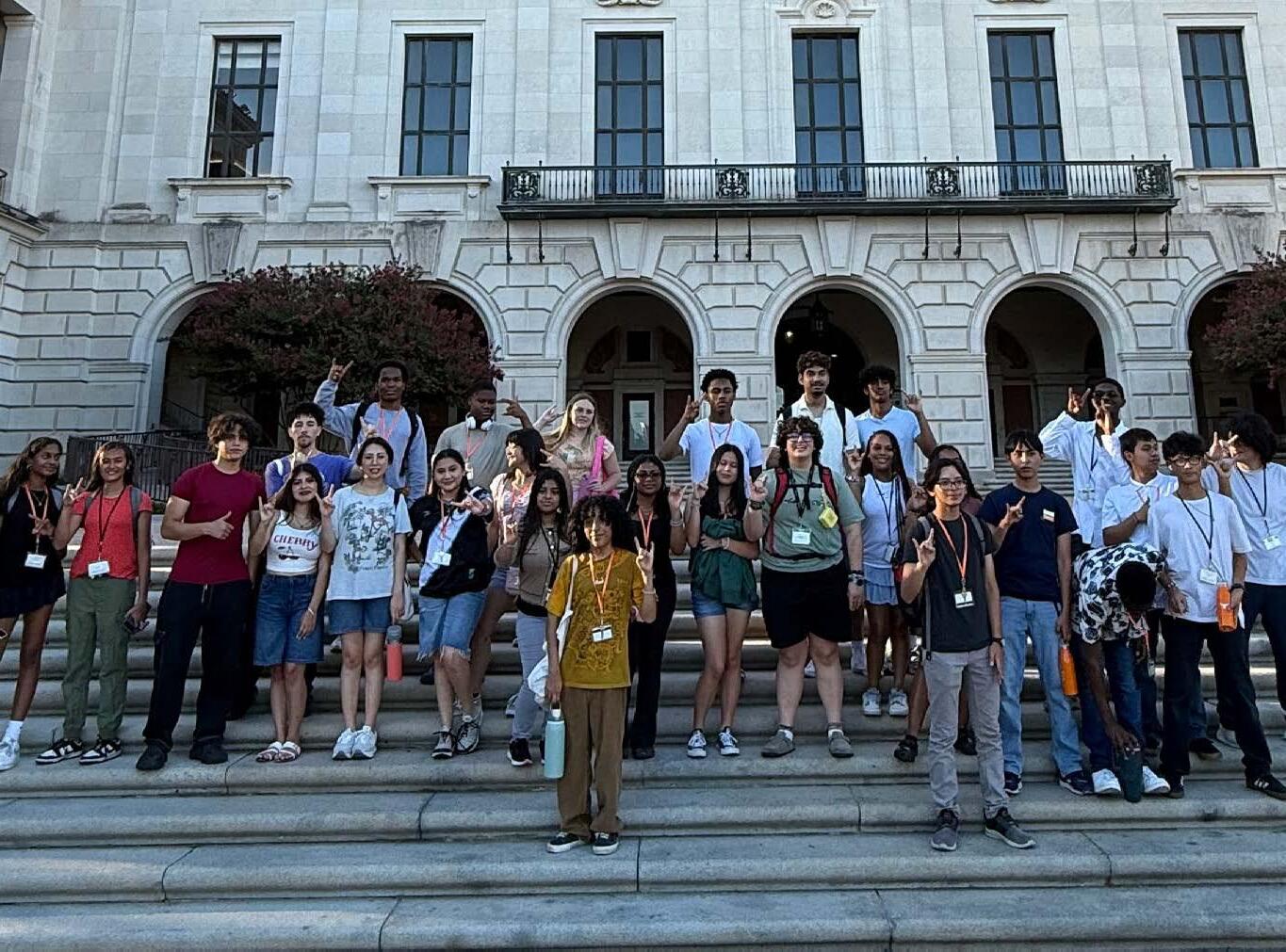
Service and leadership are at the heart of who we are. Every day, our members use their voices, talents, and empathy to uplift others and strengthen their communities. Their stories remind us that speech and debate extend far beyond competition, shaping compassionate citizens and changemakers.
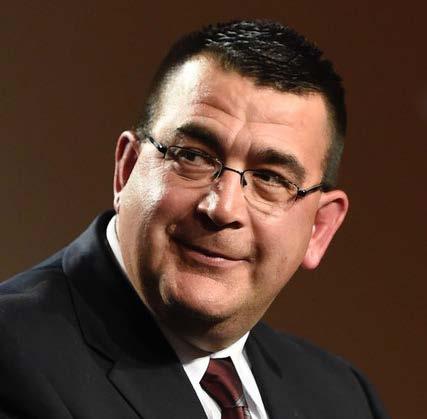
In this issue, we honor James M. Copeland, who led the NSDA as Executive Director for nearly 20 years following a distinguished coaching career. Jim’s steady leadership and deep institutional knowledge guided the Association through times of challenge and change. His passion for our mission embodies true servant leadership, and it is a privilege to share more about his lasting legacy.
This issue also highlights stories that reflect the values of our community. In our Student Spotlight, Spencer Chaisanguanthum exemplifies the impact of young leaders giving back. Jordan Melamed, back-to-back Congressional Debate top presiding officer and 2025 champion in the House, offers her perspective on leadership. We also feature Ransom Everglades High School in Florida, whose program sets a strong example of student leadership and teamwork.
The students and coaches featured in these pages put the tenets of our Code of Honor into action with purpose and generosity. Alongside these profiles, you’ll find practical resources to guide your work as well as celebrations of legacies that continue to shape our organization.
As we honor these achievements, I am deeply grateful for the countless members who live out these ideals every day. Your commitment strengthens our community and ensures that the spirit of speech and debate continues to make a lasting impact.
Sincerely,
J. Scott Wunn
Executive Director
Rostrum A PUBLICATION OF THE NATIONAL SPEECH & DEBATE ASSOCIATION
6600 Westown Parkway, Suite 270, West Des Moines, IA 50266 | Phone (920) 748-6206
J. Scott Wunn, Publisher
Amy Seidelman, Editor
Vicki Joss, Managing Editor
Annie Reisener, Associate Editor
Emily Bratton, Graphic Design Assistant
Newsstand Price
$9.99 per issue
Member Subscription Price
$24.99 for one year (5 issues)
Non-Member Subscription Price
$34.99 for one year (5 issues)
Rostrum (ISSN 1073-5526), Copyright © 2025 by the National Speech & Debate Association (NSDA), is published five times per year (Sept., Nov., Feb., Apr., and Aug.) by the NSDA, 6600 Westown Parkway, Suite 270, West Des Moines, IA 50266. Business and Editorial Offices: NSDA, 6600 Westown Parkway, Suite 270, West Des Moines, IA 50266. Accounting and Circulation Offices: 6600 Westown Parkway, Suite 270, West Des Moines, IA 50266. Call (920) 748-6206 to subscribe. Periodicals postage is paid at Des Moines, IA 50318, and additional mailing offices. POSTMASTER: Please send address changes to Rostrum, c/o NSDA, 6600 Westown Parkway, Suite 270, West Des Moines, IA 50266. Rostrum provides a forum for the speech and debate community. The opinions expressed by contributors are their own and not necessarily the opinions of the NSDA, its officers, or its members. The National Speech & Debate Association does not guarantee advertised products and services unless sold directly by the NSDA.
Board of Directors
Byron R. Arthur President Louisiana
David Huston
Vice President Texas
Jamelle M. Brown Missouri
Sara Gibson Washington, D.C.
Adam J. Jacobi Wisconsin
Erez Kalir California
Anoop Mishra Treasurer Alabama
Renee C. Motter Colorado
Wendy Orthman Michigan
Esther Oyetunji Florida
James W. Rye III Alabama
Josh Swartsel Washington, D.C.
Holly Williams Secretary, Administrative Rep Arizona To learn more about the Board, visit www.speechanddebate.org/ meet-the-team. You may also contact the Board by emailing board@speechanddebate.org.
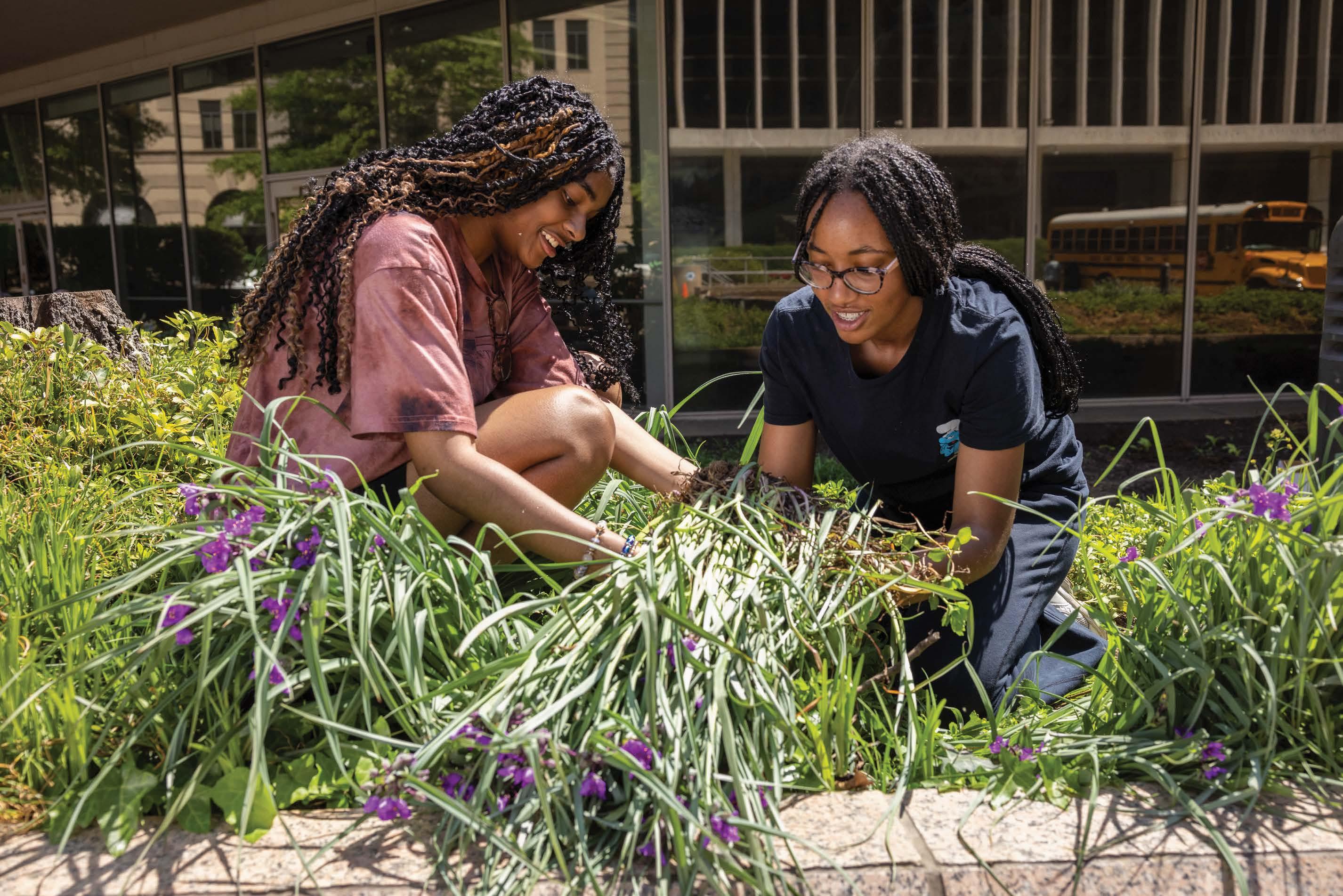
by
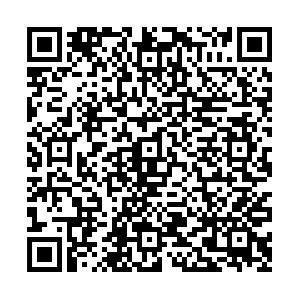
Photo
Mark Thiessen
In this Issue

www.facebook.com/ speechanddebate
Share with us on Instagram @speechanddebate
Follow us on X @speechanddebate
Follow us on LinkedIn www.linkedin.com/company/nationalspeech-and-debate-association
Follow us on TikTok @nsda.speechanddebate
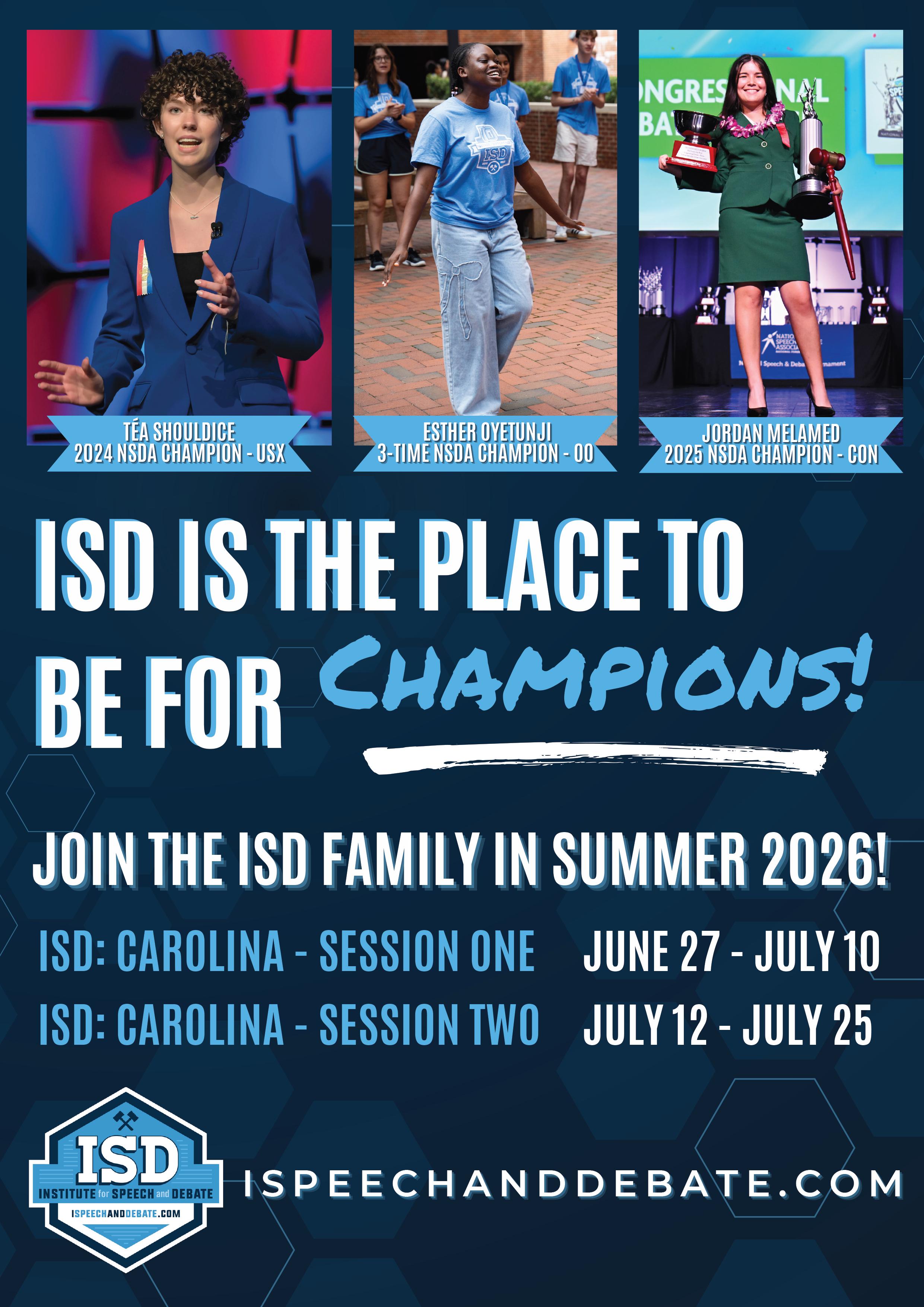
Topics
Current topics, voting links, and resources available at: www.speechanddebate.org/topics
Member students and one chapter advisor per school are eligible to vote!
Topic Creation Hub
We’ve created a central hub to answer your frequently asked questions about how topics are generated throughout the school year, along with ways you can get involved in the process! Learn more at www.speechanddebate.org/topic-creation-hub
Join a Wording Committee
Your voice matters in shaping NSDA events! All coaches and former competitors are invited to apply to join a Wording Committee for PF, LD, BQ, or 2026 National Tournament topics (World Schools, Extemp Debate, and Extemp Speaking). Committees research, draft, and refine topic options, directly impacting tournaments. Virtual meetings run March through April. Learn more and apply online by January 16, 2026, at www.speechanddebate.org/topic-creation-hub.
Policy Debate Topic Fellowships
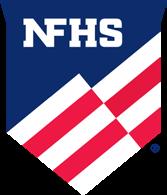
The NSDA has partnered with the National Federation of State High School Associations (NFHS) to offer two Policy Debate topic fellowships with a goal of increased representation in the topic selection process. High school Policy Debate coaches who are interested in writing a topic paper and attending the annual topic meeting to support the mission of choosing timely, accessible, and student-centered topics are encouraged to learn more and apply online by April 1, 2026. Learn more at www.speechanddebate.org/ policy-topic-fellowship.
Congress Legislation: Seeking Student Voices
Any high school or middle school NSDA member student, regardless of their national qualification status, may submit legislation to be considered for the 2026 National Tournament Docket. If their legislation is selected, they will be recognized in Rostrum, receive a trophy after the tournament, and be awarded a $100 scholarship. Encourage your students to complete the online form by February 5, 2026, at www.speechanddebate.org/congresssubmission
Topic Rubric
The NSDA conducts an intentional and ongoing evaluation of the topics we encourage students to explore. Download a copy of the Topic Rubric Questions at www.speechanddebate.org/topic-rubric.
Share Your Topic Suggestions
We invite you and your students to send us your debate topic ideas for Lincoln-Douglas, Public Forum, and Big Questions as well as potential motions for consideration in World Schools Debate. Access the online submission forms at www.speechanddebate.org/topic-creation-hub
NOVEMBER/DECEMBER 2025
Public Forum Debate
Resolved: The United States federal government should require technology companies to provide lawful access to encrypted communications.
NOVEMBER/DECEMBER 2025
Lincoln-Douglas Debate
Resolved: The United States ought to rewild substantial tracts of land.
2026–2026
Policy Debate
Resolved: The United States federal government should significantly increase its exploration and/or development of the Arctic.
2025–2026
Big Questions Debate
Resolved: Moral systems rooted in theism are preferable to non-theistic moral systems.
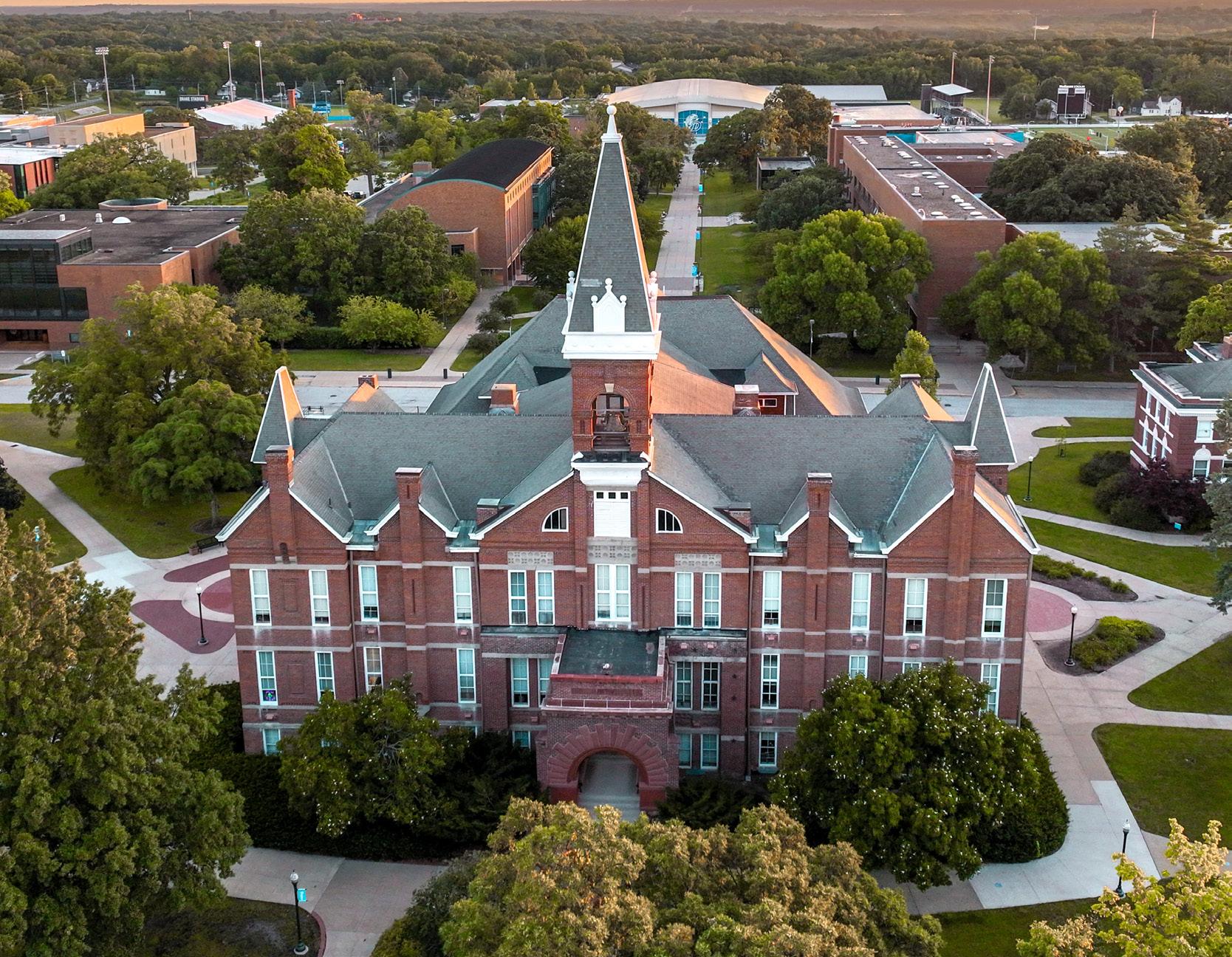
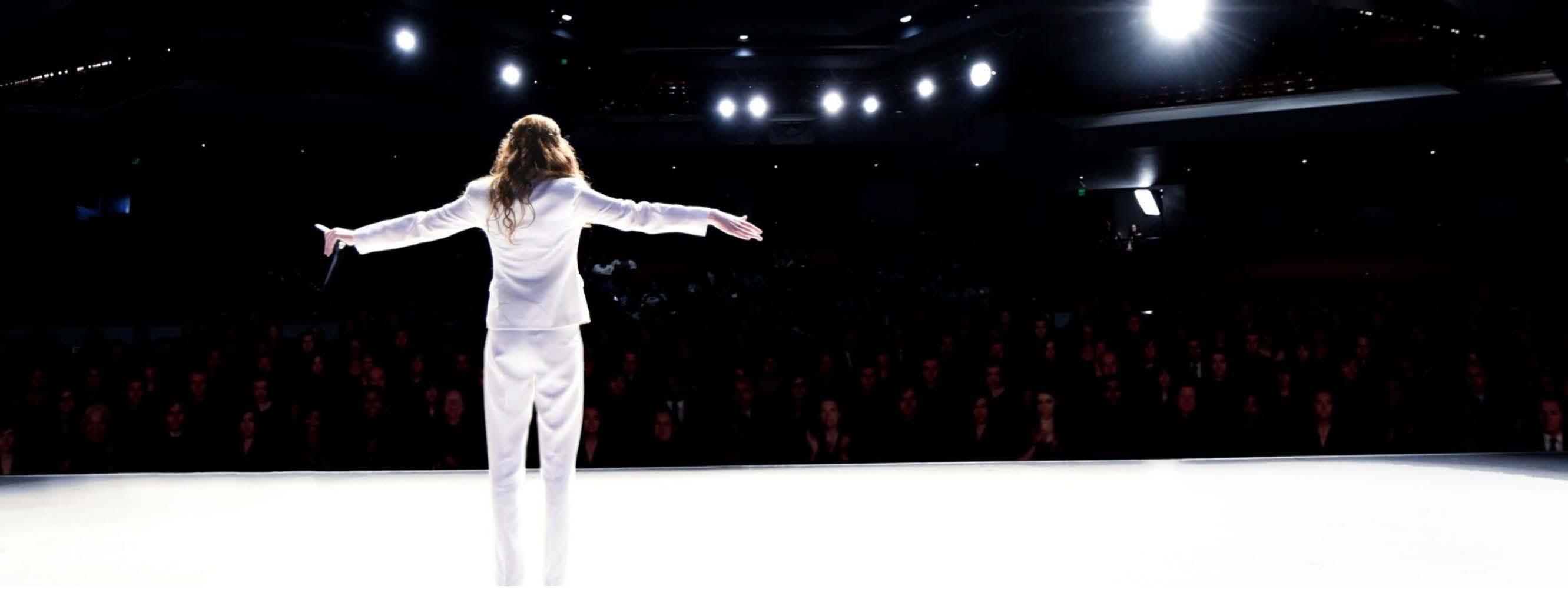
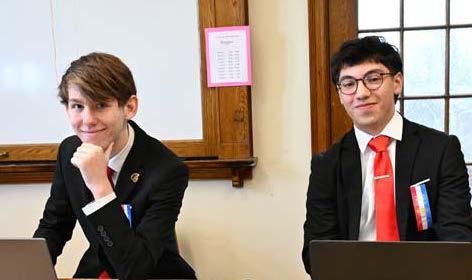
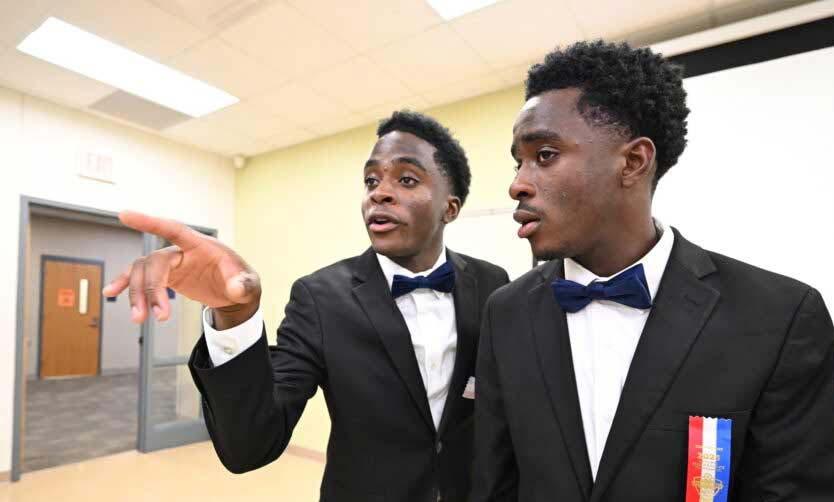
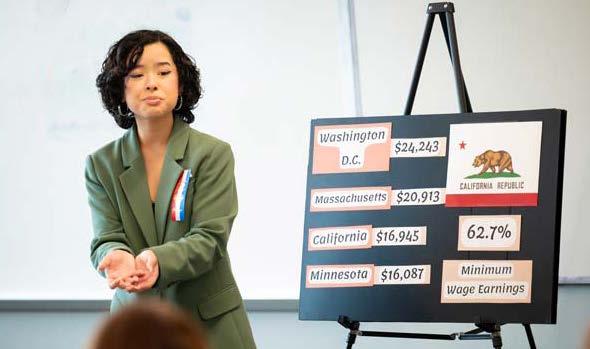
The National Speech & Debate Association (NSDA) is the largest speech and debate organization in the United States, supporting interscholastic tournaments, schools, coaches, and students since 1925. Students compete in more than 10 speech, public speaking, and acting events and five debate events across the country and around the world through our growing network of international schools.
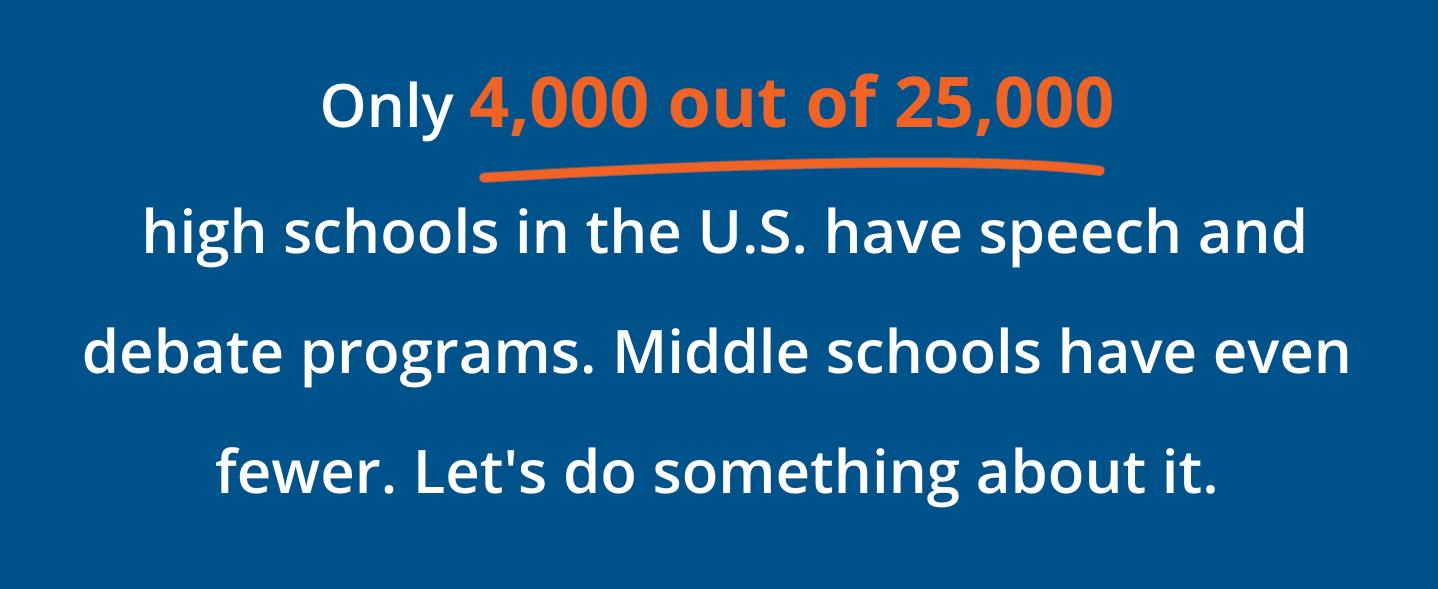

EMAIL info@speechanddebate.org | CALL (920) 748-6206 | VISIT www.speechanddebate.org/giveback
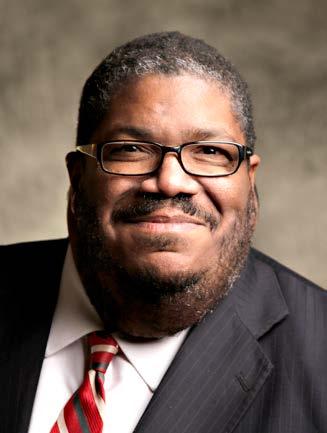
From Your Board President
LOWERING BARRIERS, RAISING VOICES
The strength of our community begins with our coaches. They are the backbone of every program, guiding students through victories and setbacks, nurturing voices, and creating opportunities that shape lives. Yet too often, especially in their early years, coaches face the work alone—navigating complex rules, tournament logistics, and program demands without clear support.
That changes next year. The NSDA is launching a scalable, high-quality Coach Support System designed to strengthen training, mentoring, and retention. Our goal is simple: lower barriers to entry, build sustainable programs, and ensure every coach feels supported as part of a thriving network.
What’s Coming Next Year
Mentorship Program: Established coaches will be paired with new coaches to share wisdom, encouragement, and practical guidance. This connection eases the transition into coaching while
giving veteran coaches meaningful ways to give back.
Caseload System: Each new NSDA program advisor will be assigned to a Coach Support Specialist (CSS)—their first point of contact for questions about tournaments, curriculum, or team management. No coach will have to wonder where to turn for help. Reimagined Resources: We are rethinking professional development for coaches to make it substantive, organized, engaging, and interactive. These resources will provide structure while encouraging creativity and collaboration.
Why This Matters
This initiative is about more than new tools—it’s about people. By building a support system, we are:
Lowering barriers to entry. New coaches can focus on building strong teams rather than struggling through steep learning curves.
By supporting coaches, we are ultimately supporting students.”
Fostering community. No one should feel isolated. Mentors and CSS contacts will ensure new coaches know they belong.
Improving retention. Coaches who feel confident and equipped are more likely to stay, keeping programs strong for years to come.
Elevating experience. Veteran coaches will have a structured way to share their knowledge and continue shaping the future of the activity.
This is a bold investment in the people who make our mission possible. By supporting coaches, we are ultimately supporting students, ensuring that every young person, regardless of background, can access the life-changing benefits of speech and debate.
I am proud of this step forward. It reflects our shared commitment to sustainability, inclusivity, and excellence. Most importantly, it ensures that coaches feel the same encouragement and inspiration they work so tirelessly to provide for their students. Together, we are building a stronger, more connected future for our activity.
Until next time,
Byron R. Arthur NSDA Board President board@speechanddebate.org
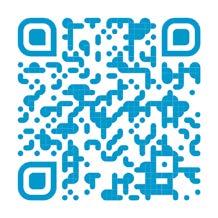
Established coaches, we invite you to complete our survey by December 31, 2025, to offer your input on the new Coach Support System: www.surveymonkey.com/r/established25
SPRING INTO SERVICE
Consider an NSDA Leadership Role
EDITOR’S NOTE
Each spring, the NSDA welcomes new leaders who help shape the future of speech and debate. Learn how the upcoming Board appointments and CRLC elections advance our shared mission—and why student and young alumni representation marks a milestone for our community.
Board Appointment in 2026
At the National Speech & Debate Association, service is at the heart of everything we do—service to students, coaches, and schools; to the ideals of communication and critical thinking; and to one another as members of a vibrant community. Each spring, that spirit of service comes to life through the appointment of new members to the NSDA Board of Directors and the election and appointment of Competition and Rules Leadership Committee (CRLC) members. These groups play a pivotal role in shaping the direction of our organization and ensuring that our mission, vision, and values guide every step forward.
This year marks an exciting milestone as high school and college students serve for the first time, underscoring our belief that the most effective organizations don’t just serve young people—they serve with them.
The NSDA Board of Directors is the legal governing entity of the organization and is responsible for setting the ultimate direction of our work. From stewarding the strategic plan to ensuring the long-term health and sustainability of the NSDA, Board members serve as visionaries, advisors, and collaborators.
Board service is a unique opportunity to help shape the long-term strategy of the NSDA. Each year, the Board’s nominating committee reviews candidates based on qualities that reflect our shared values: mission alignment, leadership experience, community reach, and commitment to the work. While the process is rigorous, it’s also deeply rooted in our belief that strong governance begins with people who care—individuals willing to lend their time, expertise, and passion to the greater good.
Appointments for 2026 will be made by May 1, with terms beginning August 1. At least five new members will be appointed, including at least two active NSDA coaches who will also join the CRLC for three-year terms. Those interested in serving are encouraged to complete the online Board Member Interest Form. Self-nominations are welcome!
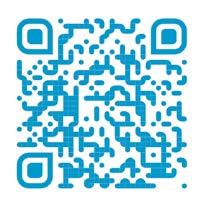
LEARN MORE
www.speechanddebate.org/ board-appointment
Competition and Rules Leadership Committee 2026 Election
In parallel with the Board appointments, the Competition and Rules Leadership Committee (CRLC) will hold its next election in the spring. The CRLC’s work directly impacts the experience of thousands of students and coaches nationwide. Members assess stakeholder needs, evaluate competition rules, and ensure that all NSDA contests and programs reflect educational merit, competitive integrity, and our commitment to equity.
In 2026, elections will be held to fill regional seats serving three-year terms representing Texas, the Southeast, the Mountain/Southwest, and the Southern Midwest (refer to map below). The committee meets quarterly online and works in subcommittees throughout the year, offering a meaningful but manageable opportunity for service. Members receive a modest stipend for their time—a reflection of our appreciation for the expertise and energy they bring to the work.
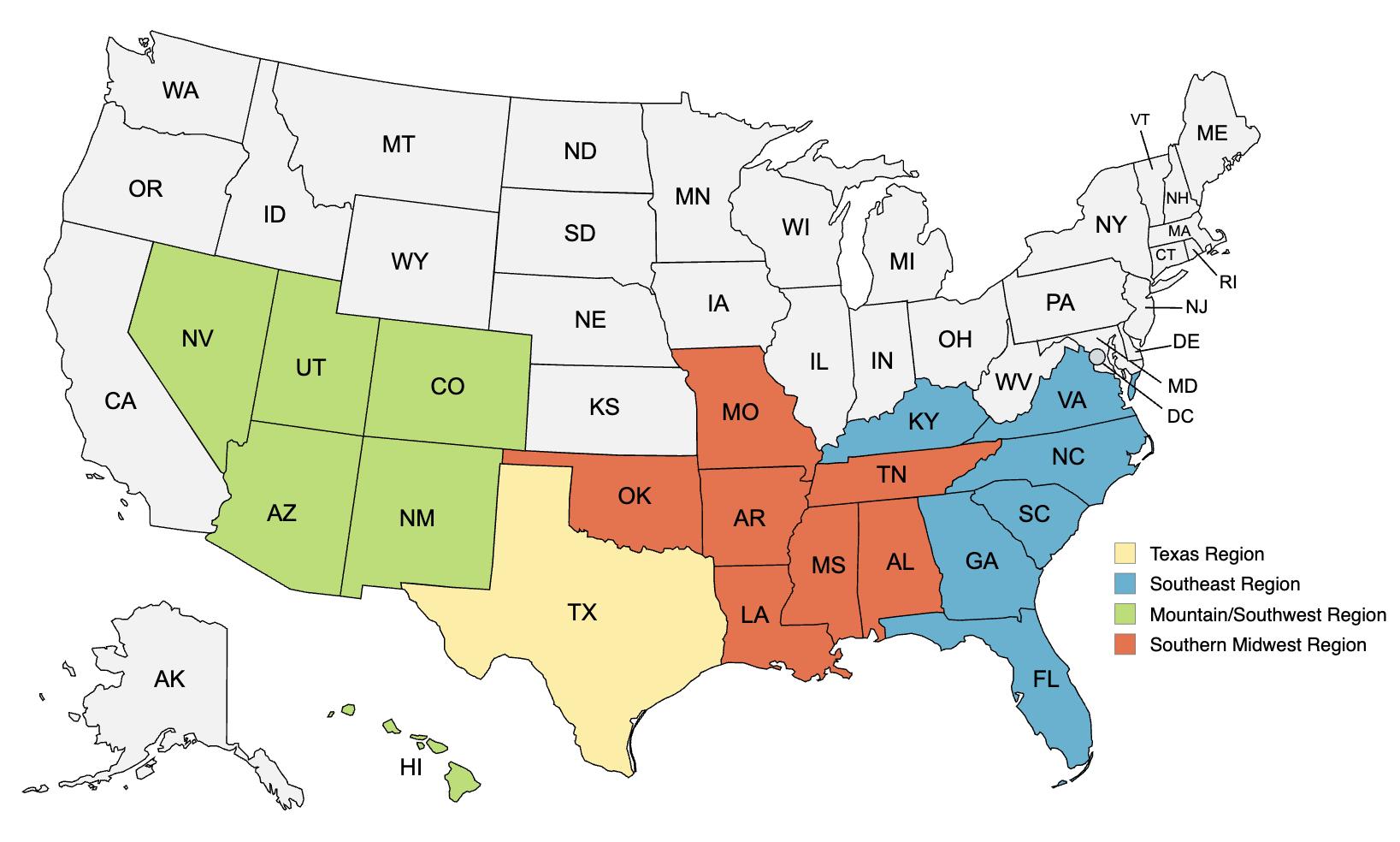


2026 CRLC Regional Elections
A Call to Serve
If you’ve ever considered serving the NSDA in a leadership capacity, this is your moment. Whether through the Board of Directors or the Competition and Rules Leadership Committee, your experience, curiosity, and commitment can make a tangible difference.
For more information on our current Board as well as all the links referenced in this article, visit www.speechanddebate. org/meet-the-team. To review recent minutes for information on what our leadership has recently discussed and decided, visit www.speechanddebate.org/minutesarchive
The CRLC includes both appointed and elected members, ensuring a balanced representation of experiences and regions. The addition of student voices for the first time this year adds a valuable new dimension of perspective to the group’s work, enriching our collective understanding of what matters most in competition and community.
CRLC candidacy applications and nominations for the spring 2026 election are due January 23, 2026, with voting set for April 1-22, 2026. One advisor per active NSDA school is eligible to vote, and results will be announced April 30, 2026. Candidacy and nomination forms will be available online soon!
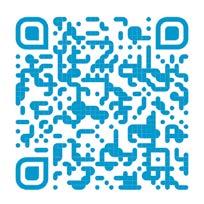
LEARN MORE www.speechanddebate.org/ competition-rules-leadership-committee
Service that Drives Impact
The NSDA’s strategic plan calls on us to inspire and empower students through speech and debate education and to elevate the educators who make that possible. The leaders who serve on the Board and CRLC take that charge seriously—not only through governance and rulemaking but by helping us listen more deeply to our community. Every new appointee or elected member adds to the collective strength of the organization, bringing insights that help us better serve our members and fulfill our mission.

LEARN MORE tinyurl.com/msa2wwbw
compiled by Amy Seidelman, Assistant Executive Director at the NSDA.
Youth Voices in Leadership
For the first time in NSDA history, students are serving on both the Board of Directors and the Competition and Rules Leadership Committee— bringing fresh insight and firsthand experience to our work. Including current students and young alumni in governance and rulemaking helps the NSDA remain responsive and relevant. It bridges generations of speech and debate participants and builds shared understanding between coaches and competitors. Most importantly, it reminds us that service is a two-way exchange—when we give students and alumni a seat at the table, we gain invaluable insight into how our work is received, experienced, and reimagined for the future.
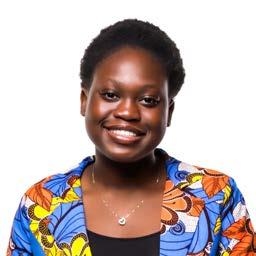
Esther Oyetunji, Florida Board of Directors
A three-time NSDA national champion in Original Oratory and alumna of American Heritage Broward (FL), Esther is the first young alumni representative to the Board of Directors. Now a sophomore at Emory University, Esther continues to coach and mentor students while pursuing a Bachelor of Arts in Spanish on the pre-medical track.
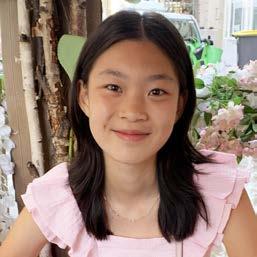
Brianna Zhang, Michigan
Competition and Rules Leadership Committee
Brianna brings her experience on the Student Leadership Council to her role as a CRLC Student Representative. Speech and debate has helped her develop confidence in speaking, and she wants to help others have as positive of an experience as she has had.

Manvitha Narasimhan, Arkansas
Competition and Rules Leadership Committee
A Student Leadership Council member, Manvitha serves alongside Brianna on the CRLC, and is incredibly grateful for this opportunity and excited to represent Arkansas and advocate for rural speech and debate nationwide!
NEWS + NOTES
Recent Honor Society Recognition
2024-2025 Speaking and Service Awards
Speech and debate is about more than competition. The Honor Society also celebrates students using their skills to better the world around them. The Speaking and Service Award annually recognizes students who go above and beyond in their service to their teams, schools, and communities. Students receive this award when they earn 200 service points in a given year, the maximum number possible in a school year in our Honor Society. The deadline for points entry was July 31. Congratulations to the 2024-2025 recipients! Find the complete list at www.speechanddebate.org/studentrecognition.
2024-2025 All Americans
Each year, the top student point earners in the NSDA are named All Americans. The All American award is based on a combination of competitive and service points, of which no more than 25% of the point total can include service. In order to qualify, a student must have competed once at Nationals. Join us in congratulating the 2024-2025 All Americans! Learn more at www.speechanddebate.org/student-recognition
Big Questions Topic Update
Two options for the 2025-2026 Big Questions debate topic were put up for a national vote, and on August 1, the winning topic was announced as Resolved: Religious belief is a prerequisite for morality. After considering coach feedback, the Competition and Rules Leadership Committee suggested a slight wording change to ensure more robust debate. The updated topic is effective immediately. Tournament hosts who have already scheduled their events may use either version, but all district tournaments and the National Tournament will use the revised wording. The updated 2025-2026 Big Questions topic is, Resolved: Moral systems rooted in theism are preferable to non-theistic moral systems.
Recent Minutes
Stay up to date on recent rules changes and other decisions impacting your NSDA membership. Find minutes from past Board of Directors’ and Competition and Rules Leadership Committee (CRLC) meetings online at www.speechanddebate.org/minutes-archive.
Hall of Fame and Legend Nominations
The highest honor for any high school speech and debate coach is election to the National Speech & Debate Association Hall of Fame. Each year, nominations are sought from member coaches. Individuals with 25 years of NSDA coach membership prior to the start of the National Tournament, or who are retired from coaching and teaching, are eligible for this prestigious award. In addition, a Hall of Fame Legend is a coach or non-coach adult who is worthy of consideration for this high honor. Any coach, student, alum, or speech and debate supporter may nominate an individual for consideration. Access the online nomination forms by February 16 at www.speechanddebate.org/hall-of-fame
Student Leadership Council Nominations
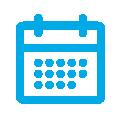
Mark your calendar! Do you have a student who wants to give back to the speech and debate community? Nominate them for the Student Leadership Council (SLC)! The SLC creates resources and provides feedback throughout the year to improve the NSDA student experience. This is a unique way to influence the organization’s future and an excellent addition to any student’s resume. Visit www.speechanddebate.org/student-leadership-councilnomination to nominate an interested student by February 15.
Postage Report
The NSDA submits an annual postage report for Rostrum as required by the U.S. Postal Service. Visit www.speechanddebate.org/ 2025-postage-report for details.
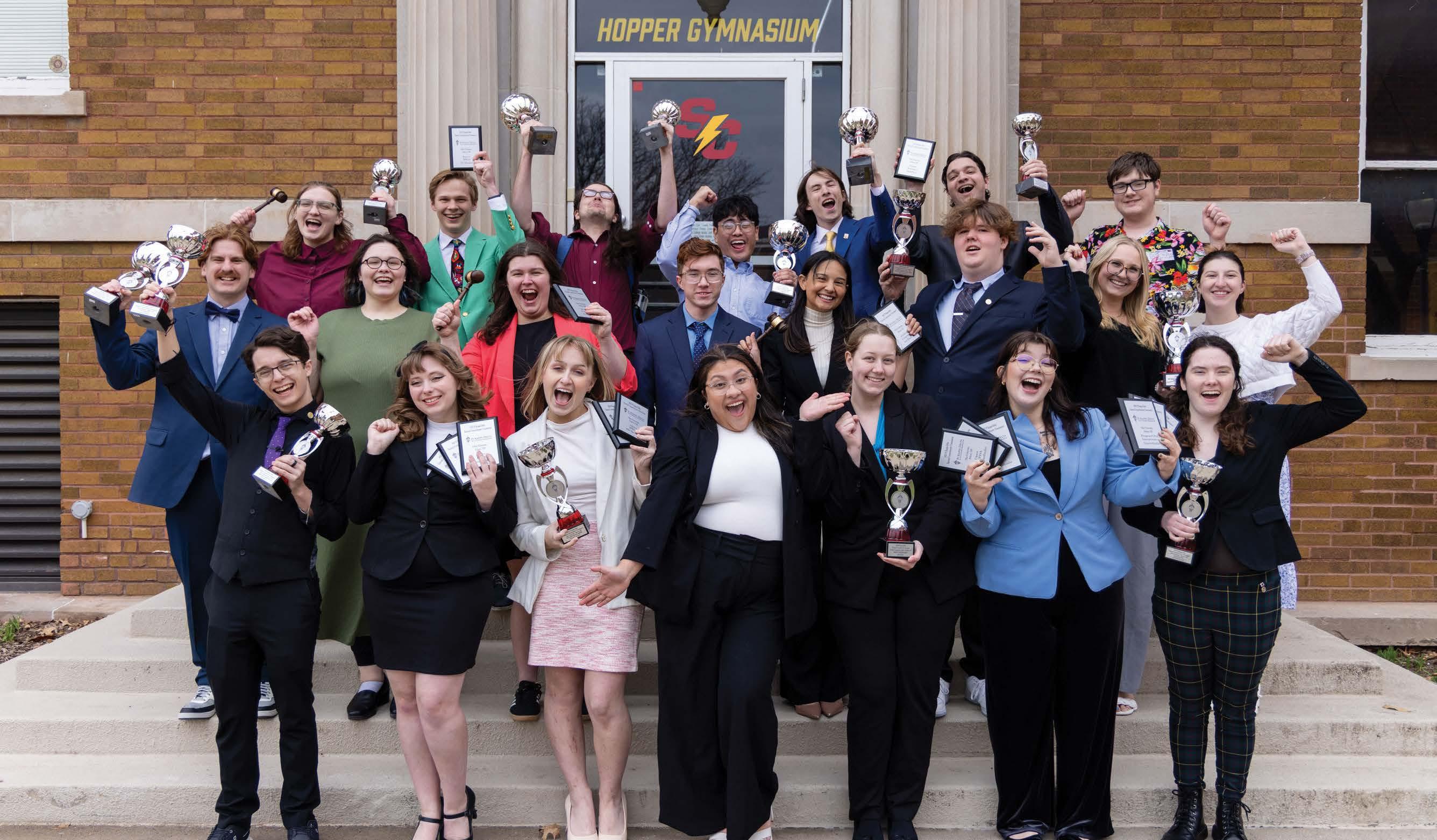
SPEECH & DEBATE
–All 11 AFA Individual Events + Pi Kappa Delta Supplemental Events –9x Pi Kappa Delta National Champions
Simpson’s team philosophy is that when you participate in speech and debate, you become a part of something bigger than yourself. You are a valued and important part of a team – a team dedicated to helping each other become better competitors and the best version of themselves.
Through debate, you better understand all sides of an issue. This means learning from others and embracing different points of view. Through speech, you organize and confidently present your ideas to others. This means learning how to construct information and effectively use verbal and non-verbal communication skills.
But more importantly, Simpson Speech & Debate is a place where you form strong team bonds and develop lasting friendships with not only your team members, but others in the speech and debate community.
The team will encourage you, challenge you, and support you as you learn and develop critical thinking skills and presentation skills that you can use for the rest of your life! Winning is important, but our team philosophy is what makes Simpson Speech & Debate special.
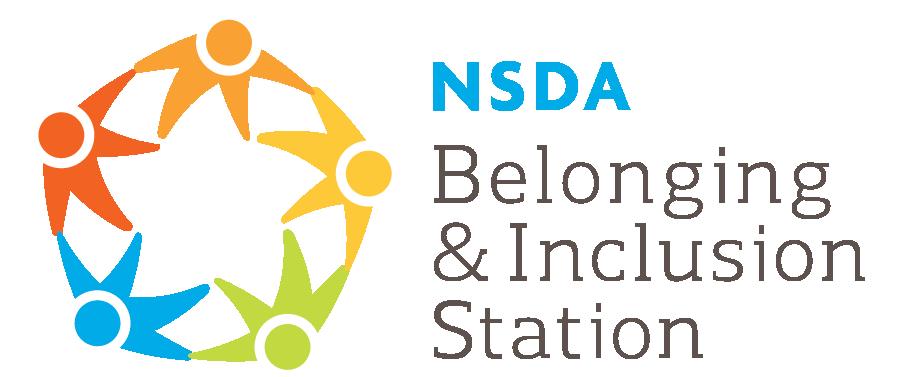
Subject of concern has an option to appeal corrective action
The Truth About the BIS: An Educational Resource for Support and Conduct
by Dr. Paul Porter
Since its launch in the 2022-2023 season, the Belonging and Inclusion Station (BIS) has evolved into an educational resource commonly used at NSDA district tournaments and the National Tournament designed to ensure that tournament participants feel safe, supported, and respected. No matter your political preference or worldview, the BIS is a practical, peoplecentered system for addressing conduct, promoting fairness, and caring for participants who experience distress or conflict. It exists to help individuals navigate interpersonal challenges, provide emotional support, and uphold the NSDA’s Harassment and Discrimination Policy in a fair, balanced way. This article explains the purpose and function of the BIS as a key resource for fostering equity and community at tournaments. We invite you to discover how the BIS can enrich your tournament community—and to consider offering it the next time you host!
It is important to understand that the BIS is not a disciplinary office or a sociopolitical weapon—it is about fairness, care, and responsibility. Its role is to help all tournament participants communicate effectively, understand one another, and resolve issues in ways that restore trust and respect. If your school has a conduct officer or counselor’s office, they have the trappings of a BIS. Competitors, coaches, judges, and visitors can approach it for guidance, support, or to address concerns. Visitors may come to the BIS after hearing an offensive remark, needing space to process a powerful performance, or feeling emotional after competition results. In every case, the goal is the same: to listen, support, and resolve concerns with empathy and fairness.
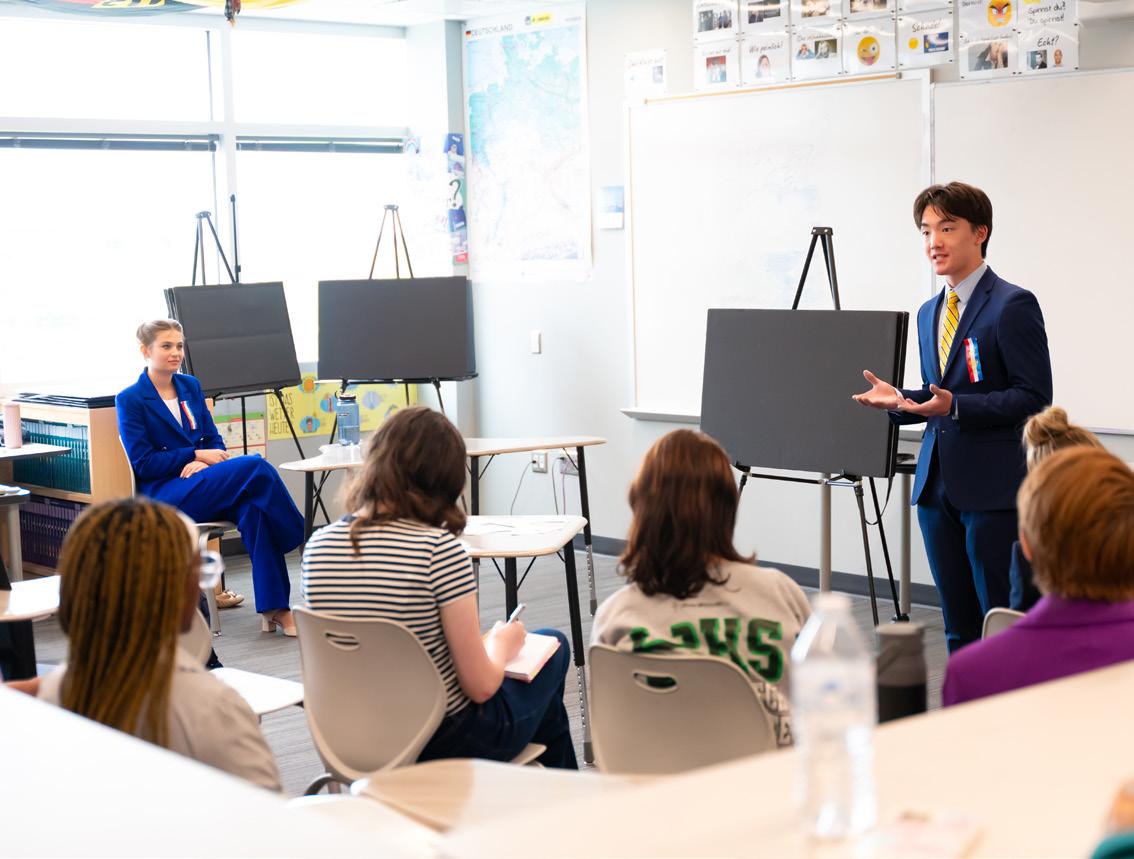

Guiding the BIS: Three Pillars and the CARE Method
The BIS operates using complementary frameworks: three pillars and the CARE method.
The pillars—Teaching, Learning, and Healing—shape how the BIS supports visitors. The BIS model is built on the belief that education and empathy are more powerful than punishment.
TEACHING
Helps participants understand how exclusion or harassment impacts others
LEARNING
Guides individuals to take responsibility, recognize harm, and grow from their actions
HEALING
Provides a supportive space to process difficult experiences, leaving visitors feeling understood, supported, and restored
Additionally, the CARE method defines how Belonging and Inclusion Advocates (BIAs) engage with participants.
C IVILITY
Emphasizes respect and professionalism in all interactions
A DVOCACY
Ensures everyone feels heard and supported
R ESTORATIVE COMMUNICATION
Focuses on repairing harm and fostering understanding rather than assigning blame
E DUCATION
Helps participants learn from experiences and strengthen the community for the future

The BIS Intake Process
When more structured action is necessary, the BIS follows a clear intake process. A concerned individual submits their issue in writing via an intake form. The BIA then conducts an Inquiry to gather information. If needed, the BIA may recommend a Resolution, outlining corrective action. The subject of concern has the right to an Appeal to ensure fairness and transparency. Almost all situations are resolved through education and dialogue, but when education alone isn’t enough, the BIS can take steps that align with tournament policies and due process.
Ultimately, the BIS reflects the NSDA’s commitment to making competitive speech and debate a space defined by peace, justice, and mutual respect. It provides students, judges, and coaches a place to turn when something feels off—or when they simply need to be heard. In doing so, the BIS strengthens not just conduct, but community, allowing all participants to focus on what truly matters: the growth, learning, and empowerment that speech and debate are built to inspire.
the resolution and appeal steps, should be utilized when behavior warrants action beyond education and dialogue.
INTAKE
A concerned person wants an issue addressed beyond interpersonal support/care and puts their concern in writing via the Intake Form INQUIRY
BIA collects information on the concern
RESOLUTION
If necessary, BIA recommends a corrective action APPEAL
Subject of concern has an option to appeal corrective action
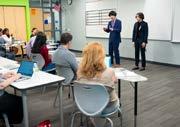
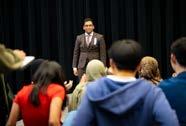
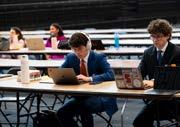
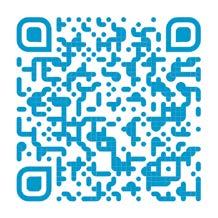
For more information, please visit the BIS web page at www.speechanddebate.org/bis or consult the newest version of the BIS Development and Implementation Guide
WHAT THE BIS IS NOT...
A punishment-focused process
A place to revisit past grievances unrelated to the current tournament
A space to silence participants
A tool to empower or disempower individuals based on political or social ideologies
A loophole around tournament rules or guidelines
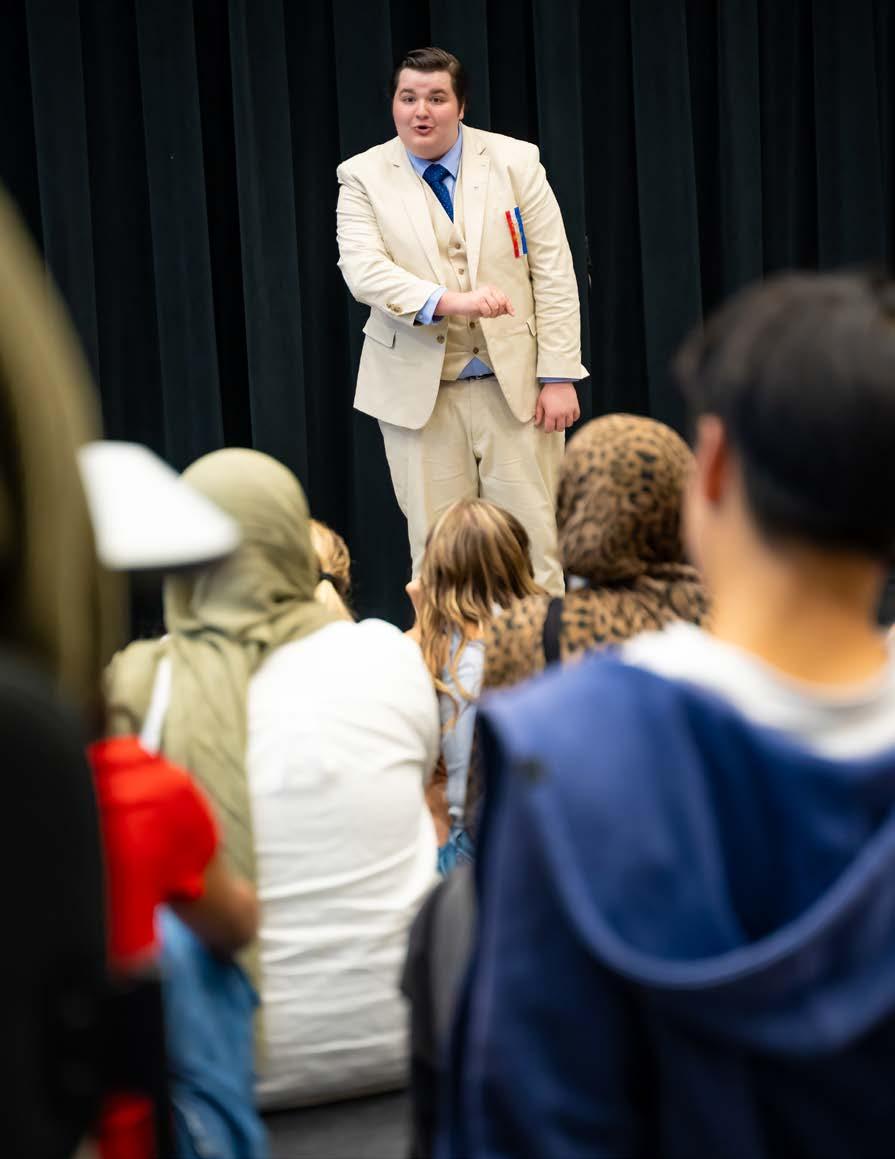
Dr. Paul Porter is the Director of Belonging and Inclusion at the NSDA.

Before we begin, let’s acknowledge that winning can be valuable. A “win” feels good; it can motivate and affirm effort. But when winning becomes the only goal, it can distort the purpose of speech and debate. Our challenge is not to reject ambition, but to reshape it into a healthy pursuit of excellence grounded in education and well-being. It is also important to acknowledge that the pressure to “win” exists at all levels of competition. From a scrimmage round or a one-day local tournament to a large national circuit
Chasing “Perfection”: R eclaiming the Educational Core of Speech and Debate
by Jesse Meyer (Iowa) and Kimberly Reiner (Ohio)
tournament or the NSDA qualifier, the drive will exist.
Speech and debate is meant to nurture critical thinking, research, communication, and community. Yet, for many students, the drive for perfection (undefeated records, straight 1s, trophies) has shifted from healthy motivation to maladaptive obsession, bringing real psychological and ethical costs. To protect the integrity of our programs, we must recognize the symptoms of destructive perfectionism and recenter the activity on learning and growth.
A ‘win’ feels good; it can motivate and affirm effort. But when winning becomes the only goal, it can distort the purpose of speech and debate.”
THE HIDDEN HARMS OF PERFECTIONISM
The pressure to always “win” can lead students to equate performance with self-worth. This maladaptive perfectionism, rooted in fear of failure and a need for external validation, drives chronic stress and anxiety. Many feel compelled to “read every word,” over-prepare, and treat small mistakes as disasters. The result is burnout, self-criticism, and the loss of joy in an activity once loved. It can even drive participants out of the activity for fear of feeling “not good enough.”
A single loss can feel like a personal failure rather than a learning opportunity. When students view results as judgments on who they are instead of what they
did, they become trapped in a cycle of exhaustion and disappointment. The obsession with flawless records replaces curiosity with fear.
HOLDING BOTH TRUTHS
It’s important to note that this mindset isn’t confined to any single level or community. From local middle school scrimmages to national bid tournaments, the pressure to “win” can quietly take root. And it’s not born from malice; most students, coaches, and parents are striving for excellence with the best intentions. There is still so much good in the speech and debate world: mentorship, lifelong friendships, and transformative learning.
But when systemic pressures elevate trophies over teaching, even the best intentions can be overshadowed by a toxic perfectionism that hurts the very students we hope to uplift.
WHEN PRESSURE CORRODES CHARACTER AND COMMUNITY
An unhealthy fixation on winning doesn’t just harm individuals; it undermines the values of the entire program. When perfection is the only acceptable outcome, ethics and empathy erode. Students may rationalize cheating, clipping evidence, or other dishonest practices as necessary for survival. Team culture can also suffer. Loss aversion breeds frustration with judges, resentment toward teammates, and condescension toward less competitive peers. The activity’s intrinsic value—critical thought, persuasive delivery, intellectual engagement— gets lost amid the race for trophies. Debates risk becoming formulaic performances rather than authentic discussions and opportunities for growth.
COACHING FOR GROWTH OVER GLORY
Our job as coaches is to nurture adaptive perfectionism—a healthy desire to improve—while guarding against harmful extremes. This begins with redefining success.
Reframe the Goal
Shift focus from outcomes to process. Tournaments aren’t final verdicts but opportunities for reflection and growth. Encourage questions like:
• “Did you do your best?”
• “Did you learn something?”
• “Did you have fun?” These “golden” questions guide students back to the original purpose of speech and debate: learning, curiosity, and community. By revisiting these core motivations, we help them celebrate effort, growth, and connection over trophies and rankings. Celebrate achievements beyond rankings: discovering strong evidence, mastering a new skill, mentoring teammates. Teach time management and emphasize rest to combat overpreparation. Help students see that personal bests matter more than perfect scores.
Learn to Love the “L”
Losses are powerful teachers. Normalize them. Introduce a 24hour rule: after one day, the result is final, and attention returns to preparation and balance. Use post-round debriefs to analyze, not ruminate. Frame judge feedback as a blueprint for growth, not criticism. Remind students that a ballot is not a reflection of their worth. It’s a snapshot of one performance—a tool for getting better, not a verdict on their potential.
CONCLUSION: RECLAIMING THE CORE
By shifting our focus from perfect records to enduring growth, we protect students’ mental health and preserve the educational heart of forensics. The ultimate goal isn’t an unbroken streak but the development of resilient, ethical, and reflective thinkers. When students learn to embrace imperfection with curiosity, compassion, and courage, they gain something far more valuable than trophies: the confidence to learn, adapt, and lead.
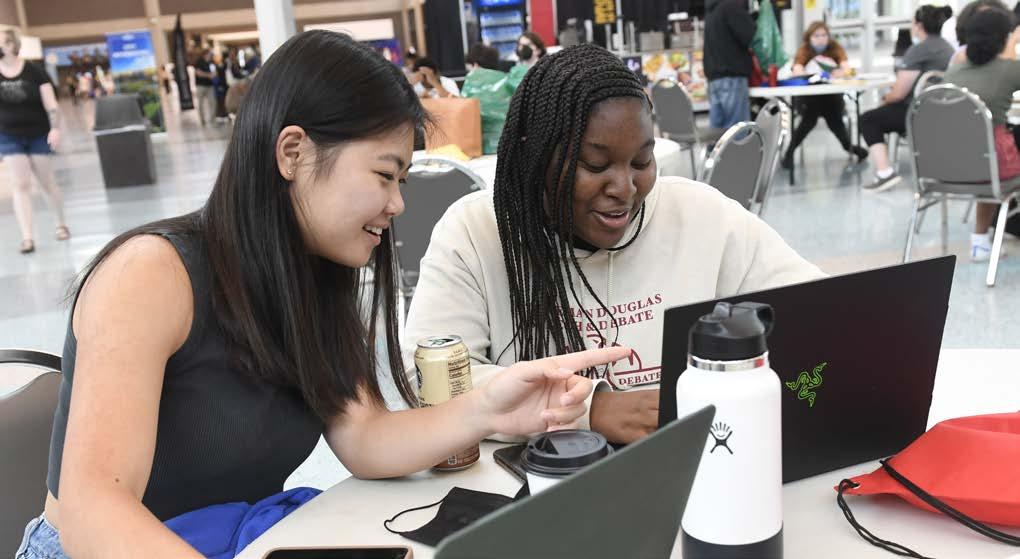
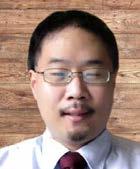
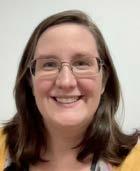
and inclusive for all
Jesse and Kim serve as co-chairs of the NSDA Access and Ability Alliance. They both enjoy mentoring new coaches and judges or providing guidance for tournament directors in disability accommodations. They can be contacted by emailing the NSDA at coachesnetwork@speechanddebate.org.
Jesse Meyer is a Tabroom Manager for the New York City Urban Debate League and an active contributor to the Iowa debate circuit.
Kimberly Reiner is an Ohio teacher and licensed social worker who coaches speech and debate. She is passionate about hosting tournaments that are accessible
students.
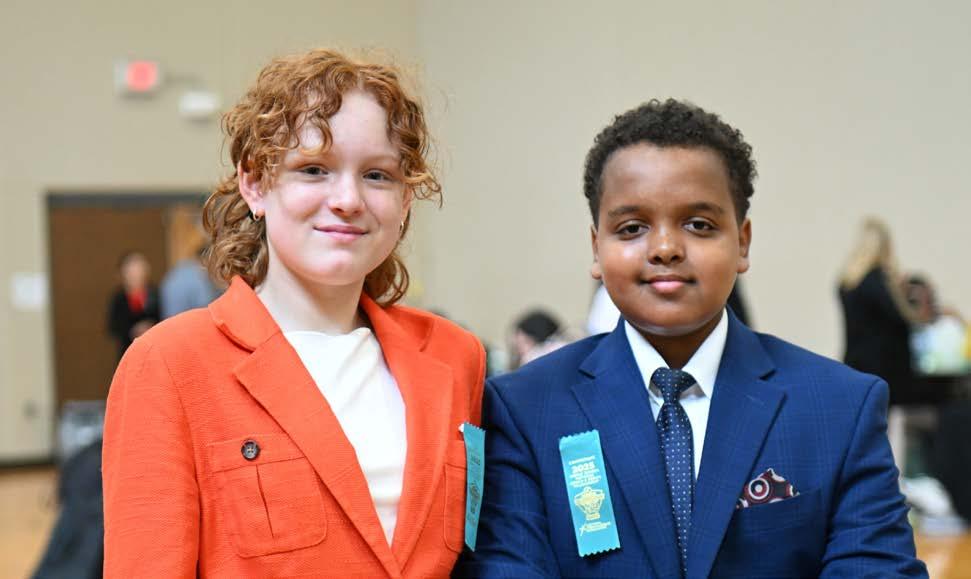
Middle school is uniquely hard. Students are learning to navigate changing classes and teachers, often for the first time. They are sorting through questions of personal identity and figuring out how to build (or rebuild) friendships. They are discovering their voice—sometimes quietly, sometimes loudly, and sometimes by testing boundaries. And, of course, all of this happens under the added weight of shifting hormones and rapid emotional development. Children’s author John David Anderson often shares, “In middle school, words aren’t just words. They can be weapons or they can be gifts.”
Thankfully, participation in speech and debate can be an antidote to these challenges. It provides a safe space for students to explore who they are, learn how to use their voices, and connect with peers in a positive and purposeful way.
In a recent interview with EdWeek, middle school principal Dustin Bindrieff puts it well: “Students who feel a part of a group tend to work harder, care more, and invest in the cohesion and success of the group, which can bring out the best in the individual, as well as the team.”
Speech and debate teams embody this dynamic. They provide both belonging and accountability—two essential ingredients for middle school success.
Ramblewood Middle School (FL) coach Paul Paradis shares, “Adolescents often feel as though they will be young forever. Through this activity, however, they confront real-life issues, learn to value dissent, and see how a single idea can branch into countless directions. Unlike a typical student who simply learns to write a thesis, a debater
Middle School Is Hard; Speech and Debate Makes It Easier
by Megan West
learns to wrestle with the complexity of ideas, the conclusions of others, and the responsibility of forming their own.”
When I served on the Reimagining Middle Grades Committee for Broward County Public Schools in Florida, speech and debate was central to our vision. We thought about the specific needs of students at different points in their middle school journey.
For sixth graders, just beginning their middle school careers, we wanted a soft, welcoming place to land. Speech and debate offers exactly that—a space where they can try new things, express opinions, and be heard without judgment. For
eighth graders, on the cusp of high school, we wanted to sharpen skills that would carry them forward: literacy, self-confidence, and even executive functioning skills like notetaking and organizing arguments. Speech and debate provides structured opportunities to practice all of these in real time.
Much of the research on middle school success emphasizes the importance of socialemotional learning (SEL). Speech and debate coaches can leverage its principles to strengthen their teams and support their students. Here are a few ways to translate SEL into your debate practices.
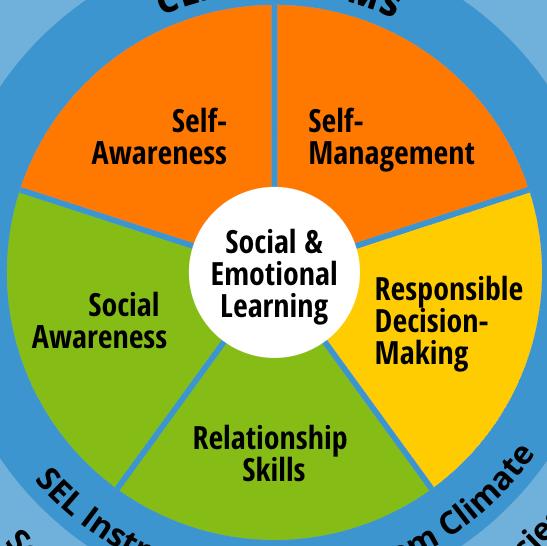
Self-Awareness: Finding Their Voice
From Lincoln-Douglas to Dramatic Interp, students reflect on what they believe, how they express it, and how others perceive them. Coaches can help students identify strengths in their speaking style, word choice, and judge adaptation, reinforcing the idea that their voice matters.
Do you have students who need to find their voice? Have them try Original Spoken Word Poetry and put those thoughts on paper, then out into the world.
Self-Management: Channeling Emotions into Arguments
Middle schoolers often feel emotions intensely. Speech and debate provides a constructive outlet, teaching students to manage nerves, stay calm under pressure, and present arguments clearly, even when adrenaline is high.
Do you have students who are extra nervous before a competition? Try to mimic a competitive setting during practice by asking another teacher or volunteer if they will be a “guest judge” after school.
Social Awareness: Listening and Empathy
Good speakers and debaters learn to listen carefully to opponents, not just to respond but to understand. This builds empathy and perspectivetaking, which are essential skills in adolescence.
Do you have students who like to talk more than listen? Try having them be a silent partner in a Public Forum round. They are only allowed to flow and help during prep while the other partner delivers all of the speeches (then, they switch).
Relationship Skills: Building a Team
Speech and debate teams are natural communities. Students learn to give and receive feedback, collaborate on case prep or cuttings, and celebrate each other’s successes.
For many, this is the first “team” where they truly feel they belong.
Do you have a team that needs some extra team-bonding? Put down the binders and laptops one afternoon and do a service project instead. Bonus points if it is connected to the topic one of your students is currently researching.
Responsible Decision-Making: Choosing Words with Care
Anderson’s reminder that words can be weapons or gifts comes alive in debate. Coaches can guide students to make ethical choices in how they argue for or against sensitive topics, reinforcing respect and responsibility.
Do you have students who could improve their decisionmaking in round? Use post-round reflections not just to analyze performance, but to ask, “What did you learn about yourself today?”
Conclusion
Middle schoolers are in the process of becoming. Every practice, every round, every team meeting helps shape not just the speaker, debater, or performer, but the person. Debate can teach a 12-year-old to manage stress, a 13-yearold to build friendships,
and a 14-year-old to see themselves as capable of taking on the challenges of high school and beyond.
Mr. Paradis also shares, “I teach my students to keep their minds open and active. They think deeply about their futures, draw inspiration from great figures in history, and find value in timeless lessons. This cultivates both maturity and freedom— the freedom to share bold ideas and to dream at an age when many of their peers lack that confidence.”
The middle school years will always be hard. But as coaches, you have a unique opportunity to make them easier—and more meaningful—by giving your students the tools of speech and debate.
After all, when students learn to wield their words as gifts rather than weapons, they gain something more valuable than trophies: they gain confidence, resilience, and a voice that will carry them forward.
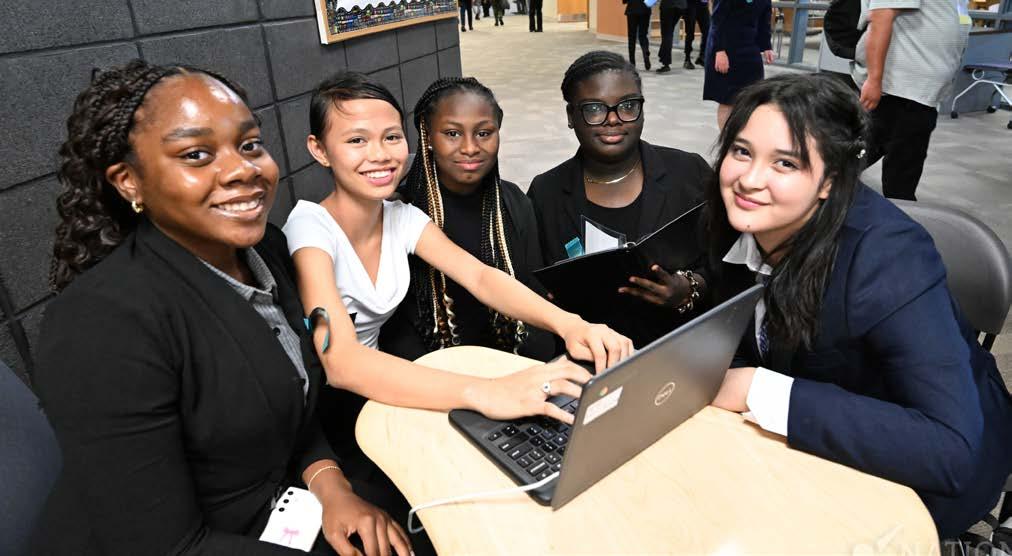
Megan West serves as Campaign Director at the NSDA.
PICTURE THIS!
M aking Impactful Visual Aids in Informative Speaking
by Travis Rother
Coaches of Informative Speaking know it’s the one event that lets students bring their ideas to life, in a literal sense. Visual aids (VAs) make the abstract tangible. They grab attention, clarify complex concepts, and give a speech its “wow” factor. Great visual aids do more than decorate; they are purposeful, relevant, and designed to engage the audience at exactly the right moment.
Unlike any other speech event, Informative Speaking is defined by its visuals. Interpretation events bring characters to life through performance, and platform events persuade through logic and passion. Only Informative lets speakers show you what they mean. That distinction is both a gift and a responsibility. When done well, visual aids don’t just support the speech, they become part of the storytelling.
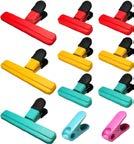
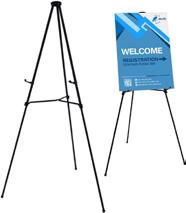

The Rules: Written and Unwritten
Let’s start with the written ones. The NSDA Unified Manual is clear: visual aids may not break any laws, include live animals or humans, or rely on electricity in any way. That means no lights, no sound effects, no videos. Students are also not allowed to pass anything out to the audience.
But as every coach knows, the unwritten rules matter just as much. Over time, certain norms have become the quiet commandments of effective Informative VA design. These unwritten expectations separate a novice display from a polished, professional-level Informative speech.
Visual aids should do something. Static boards can work, but audiences (and judges) respond best to visuals that move, flip,
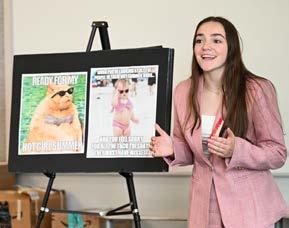

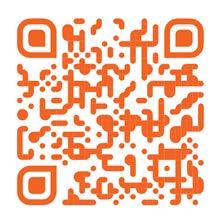
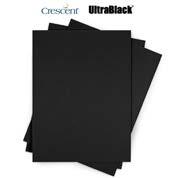
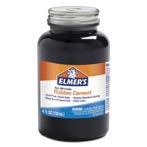
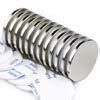

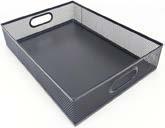

Check out a recording of the Coach Academy Online Workshop and download the Visual Aids Supply List at www.speechanddebate.org/coachacademy-visual-aids .
reveal, or transform. There is nothing better than the magic of a picture changing in a way you didn’t know it could or a graph that grows to show the scale of a problem. Not every VA needs to be manipulated, but students should not forget about this important tool in presentation.
Don’t stand in front of them. If a student blocks their visuals, they stop being “aids” and become scenery. If the speaker isn’t talking about the visual, they should put it away so their audience isn’t distracted by it.
Size and readability matter. Words should be legible from anywhere in the
room: test them from the back row. If the visual has words that aren’t needed, cut them from the picture. If a judge sees words, they are likely expecting that they should read them. In the same way, students do not need to title their boards. Let the visuals speak for themselves.
Presentation counts. Glue straight. Align carefully. Make sure colors don’t clash or distract. A crooked image signals a lack of care before the speaker ever says a word.
Add surprise. The best visuals have an element of a reveal—something hidden until the right moment. Too much clutter ruins that sense of discovery.
Travis’ Tips and Tricks for Building Better Visual Aids
After years of trial, error, and creative problemsolving, I’ve learned that the details make the difference. Here are some practical lessons that help turn a good board into a great one.
Magnets are your best friend. Strong magnets can make transitions seamless. I have never found strong enough magnets in a big box store; consider searching for high powered magnets online. A money-saving hack: cut small squares of sheet metal with tin snips and tape them to the back of your board. The magnet will cling beautifully without doubling the magnet count or adding bulk. One sheet of metal and a tin snips can be used for 10 years or more.
Choose materials wisely. Foam core may be popular, but it bends, warps, and shows wear quickly. I’ve had better luck with solid matboard (the same material framers use for photographs). It’s thinner, surprisingly sturdy, and the boards can be used repeatedly for about the same price.
Hide any secrets. Use the VA stand creatively. Behind it, the student can conceal every upcoming visual element, ready to be revealed when the timing is right. We’ve used magnets, chip clips, store-bought trays, and even customcut foam core trays to keep everything organized and invisible. From the audience’s perspective, it should feel like magic.
Prototype before you print. Large-scale printing is expensive, so mock up every visual before committing to the final version. My students often made four or five paper-sized versions before the real build. That experimentation lets the student play with layout, sequence, and functionality without wasting money on reprints.
Think about the sound. If the student manipulates a visual, have them consider what noise it makes. Does the rip of Velcro enhance or distract from the moment? Sometimes the soft click of a magnet is far more satisfying and professional. Ultimately, making good visuals is part craftsmanship, part stagecraft. Students are building props that move, hold up under travel, and communicate instantly. Every flip, click, or reveal should feel intentional.
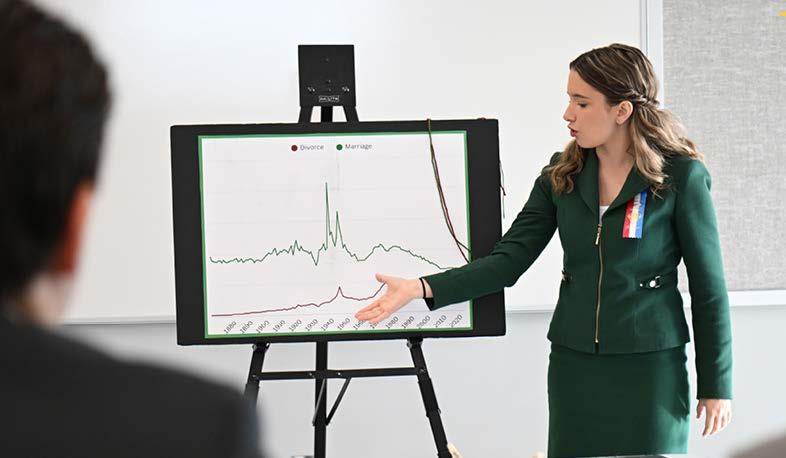
Traveling with Visual Aids
Transporting visual aids is its own adventure. Teams handle it differently, but a few guidelines can save students heartbreak (and money).
Carry-on versus shipping: Most teams have better luck checking VAs with airlines. Some teams ship their boards, but the potential for damage or delay is high. Checking the boards as luggage works well if they are packed tightly in a box and every edge is protected.
Packing materials: Sturdy boxes are a must. Fill the gaps so nothing shifts: bubble wrap works great, but students can also use recycled paper, fabric scraps, and, yes, once even thick adult medical pads. Whatever cushions best! Label the box “Fragile.” If packed right, VAs can take a beating.
Stands: Always carry stands on the plane. They fit easily in an overhead bin or under the seat, and this saves students from worrying about damage or delays. Checking visual aids doesn’t require any
special handling fees, just a standard checked-bag cost. The goal is to arrive at the tournament confident that their materials will work exactly as they did at home.
Bringing It All Together
Informative Speaking is about teaching, but it’s also about performance. The best visual aids balance both: they inform while they entertain. They help the audience see, feel, and remember your message. A well-timed reveal, a clever transformation, or a single crisp image can make a 10-minute speech unforgettable. Ultimately, every board, magnet, and hidden tray is part of a larger illusion—the illusion that this learning moment is effortless. The truth, of course, is that it’s the product of hours of thoughtful design, careful planning, and a little bit of crafting magic.
A great visual aid doesn’t just show—it wows.
Travis Rother serves as Membership Coordinator at the NSDA.
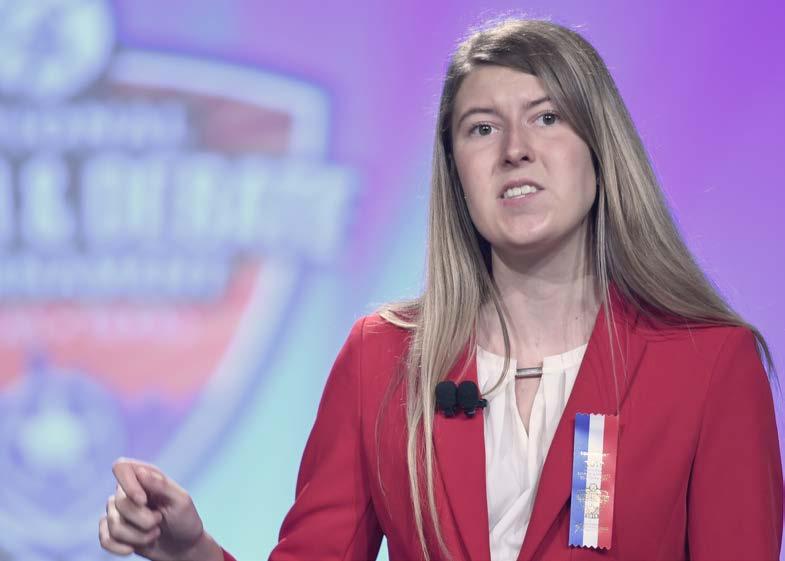
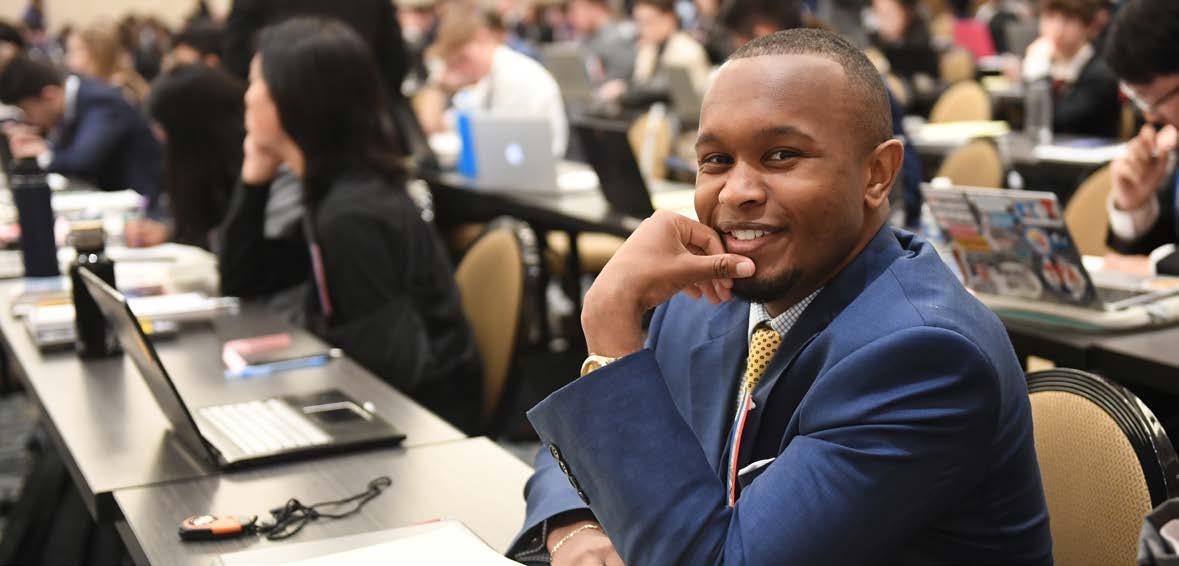
TOPIC:
Logic and Clarity
Essential Question + Objectives
How can I simplify a complex argument to ensure it is clear to my audience?
1. Students will be able to break information into a series of small, logical steps.
2. Students will be able to use examples and specificity to help an audience understand complex arguments.
3. Students will be able to increase audience understanding by using prior audience knowledge to build a bridge between their topic and something the audience is already familiar with.
4. Students will be able to orally present complex arguments in simplified language with clarity.
START HERE : TEACHING EXTEMPORANEOUS SPEAKING
In the new lesson plan collection Start Here: Teaching Extemporaneous Speaking , students will learn to research, outline, and deliver an original speech from memory with limited preparation.
Have you ever wished you had a road map to help you teach a new event? The National Speech & Debate Association has consulted expert coaches to create the “Start Here” series to act as your guide while navigating a new event. These easy to follow lesson plans are backed up with ready-to-use resources and materials.
These nine lessons take students through the basics of the event using a mix of sample videos, lectures, activities, and practice time. Use the lessons in full or borrow pieces to supplement your instruction. The collection is free with your NSDA membership!
LET’S GET STARTED!
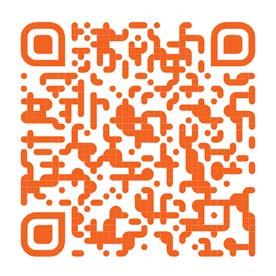
A resource created by the National Speech & Debate Association
Check out Lesson 5 on the following pages, and find the complete series online at www.speechanddebate.org/ start-here-teaching-extemporaneousspeaking .
MATERIALS/RESOURCES:
DIGITAL RESOURCES:
• Logic and Clarity Google Slides (lesson content)
LESSON PLAN AND TEACHING GUIDE
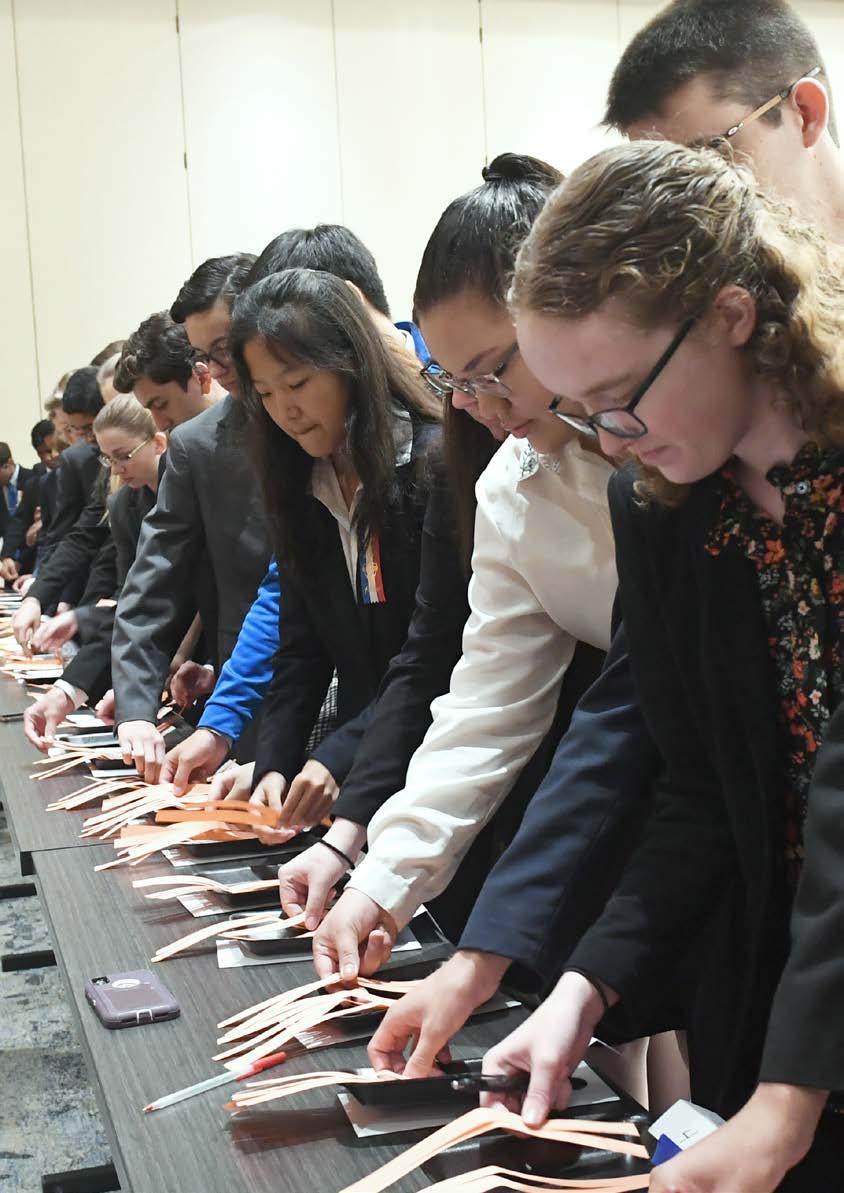
ONE-DAY LESSON
HOOK
LESSON
5: LOGIC AND CLARITY
Insight:
Breaking down complex concepts into simpler, more accessible terms is a crucial skill for effective communication. When delivering a speech, it’s important to consider the audience’s level of understanding and tailor the content accordingly. By simplifying their arguments, students can engage their audience better, making their points more memorable and effective. This, in turn, can increase the likelihood of receiving a higher rank from judges, as they will appreciate the clarity and coherence of the presentation. Students should use clear examples and analogies to illustrate their points and ensure that their arguments are logically structured and easy to follow.
Begin a class discussion on a difficult concept, like cryptocurrency or income taxes. Allow students to attempt to explain these concepts to other students (or the instructor)
As they are explaining, ask them to rephrase what they just said to make it even more clear/simple. Students may become frustrated or may find the simplifying very easy. Ask them why they think it is (or isn’t) difficult to simplify difficult concepts?
BODY
Use the Logic and Clarity Google Slides to cover the following: 10 minutes 25 minutes
• Breaking down the information to make it accessible to the audience
• Paltzik’s analysis video
• Providing clarity and context
• Directness when speaking
• Connecting with your audience
• Accessing prior knowledge
• Using imagery
INDEPENDENT PRACTICE/HOMEWORK
Have students practice crafting their arguments while simplifying their language for clarity, then guide them to add a concrete example or vivid illustration to enhance audience understanding and engagement.
• Sample complex questions are listed on the next page. If they are too complex for your students to answer by accessing prior knowledge, consider providing them time to research.
• Alternatively, if needed, have students do this assignment in small groups or have students create questions for their peers to choose from. The goal is to have students experience ‘simplifying’ information for an audience.
• If needed, this practice can be completed as homework or in the classroom setting on the next day.
Drafting the Argument
• Have students write out their argument in full, ensuring that it presents a clear position and logical reasoning.
• Encourage them to focus on structure, making sure their main point is welldefined and supported by key ideas.
Revising for Simplicity and Clarity
• Students should revise their argument to remove unnecessary complexity, jargon, or overly technical language.
30+ minutes (could extend into next class period)
• They should aim to make their argument as clear and direct as possible while maintaining accuracy and depth.
• Encourage peer review or self-assessment, asking: Would someone unfamiliar with this topic understand my argument?
Enhancing with Examples and Illustrations
• Once the argument is as clear as possible, students should add a concrete example, analogy, or vivid imagery to help illustrate their point.
• The goal is to create a mental picture that makes the argument more relatable and memorable for the audience.
• Encourage students to consider their audience—what kinds of examples will resonate most?
Final Review and Presentation
• Students should read their argument aloud or present it to a partner to ensure it flows naturally and is easy to follow.
• They can make final adjustments based on feedback to improve clarity and engagement.
• Once students have simplified their argument, encourage them to write a reflection on why simplifying the language made their argument clearer. What steps were the hardest?
SAMPLE COMPLEX QUESTIONS
Why does training AI models consume so much energy?
» Encourages students to break down factors like computational power, data center operations, and potential solutions for reducing AI’s carbon footprint.
Why do wages sometimes stay stagnant even when unemployment is low?
» Encourages discussion of labor market dynamics, productivity, inflation, and corporate profit strategies.
Why do oil prices fluctuate so much even when supply remains stable?
START HERE: TEACHING EXTEMPORANEOUS
SPEAKING
» Requires an explanation of geopolitical factors, market speculation, and supply chain disruptions.
Why do some countries experience economic growth without reducing poverty?
» Calls for an analysis of income inequality, wealth distribution, and policy decisions.
Why do interest rate hikes take so long to affect inflation?
» Forces students to break down monetary policy, consumer behavior, and lagging economic effects.
CLOSURE
Why isn’t lower inflation making prices lower?
Explanation #2
Explanation #1
Inflation is a general and ongoing rise in the level of prices in an entire economy. Inflation does not refer to a change in relative prices. A relative price change occurs when you see that the price of tuition has risen, but the price of laptops has fallen. Inflation, on the other hand, means that there is pressure for prices to rise in most markets in the economy. In addition, price increases in the supply-anddemand model were one-time events, representing a shift from a previous equilibrium to a new one. Inflation implies an ongoing rise in prices. If inflation happened for one year and then stopped, then it would not be inflation anymore.
Inflation means increasing overall prices. Simply put, falling inflation, or "disinflation," means prices are rising more slowly than they had been. That's a good thing. Grocery prices have climbed less than 2% in the last 12 months, compared to a 12% jump the previous year, which gave many people sticker shock at the supermarket. Prices are still higher than they were pre-pandemic because to get them back down to that level, deflation would have to happen, meaning prices would actually fall.
5 minutes
Using slide 10, have students discuss the specific techniques that make complex explanations more accessible.
Simplifying Simplifying
Simplifying Simplifying
● Eliminating unnecessary or distracting phrases – filler words
● Communicating big picture ideas
● Eliminating unnecessary or distracting phrases – filler words
● Avoiding technical jargon
● Communicating big picture ideas
● Giving concrete examples
● Avoiding technical jargon
● Making it relevant to your audience
● Giving concrete examples
● Ensuring pronouns in your speech have clear references
● Making it relevant to your audience
● Ensuring pronouns in your speech have clear references


by Shunta Jordan -
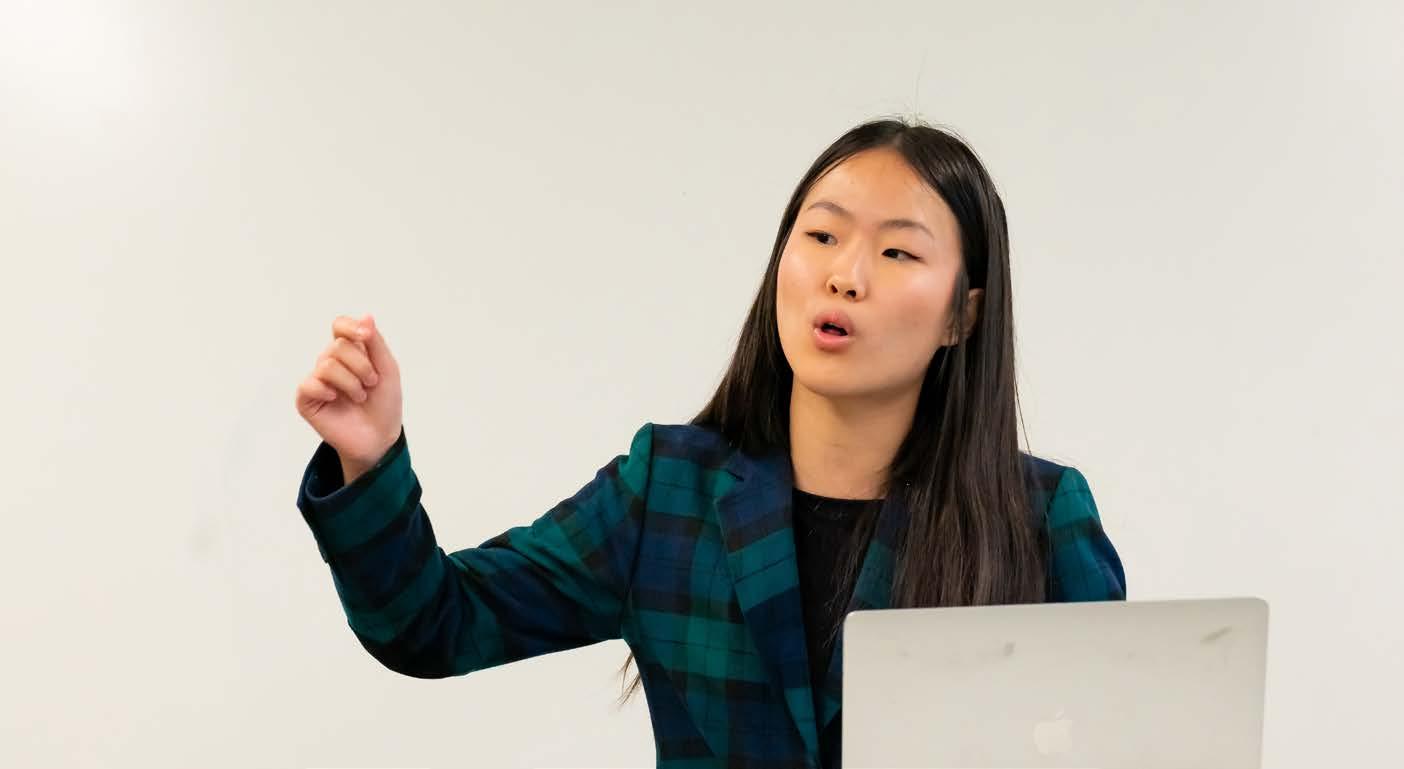

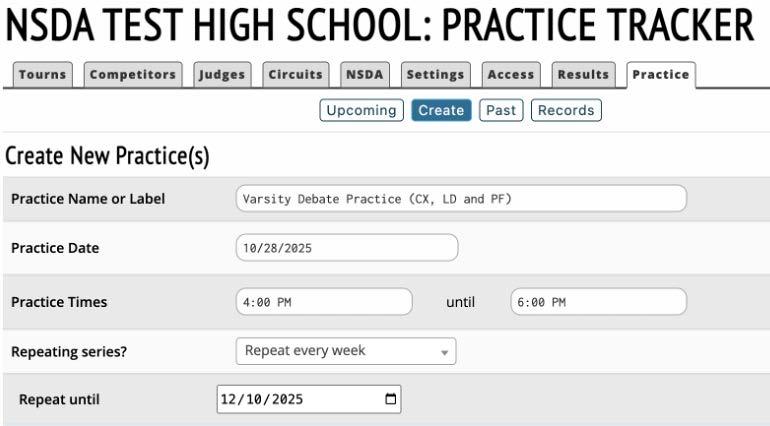
As a coach, there may be times when you want to keep an organized record of attendance during your team practices. Now Tabroom.com offers you the ability to do just that.
To begin using this feature, select the Practice tab in your school’s Tabroom.com account (figure 1).
Once in this tab, choose Create from the four options at the top (figure 2). Then, complete a few steps to get things started. First, enter the name of the practice (e.g., Varsity Debate Practice). Next, choose the first date you would like to begin tracking attendance. Then, select the start and end times for the practice. The final step is deciding if the practice will be recurring and, if so, how frequently. After completing all steps, select Save Practice at the bottom.
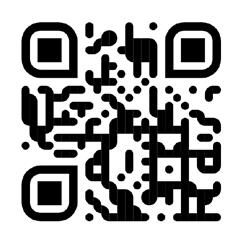
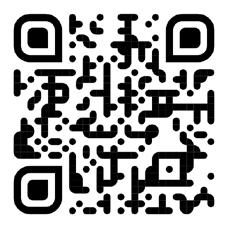
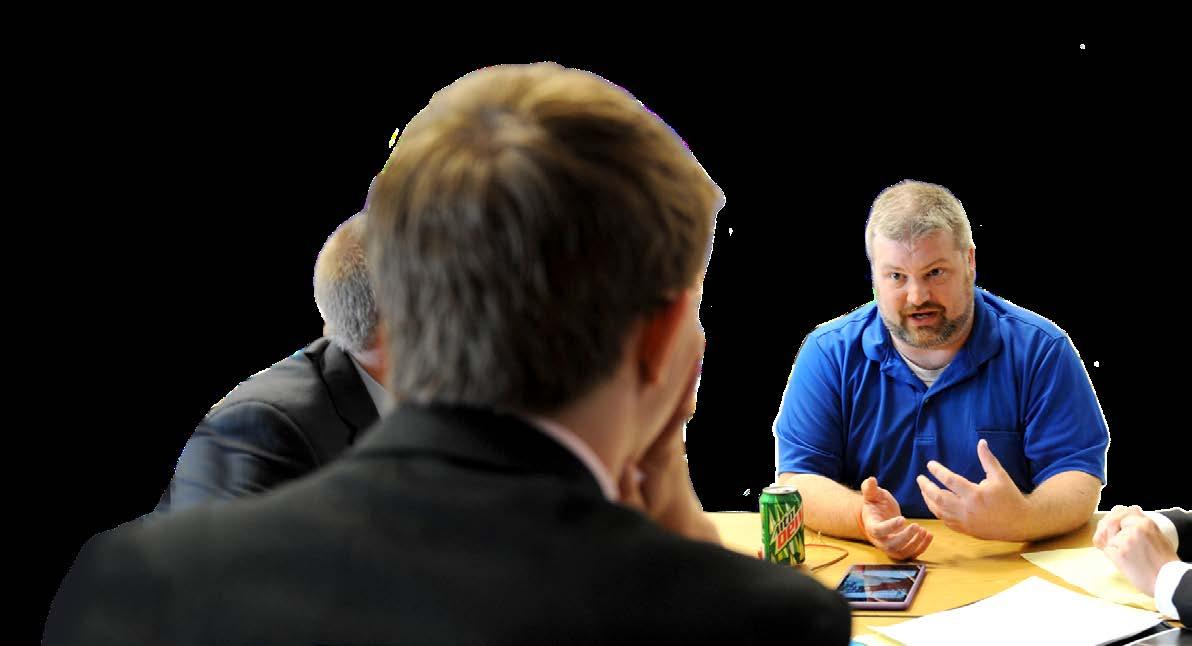
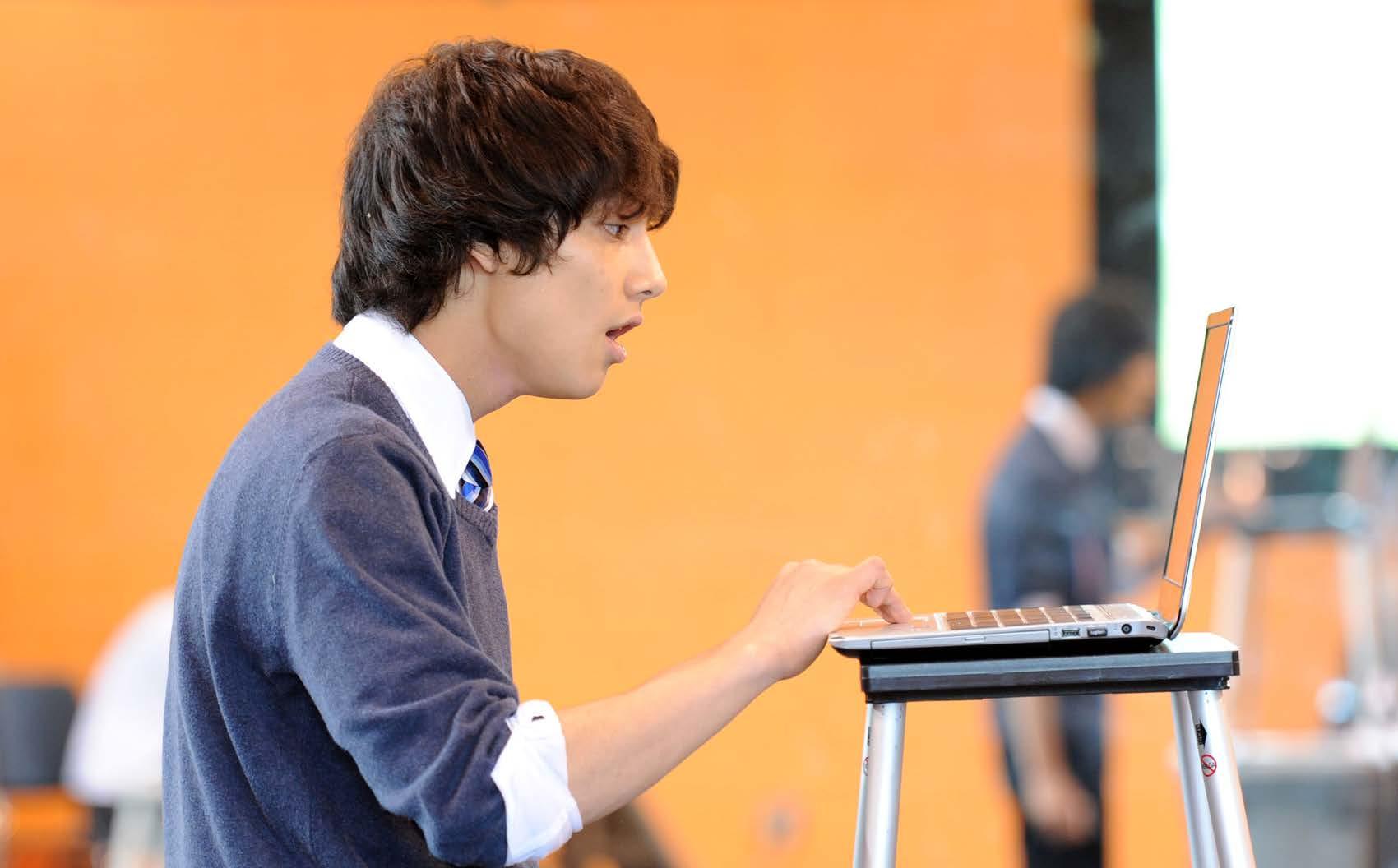


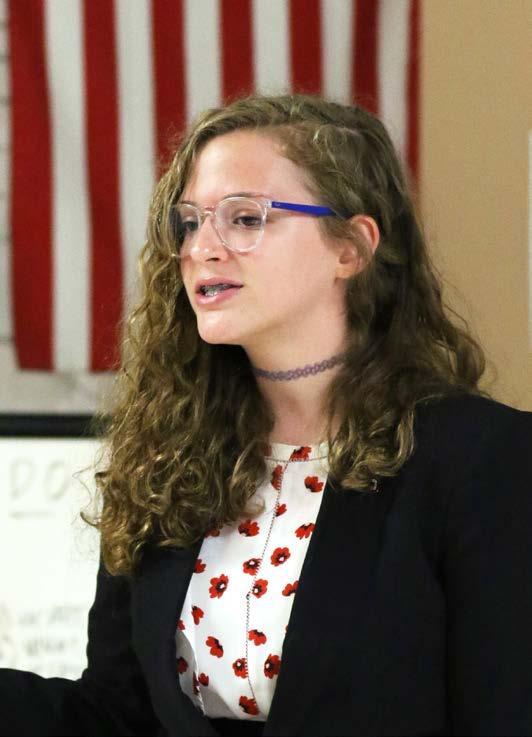
You can then go to the Upcoming button to see all scheduled practices (figure 3) Next to each practice, select the blue box under the Here column (figure 4). This allows you to toggle on the students who attended that particular practice. The system also keeps a running log of which and how many practices students have attended. This can be found by selecting the Records button. We hope you find this attendance feature useful for your squad. Let the tracking begin!
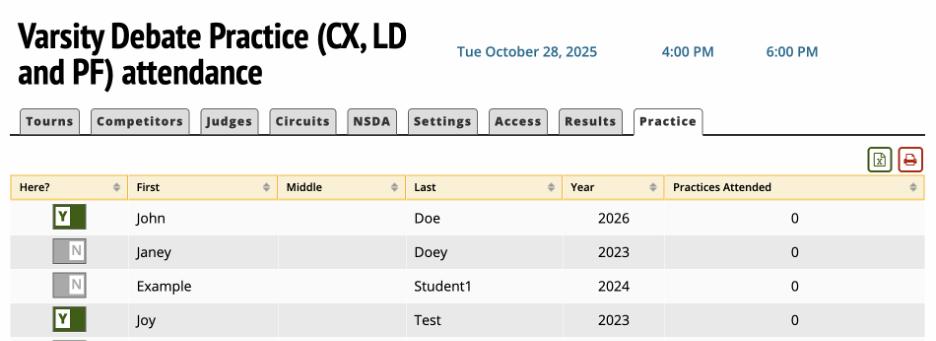


figure 3
Shunta Jordan serves as Tournament Services Manager at the NSDA. -
figure 4
SERVICE POINTS: A PRIMER
This guide explains how students and coaches can earn service points through the National Speech & Debate Association. The NSDA Honor Society recognizes middle school and high school students for participation in speech and debate activities. Member students are held to the six tenets of the Code of Honor, one of which is service.
NSDA CODE OF HONOR (excerpt)
SERVICE: A member exercises their talents to provide service to peers, community, and the activity. At all times a member is prepared to work constructively to improve the lives of others.
Students earn distinction through speech and debate competition, as well as community service, public speaking, and leadership activities. There are specific rules regarding service points, which are available starting on page 10 of the High School Unified Manual and apply to both high school and middle school students. Many coaches and students have questions about earning service points. Some of the most frequently asked questions are answered below.
How do service points work?
If an advisor or coach with designated permissions deems an activity as eligible for service points, they may enter them as they would points for competition. Each approximate hour of activity should be treated as two points. Students can earn up to 20 service points per day. Points are entered in increments of one and fall under two categories, speaking (for an audience of five or more adults) and non-speaking.
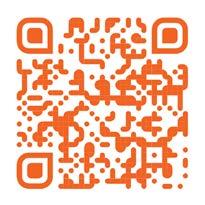
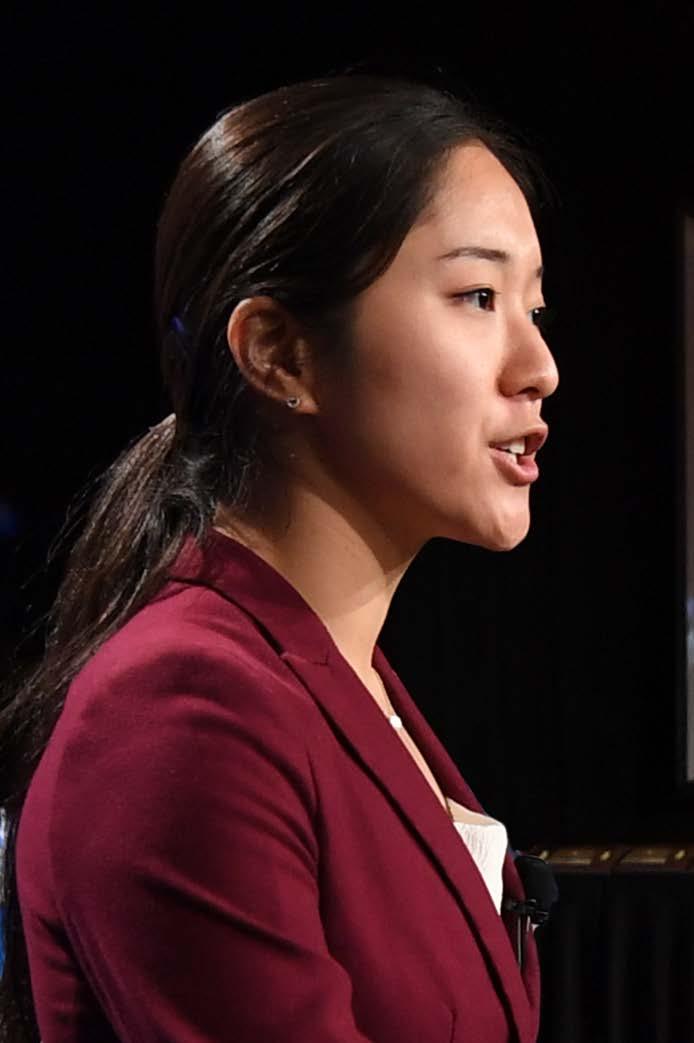
HIGH SCHOOL UNIFIED MANUAL www.speechanddebate.org/ high-school-unified-manual
How many service points can a student earn in a year?
Students may record up to 200 service points per year. Service activities can be recorded retroactively for the current and immediate past school years only.
How does a coach enter service points for students on their roster?
Service points are entered using the same online system as merit points. Instead of selecting the debate or speech event, coaches should select Service, then enter a description of the service, add the number of points earned, select a coach, and then select what type of service has been done. When all fields have been entered, select Finish.

would look like once entered into the online system.
FOUR
STRATEGIC DIRECTION
2. Judging a round of middle school competition
3. Performing a speaking role in a play or musical
4. Participating in reader’s theatre, one-act, or a choral reading group
5. Giving a speech at a political rally
6. Volunteering at a homeless shelter
7. Doing a demo debate for new students on the team
Speech and debate taught me about leadership, teamwork, humility, and empathy.
8. Recording an episode for a podcast
Quinlan Cao NSDA Alum
What about coaches? Can coaches earn service points?
Yes! The National Speech & Debate Association recognizes the service of coaches with the Don Crabtree Distinguished Service Award. This award is earned by coaches who perform service for the NSDA, such as hosting tournaments, serving on District Committees, volunteering at the National Tournament, or doing a variety of other eligible activities. Those who earn 20 citations are given a special gold key. Those who receive 50 citations are presented with a bronze plaque.
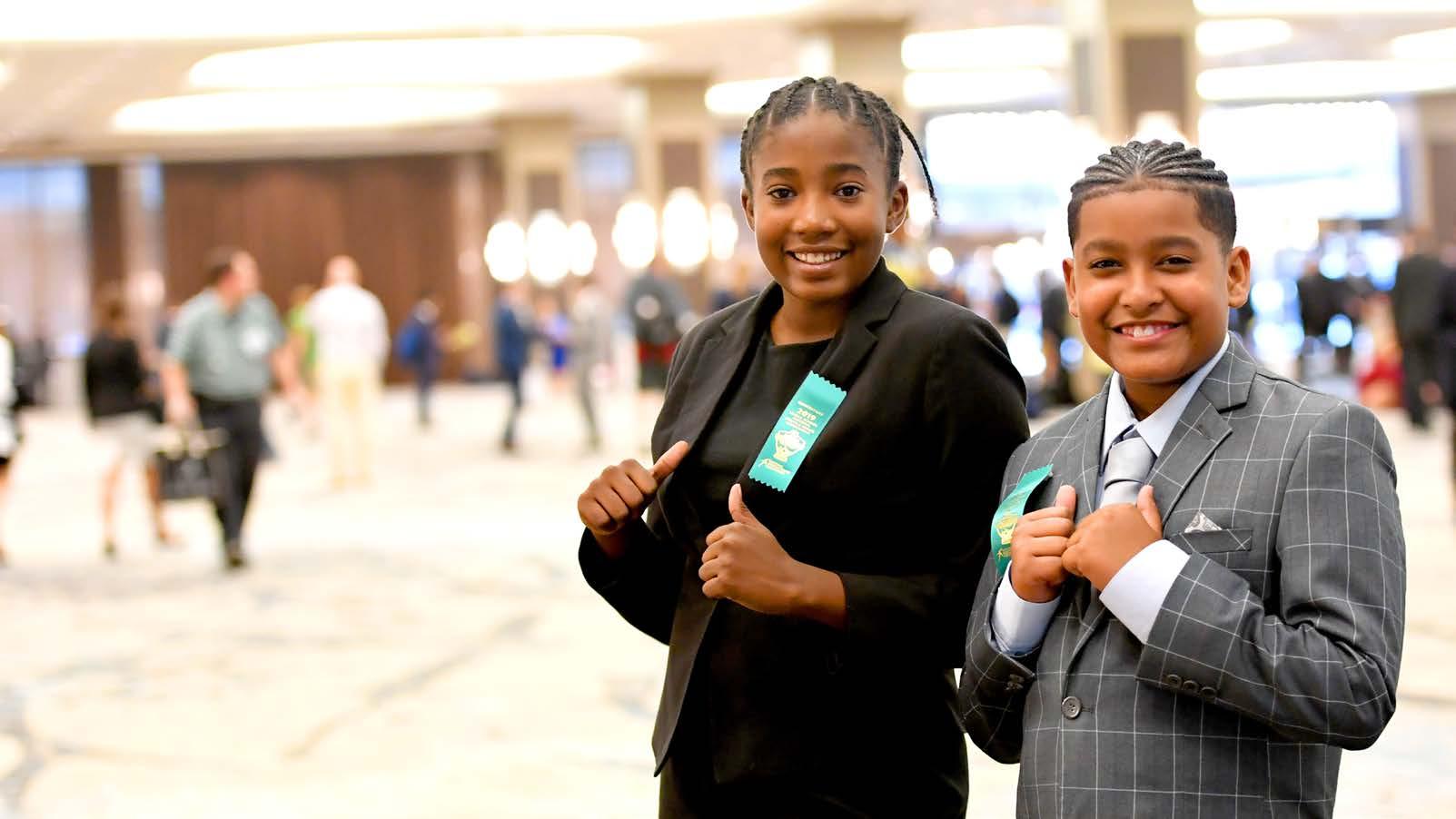
The process is digital, and all citations can be recorded through a coach’s online NSDA account! Visit our website at www.speechanddebate.org/coach-recognition to learn more.
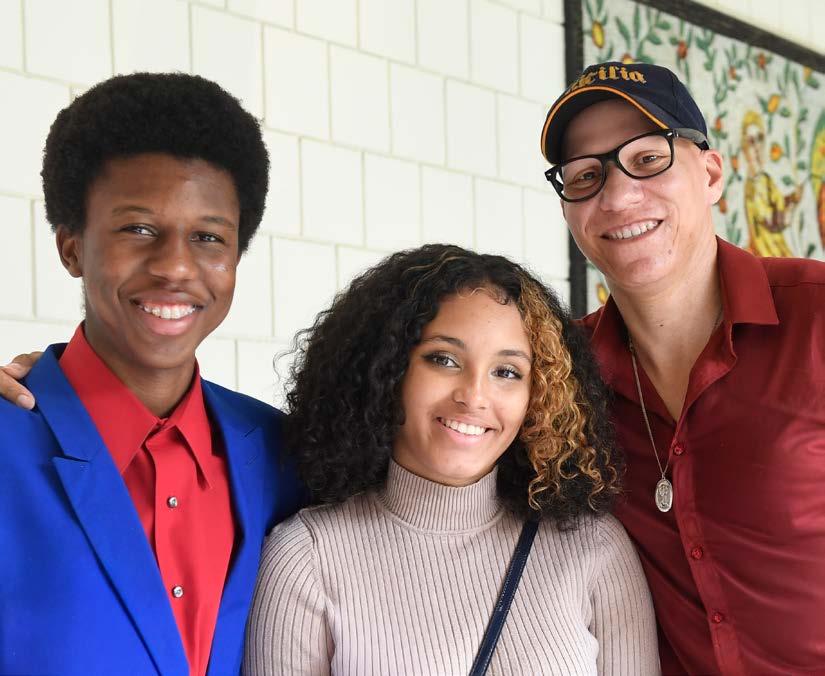
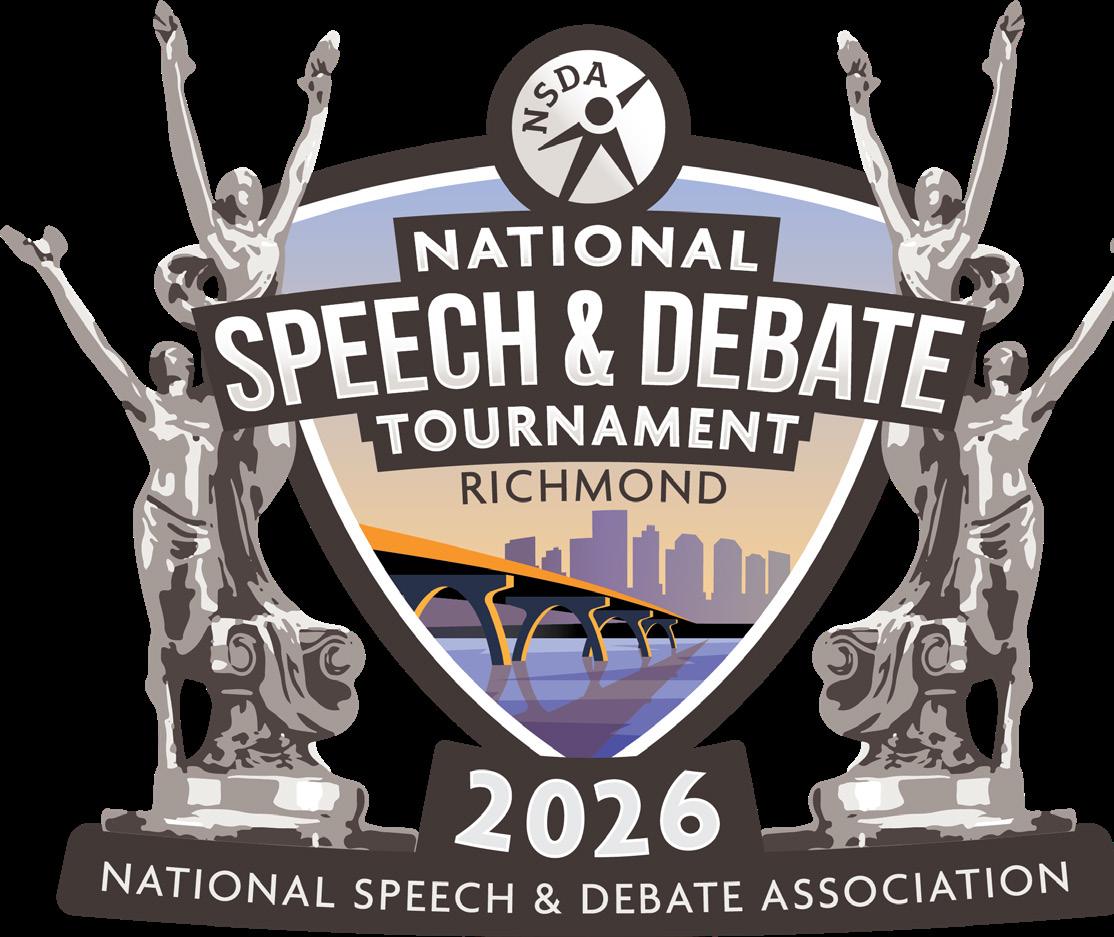

The NSDA Last-Chance Qualifier is an opportunity for students who did not qualify through their district tournament to have a chance to attend the 2026 National Tournament in their main event.
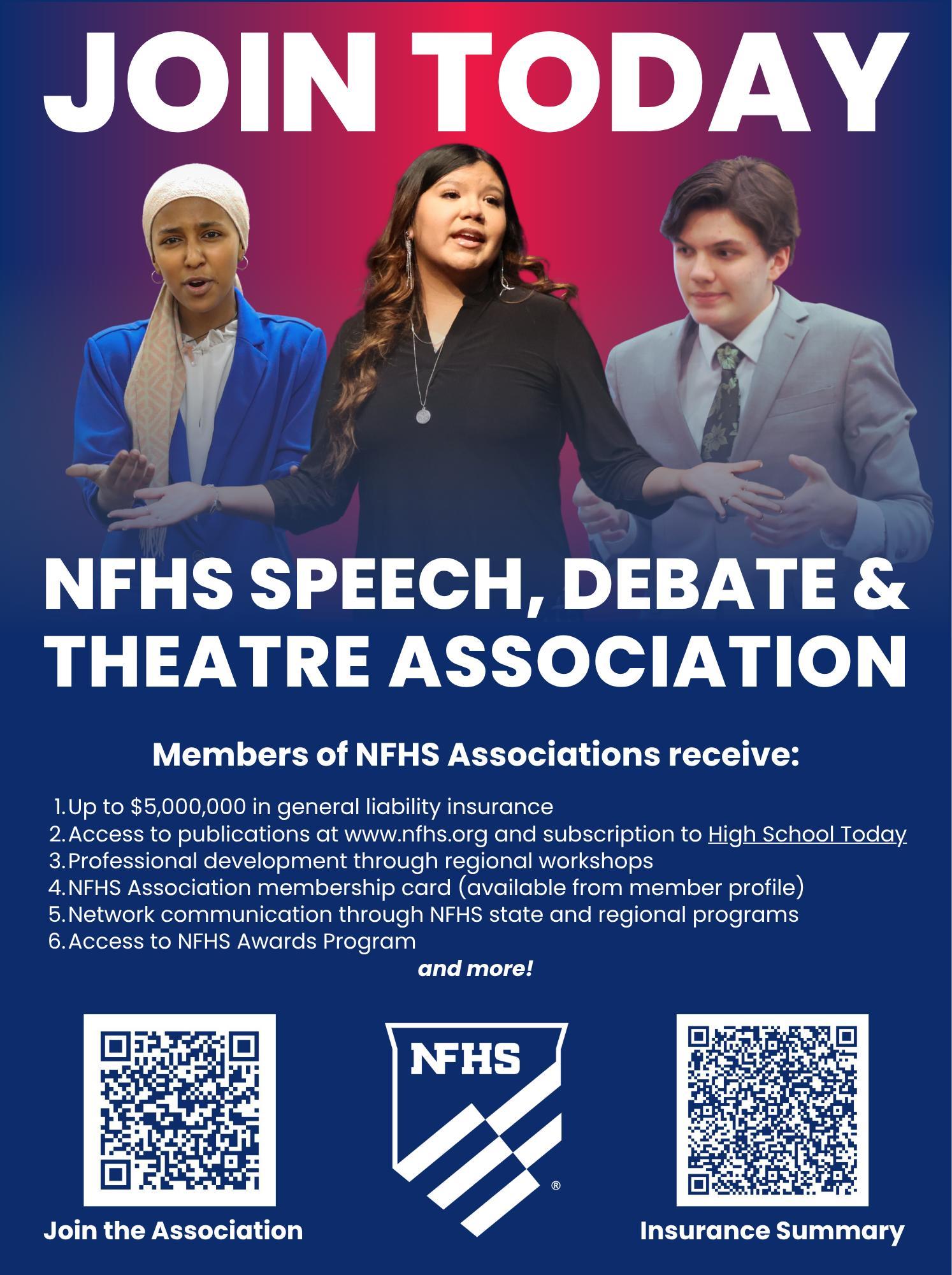
Leadership A LIFE OF Service AND
by Walker Desing
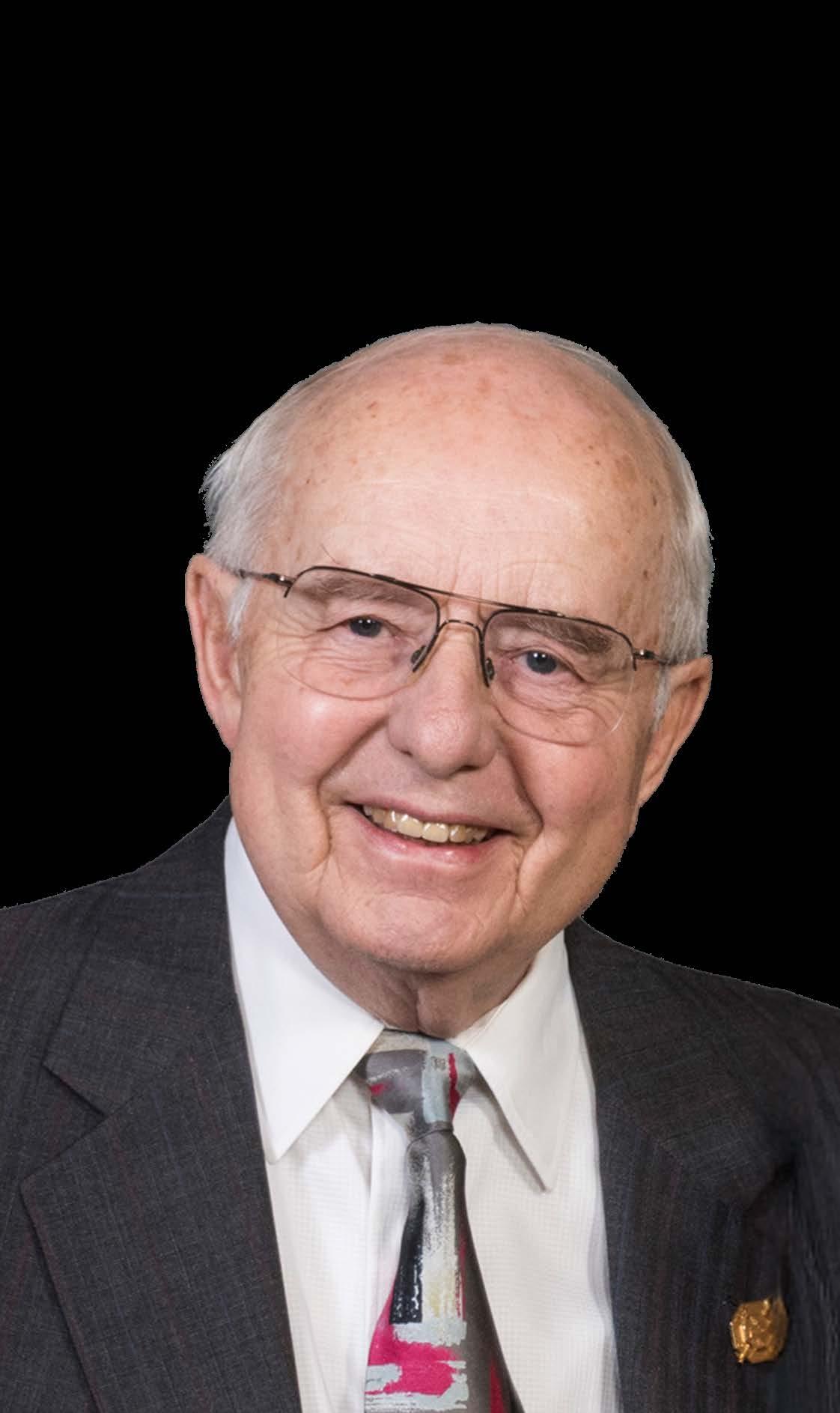
JAMES M. COPELAND
If we had lost speech and debate, what would the world have lost?
All would’ve been lost. The world would’ve been lost.”
— Jim Copeland
These words struck me as I sat across from Jim Copeland in a conference room one cloudy afternoon in St. Paul, Minnesota.
Tasked with compiling a video series chronicling the history of the National Speech & Debate Association (formerly the National Forensic League), I had interviewed many successful coaches and educators, but Jim was in a league of his own. Whereas many of my previous subjects had been truly influential educators and impactful leaders in their own right, Jim Copeland was the key to everything .
The only reason these interviews were happening—why there even still was a National Speech & Debate Association— was directly due to Jim’s efforts over the course of his life.
And he came prepared! Ever the debater and chronicler, Copeland entered the interview room carrying a folder bursting at the seams with historical documents, news clippings, testimonials, and original written material—not that he needed them. Even at the age of 84, Copeland’s mind was sharp as a tack, reciting fact after fact as if the entire history of the NSDA were a core personal memory to be treated with the utmost importance. When he proclaimed his belief that “all would’ve been lost,” it wasn’t hyperbole; it was something deeply serious—sacred, even.
In the 1980s, the National Forensic League faced a critical juncture requiring decisive leadership and extraordinary dedication to ensure its survival. Jim Copeland answered that call, returning from retirement as Executive Secretary to navigate a period of significant financial hardship. To anyone who knew him, Jim’s act of selfless sacrifice in rescuing the League from bankruptcy wasn’t simply a heroic act of an individual; it was an extension of the very fiber of his character.
THE EARLY YEARS
From the moment Jim Copeland burst upon the world of forensics in the late 1960s, his commitment to empowering young people with the transformative skills imbued by speech and debate education was clear. His classrooms at Battle Creek Central and Marquette High School in Wisconsin were a melting pot of students across all social circles— jocks and geeks rubbing rhetorical elbows and defying notions of who should join the debate club.
Jim taught us how to work as a team, how to succeed, how to overcome adversity, and ultimately how to become good productive people and citizens.”
— Jeffrey Clark, attorney and former student
As attorney and former student Jeffrey Clark related, “Jim taught us how to work as a team, how to succeed, how to overcome adversity, and ultimately, how to become good productive people and citizens.”
In competition, Copeland’s students
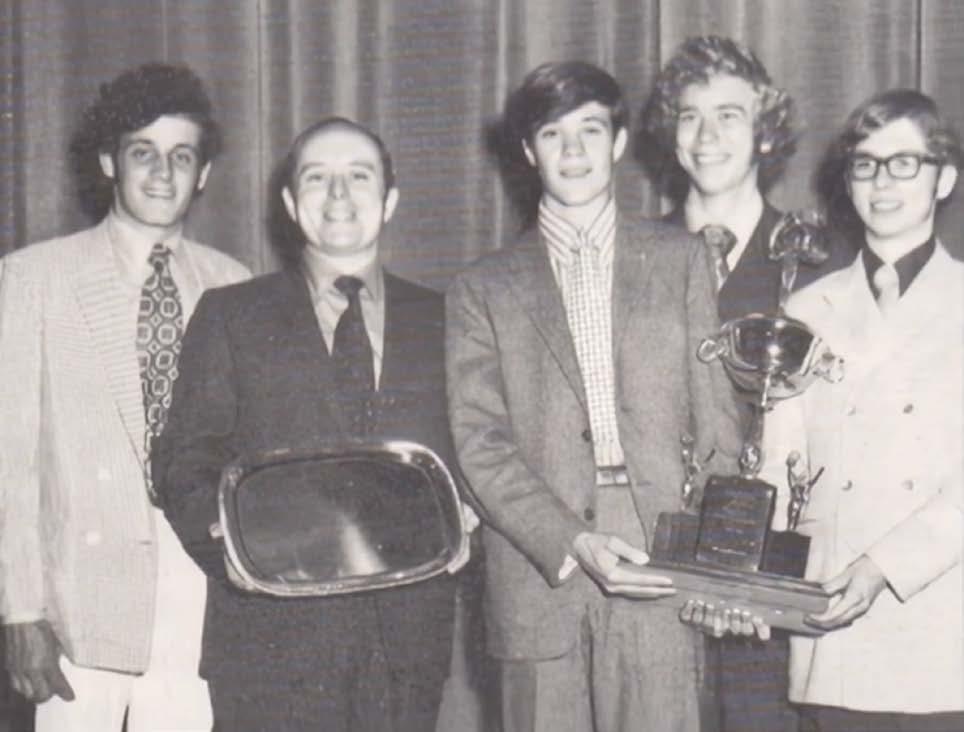
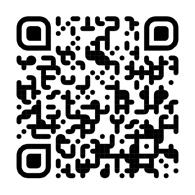
WATCH THE VIDEO
dominated the country for the span of a decade, regularly winning top honors locally as well as at NFL Nationals, NCFL Nationals, the Barkley Forum, and the initial Tournament of Champions.
The Milwaukee Sentinel reported on the success of Marquette’s forensic club in 1974, saying, “It has won so many first place trophies that most of them are shoved in a basement corner because there’s no more room to display them.” In fact, Jim’s teams were so consistently successful that, among other reasons, the NFL and NCFL shuttered their
Check out “NFL to NSDA and Beyond – Copeland and Crisis: The 1980s” on our website • www.speechanddebate.org/centennial-timeline
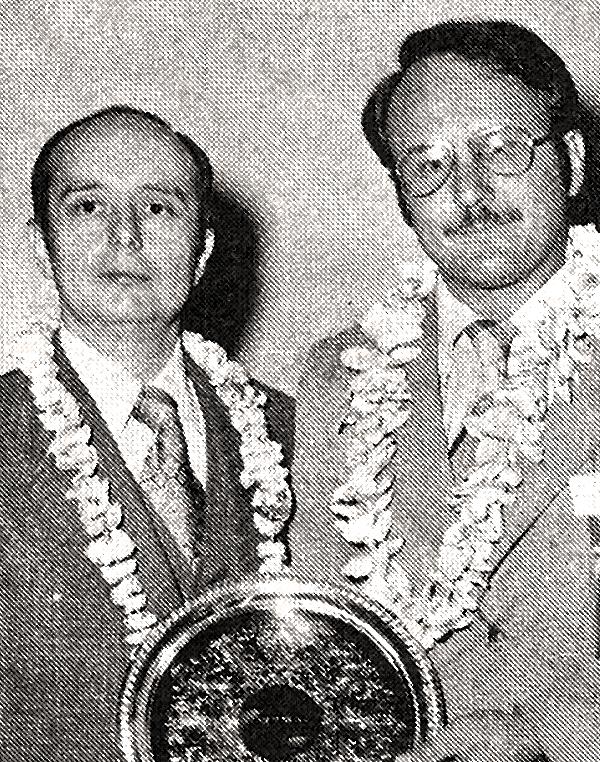
sweepstakes awards at their respective national tournaments.
But throughout it all, competitive success was never Jim’s true reward. “In debate and speech, if you catch the competitive bug, you will learn things that you’ll learn no place else,” Copeland remarked. His proudest accomplishment was always seeing the development and success of his students in their personal and professional lives.
As former student Mark Foley put it, “He always seemed to be

pressing us toward excellence, hard work, and hard effort—and yet, there were a whole lot of times I can remember when he would pull someone aside and say, ‘You know, are you really happy doing this? How is life going for you? What’s working for you?’—so that it wasn’t about him. It wasn’t about winning glory for the school all the time. It really was about us.”
Copeland’s restless nature also extended outside the classroom. From a young age, he was gripped by a love of radio. After school, he would work night shifts as a disk jockey at local radio stations, a tradition he would continue into his coaching years. Always one to keep up with pop culture trends, he even hosted a midnight radio program as “The Monk of Punk,” spinning records
from early punk bands that, at the time, rarely received radio play.
The Associated Press selected Jim to join a judging panel for several presidential debates, including pivotal debates of Jimmy Carter and Walter Mondale against Ronald Reagan, and was a frequent guest on radio talk shows as an expert on public speaking. One of his favorite hobbies, lawn bowling, even took him to competitions around the world.
SETTING THE STANDARD
In 1978, Copeland was inducted into the founding class of the Association’s Hall of Fame alongside such titans as Bruno E. Jacob, Carmendale Fernandes, Harland B. Mitchell, and Karl E. Mundt, sealing his legacy as one of the most impactful coaches of his
era. A longtime friend and dominant coach in his own right, Brother Gregory “René” Sterner commented, “When I think of Jim, I think of a truly outstanding educator—somebody who has really made a tremendous difference in education. He has set the standard by which I think our activity will be judged in the future.” By the time he retired from coaching debate, Copeland had served the National Forensic League in nearly every official capacity, save for the top job, that of Executive Secretary. Little did he know that he would soon get his shot at the title.
REACHING A CROSSROADS
Just a short while after leaving education to pursue real estate,
When I think of Jim, I think of a truly outstanding educator—somebody who has really made a tremendous difference in education. He has set the standard by which I think our activity will be judged in the future.” — Brother Gregory “René” Sterner
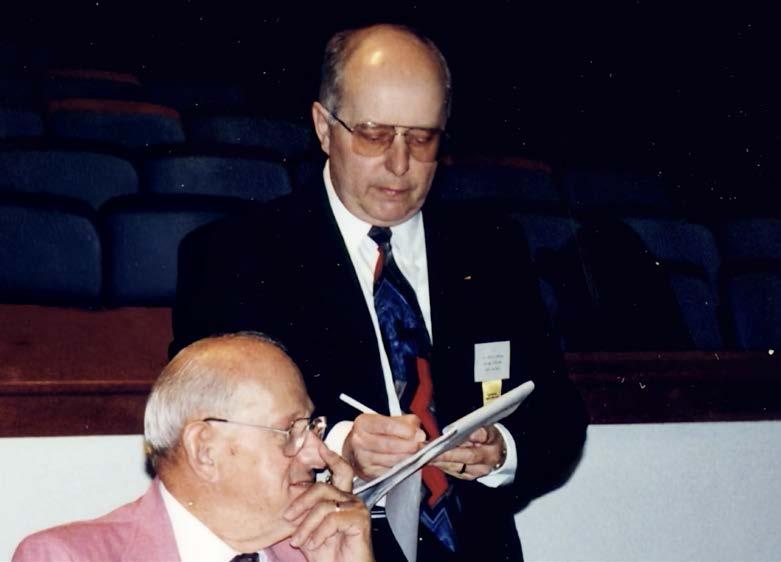
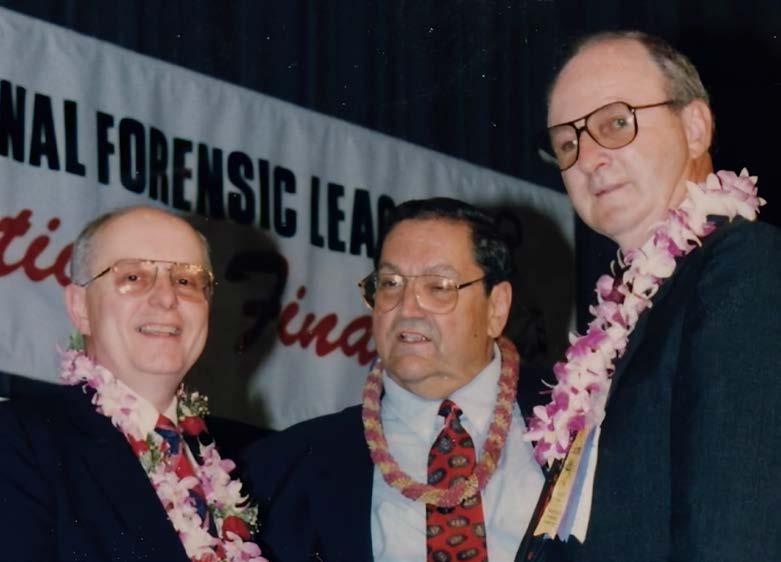
Copeland received a tense call from his personal friend and NFL Board member Donus Roberts. There was a special Board meeting coming up, and Roberts wanted Copeland to attend to provide his expertise and opinions on a pressing matter.
Copeland was hesitant at first; he had a new
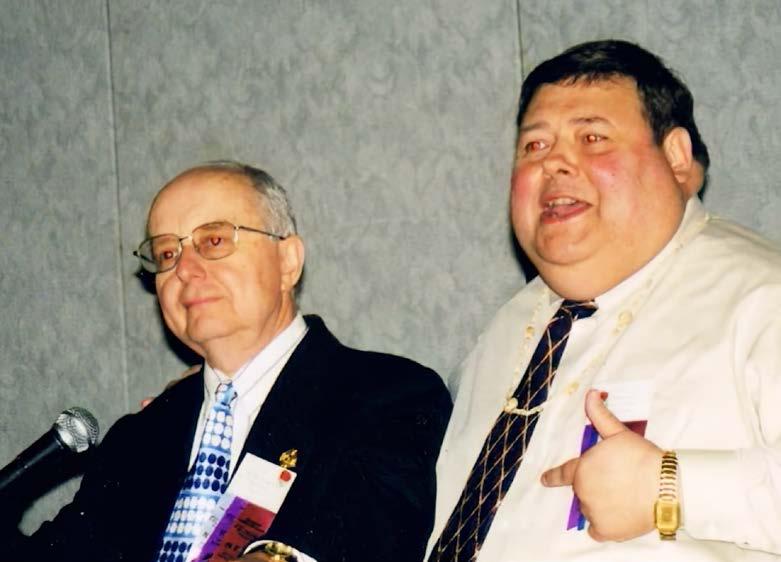
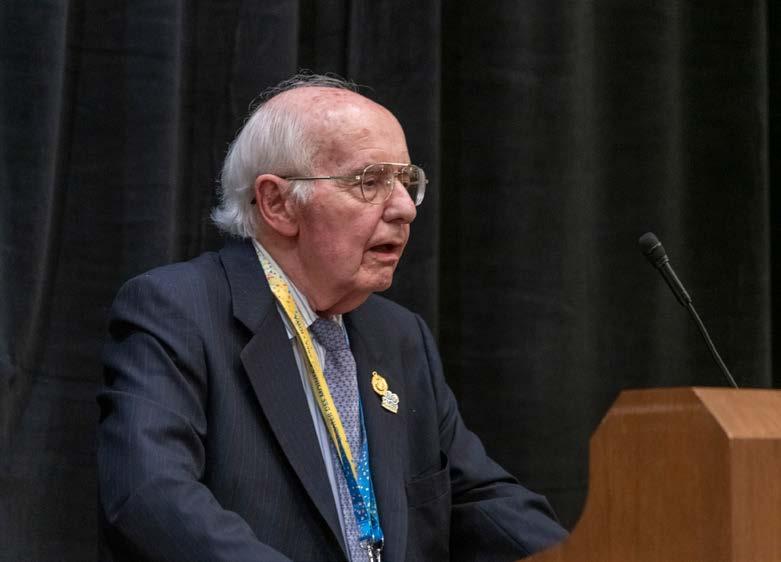
profession and was enjoying settling into his new life apart from speech and debate, but he eventually was coaxed to attend. What he would discover would be an existential threat to the entire activity.
An audit of the League’s finances had been conducted,
revealing anomalies in the organization’s books that pointed to financial fraud. The League needed a new leader.
As Donus Roberts recalled, “My real reason in getting Jim there was because I felt we had to replace the current leader, and Jim was not only adequate, he was an
•
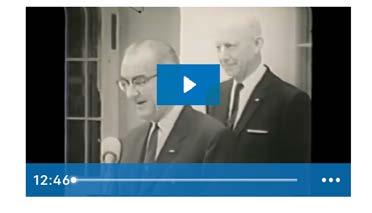
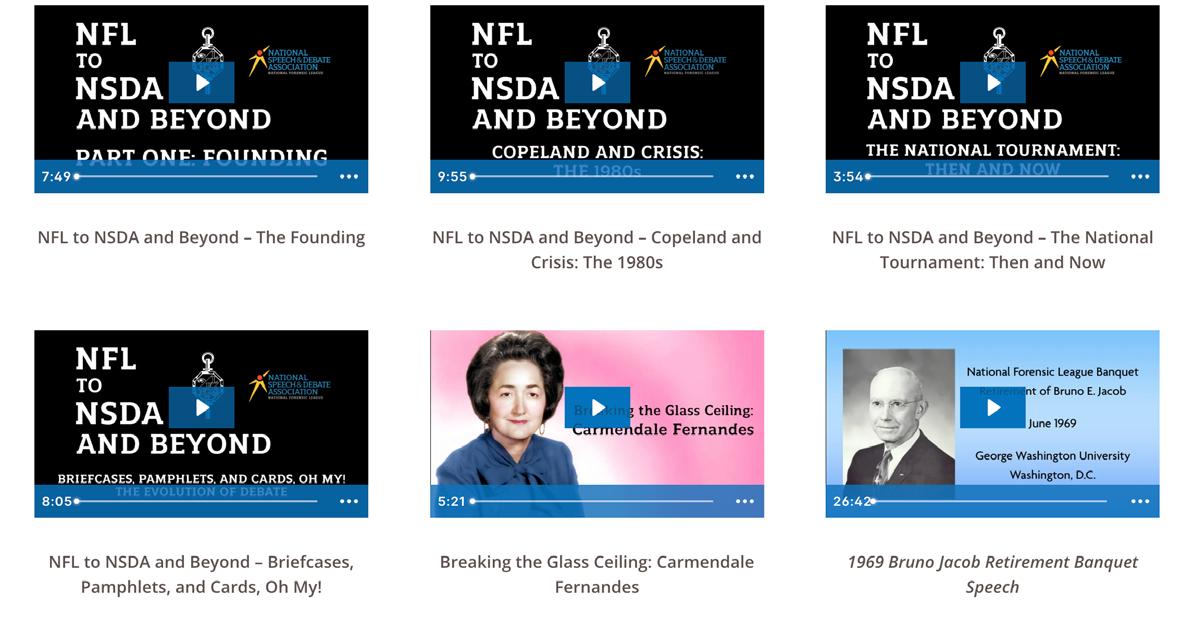

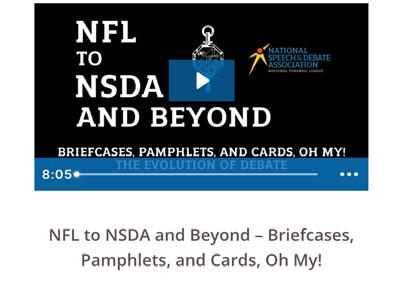

outstanding person to do so.”
After an intense series of votes were conducted, Copeland emerged as acting Executive Secretary of the fragile organization, and immediately put the pedal to metal. “When our auditor told us we had no assets and should MORE HISTORY!
Check out our Centennial Celebration video series, including the complete “Jim Copeland Retirement Tribute (2004)” online:
www.speechanddebate.org/ centennial-timeline
PHOTO 1 • Jim Copeland prepares remarks for final round judges
PHOTO 2 • Sharing the podium with the late Billy Tate
PHOTO 3 • Sporting the traditional Hawaiian leis at Nationals, with Frank Sferra and Donus Roberts
PHOTO 4
Addressing the newest Hall of Fame inductees during the 2025 National Tournament in Des Moines
declare bankruptcy and go out of business, that was a goad,” Jim scoffed. “I’ve got to keep something alive that’s worthwhile.” If the League were going to go under, it wouldn’t go without a fight.
As another legendary coach and close friend Don Crabtree related, “There are lots of myths and great stories out there about this period of time—98 percent that aren’t true—but they make a good story. We needed a leader; he stepped up.”
First on Jim’s list of priorities was tackling the League’s financial fiasco.
Dipping into his own pockets, he personally paid the staff of the organization for months, until new lines of funding could be secured.
Most importantly, Copeland established partnerships with several large corporations interested in investing in educational opportunities, expanding the staff of the League and the resources it was able to provide members. As the years went on, these partnerships became more and more vital, allowing the organization to provide millions of
dollars in funding for teams and programs.
Another area in which Jim supercharged the activity was in outreach. He embarked on a tour of districts and educational conferences, speaking with coaches and educators about ways the League could improve and expand. Membership rose dramatically in these years as the organization grew closer to its members, began offering several more events at the National Tournament, and expanded resources like the previously bare-bones Rostrum publication.
Jim also spearheaded efforts to modernize
the organization, such as recording Nationals final rounds, creating educational videotape resources for coaches, and developing early computer-aided solutions for tabulating tournaments.
PASSING
THE BATON
By the time Jim Copeland retired in 2003, the National Forensic League had been completely transformed as an organization. No longer simply an Honor Society for students to earn points, the League had risen from the ashes to become an integral
ROW 1 • Joyce Krieger, Sandy Krueger, and Ruth Moe
ROW 2 • Patti Kilburg, Diane Rasmussen, and Lisa Vossekuil
ROW 3 • Alice Schleicher and Erica Gould (Zanto)
ROW 4 • Carol Zanto, Jim Copeland, Jackie Oakes, and Kathy Dumke

National office staff pose in front of the Hall of Fame photo display in Ripon, Wisconsin, in 1995 (from left to right):
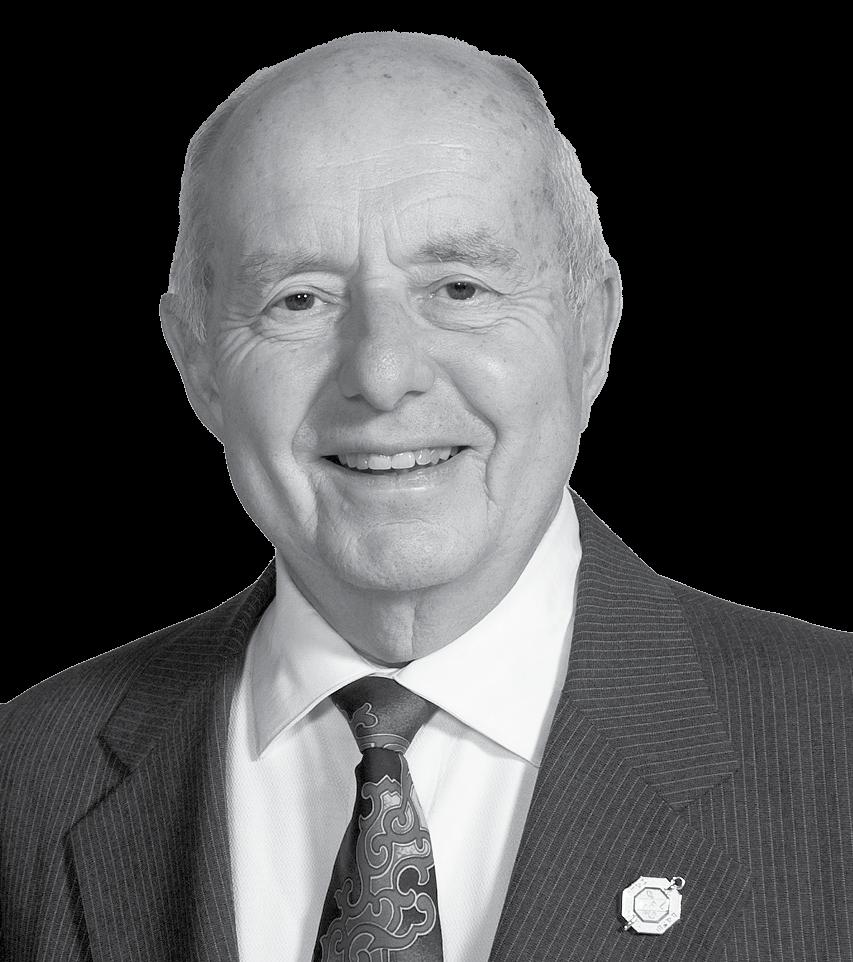
partner in education for thousands of programs across the country.
Over his two decades of leadership, he had poured his heart and soul into building up the League, and a foundation had been laid that would continue to this very day.
Before his interview for the job of succeeding Jim Copeland as Executive Director, Scott Wunn recalled a moment where Copeland beckoned him into his office at the old League headquarters in Ripon, Wisconsin.
“I’m gonna give you this with the bark off,” Scott remembers Copeland saying. “You ought not get this job for who you know. You ought not get this job for how you look. If you’re going to get this job, you will get this job because of
Jim Copeland’s legacy will be that of the NSDA’s second founder—the man who took the promise established by Bruno E. Jacob in 1925 and truly made it a reality.”
your mind and your mind only.”
Wunn took that message to heart, and the two remain close friends. At the 2003 National Tournament Awards Assembly, Copeland officially passed the baton to Wunn, remarking through teary eyes, “Perhaps it will be written that I was the right man for my time, but now we have a new century. We have young coaches, young students, young ideas, and a young man to take you forward. What can I say to you? Words are inadequate.”
To this day, Copeland frequently appears at Association events, bringing his characteristic pin-sharp wit and sage
advice. All who have met him know of his uncanny memory, his striking insight, and his acute sense of humor. Some of the luckier among us have even seen him perform one of his musical parodies, a remnant from his days on the radio, but an everlasting aspect of the jokester within him.
AN ENDURING LEGACY
As I concluded our interview on that cloudy afternoon, after over two hours of discussion, Copeland hadn’t lost any steam. His mind was still racing, thinking about the future of speech and debate, about the potential in technological advancements, about exciting new opportunities for students.
For Jim, the work is never over. No matter how much he has done, he always has the energy and drive to put in some more. For this and so many other reasons, Jim Copeland’s legacy will be that of the NSDA’s second founder—the man who took the promise established by Bruno E. Jacob in 1925 and truly made it a reality.
On behalf of all of us involved in this remarkable activity and community, thank you Jim. The National Speech & Debate Association is as strong as ever due to your peerless leadership and continued support, and the future is looking bright.
Walker Desing serves as Video Production Specialist at the NSDA.
CLAIM YOUR SPEECH & DEBATE
Membership
In our centennial year, we are not just celebrating speech and debate. We are honoring 100 years of community and impact.
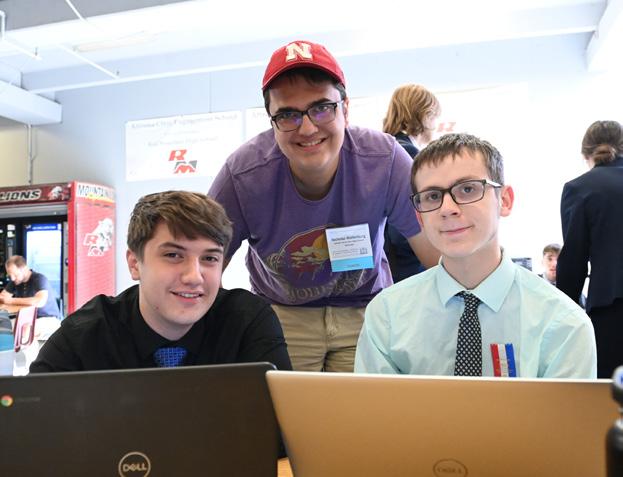
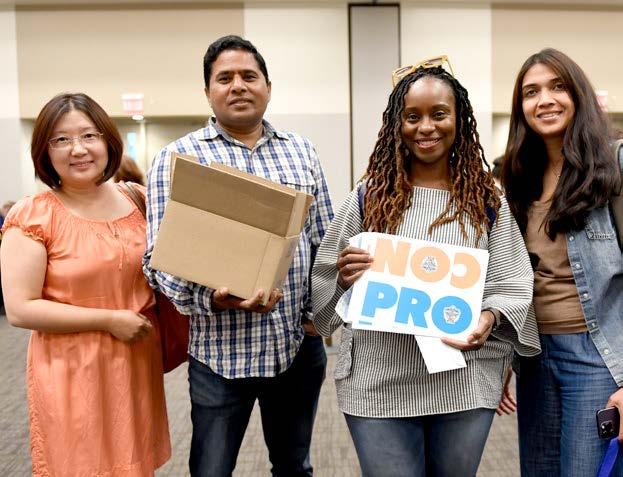
Find your speech and debate connection to support and inspire future generations of public speakers.
BENEFITS:
SHAPE THE NEXT 100 YEARS
» Contribute to the legacy of speech and debate, ensuring that its benefits continue to influence future generations.
EXCLUSIVE WEBINARS
» Receive invitations to upcoming webinars and access past webinars, including “Transform Your Speaking Skills into a Career.”
NETWORKING OPPORTUNITIES
» Gain access to our Speech & Debate Alumni Community on LinkedIn and to our Community Calls, where alums can share stories, discussions, and professional development opportunities with one another.
GET PAID TO JUDGE
» Sign up for our Judge Board for the opportunity to get hired by schools in your area.
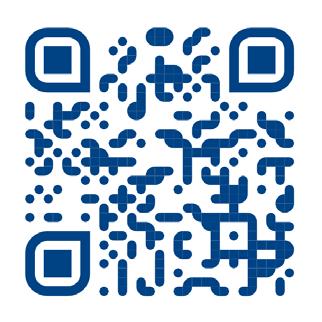
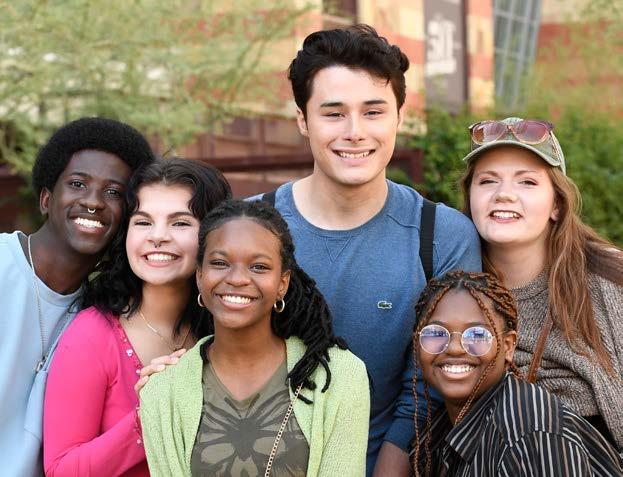
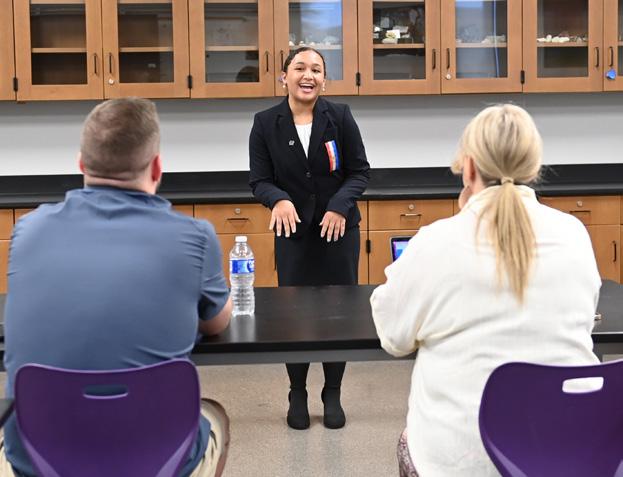
SUPPORT IN A WAY THAT WORKS FOR YOU:
SHARE YOUR STORY
Share your story of how speech and debate impacted your life, career, friendships, and opportunities.
ADVOCATE
Help create access to speech and debate education in your community by becoming an Alumni Ambassador.
DONATE
Each donation gives speech and debate opportunities to more students and schools. Visit our donation page
“Speech and debate taught me that our greatest achievements are measured not by trophies but by the relationships we build and the
— John Otto, Class of 2024
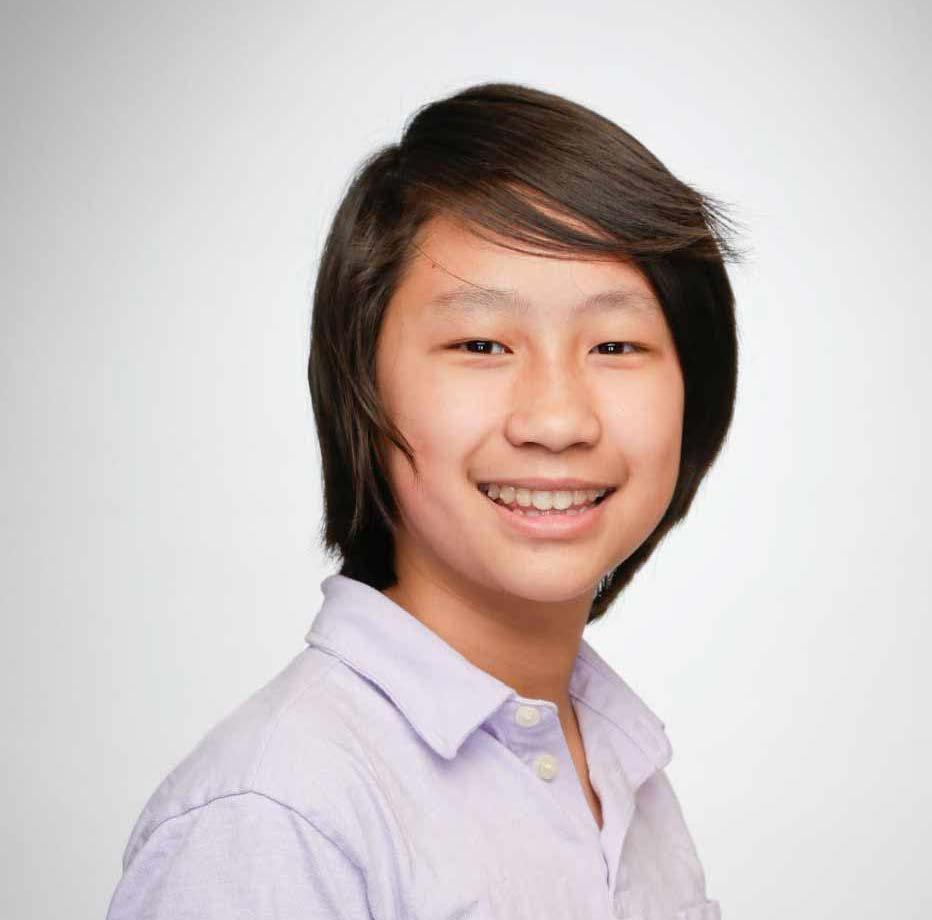
SPENCER
CHAISANGUANTHUM
I believe debate can be for everyone— from California to Cambodia.”
My love of debate was largely by happenstance. It started with a five-day summer camp at the New York City Urban Debate League while in middle school. I discovered the excitement of researching issues, forming arguments, and engaging in spirited discussions with peers who were just as curious and determined as I was. I then joined weekly debate classes at the Bergen Debate Club and, throughout the pandemic,
spent hours debating virtually from my bedroom.
Those experiences set the trajectory for my next several years. Today, I am the co-captain of my high school’s Public Forum team and the founder of Eloquence Academy, an international 501(c)(3) nonprofit organization dedicated to expanding access to debate, especially for students
in rural and Title I schools who often face financial or logistical barriers to participation. Now in its fourth year, Eloquence Academy offers online debate classes, triannual tournaments, and inschool programs for 2,500 students and 75 schools across 35 states and 17 countries. By leveraging virtual learning technologies and working with 125 motivated volunteer coaches and judges, the organization makes debate accessible to all students.
I believe debate can be for everyone. For teachers unsure about integrating debate into the classroom, I always emphasize how debate sharpens critical and analytical thinking, as well as skills in English, reading, writing, and research. For students, debate offers a community of like-minded peers from across the globe.
One of the most meaningful parts of my work is seeing debate flourish in unexpected places. When a small rural middle school in California lacked enough students for a debate team, I worked
with a volunteer to design a SpongeBob-themed lesson (https://tinyurl. com/3rfkdwba) on logical fallacies to spark interest. I even invited guest speakers from a local recycling center to discuss the merits of a single-use plastic ban.
Due to that creative approach to outreach, Eloquence Academy has now extended across borders, hosting online workshops at the Kaabe Schools in Somaliland and the Jay Pritzker Academy in Cambodia. Previously, through our partnership with the Latino Education Advancement Fund, we launched a program teaching debate to elementary students who are native Spanish speakers.
Looking ahead, I hope to expand these initiatives even further—to reach students across Canada, Africa, South America, and Asia, including those with limited English fluency. I dream of building a global virtual debate ecosystem where students can learn and compete against one another from any part of the globe.
Spencer Chaisanguanthum is a member of the NSDA Student Leadership Council from The Dalton School in New York.


JORDAN MELAMED:
Presiding with Purpose
by Anwesha Chowdhury
Jordan Melamed’s path to Congressional Debate started with an unexpected twist: She wasn’t exactly the best singer.
Drawn to the speech elements of theatre but held back by her vocals, she opted for a speech and debate class in sixth grade instead—a choice that would chart an entirely new course for the next seven years of her life. Over the years at American Heritage Palm Beach in Florida, Jordan explored other debate formats like Public Forum, and even competed in Policy Debate for Nationals during her freshman year. None resonated with her quite like
her Congress team—a group she now proudly calls her family. Today, she gives back to that same community by coaching, hoping to become the kind of role model she once found in her own teammates. The support of her two incredible primary coaches, Zachariah Chou and Bo Lint, and upperclassmen played a pivotal role in her journey. Their encouragement and advice were key to the success she achieved on the national stage, not just once, but twice.
she explains. “I consider myself pretty blunt and direct. To me, being a presiding officer is about using my own personality in a professional setting— whether that’s commanding splits, amending a bill, taking votes, or picking questioners and speakers— being able to do that with emphasis on parliamentary procedure, yet still ensuring you are personable. It’s so impactful and shows how important the position truly is, and one of my goals was to emphasize that.”
Congressional Debate. It wasn’t just the event itself that kept her coming back, but the community built around it.
She fondly remembers late-night prep sessions with her teammates that often devolved into silly jokes and tournament bus rides filled with celebration. One memory still stands out: “The only bus we were able to rent for one tournament was a party bus,” she laughs. “I have videos of my friends after prelims right before we all found out we all broke, and it’s just us dancing for an hour.”
Through every win and loss, Jordan grew alongside
One of the roles Jordan came to excel in was that of presiding officer (PO), a student elected by their peers to lead a legislative session and ensure debates follow parliamentary procedure.
Her favorite memory of presiding was when she felt like she made it to the majors at the 2024 Nationals final round. “Congress and a lot of debate events are very male-dominated. Being able to stand up there and lead the room, especially as a female in neon purple, I think just made a powerful message that I’ve always tried to spread,” she says.
For Jordan, presiding meant more than just fulfilling the role’s basic responsibilities. “As a presiding officer, you set an example for what you want that round to look like,”
When Jordan first began presiding, her coach redirected her to focus on what had been winning her rounds so far: her potential as a speaker. But after presiding at the Palm Beach Catholic Forensic League tournament and placing fourth, Jordan knew she had made the right choice.
“I liked the idea of being able to run a round, and that safety net of having another skill in my back pocket,” Jordan clarifies. Everyone in the round could debate, but serving as PO was a more unique talent. “It was always there if I didn’t finish a bill in time, or if I didn’t like the topic, or if they just needed a PO.”
After competing in multiple tournaments and semifinaling at Yale, presiding became a central part of her Congress career.
“One thing I always tell people in Congress is that I feel like you master one specific skill—as in, you master the late round or early round speaking. For me, it was just presiding.” Jordan emphasizes that it’s essential to start by immersing yourself in every aspect of Congress, including speeches, questioning, and presiding, before identifying which skill resonates with you the most.
Choosing to focus on being a presiding officer wasn’t an easy decision for Jordan. Presiding offers valuable benefits—such as quickly getting to know everyone by standing at the front of the room—and judges often look out for strong POs. However, there are notable drawbacks. Some judges lack experience with Congress and may not fully understand the role of the PO, which can result in not being ranked at all. Additionally, even a few small mistakes can significantly lower your rank.

Jordan reflects that presiding isn’t exactly hard to learn. It’s hard to get good at. “Everyone sees what a presiding officer does—knows how to use a stopwatch, how to bang a gavel when it’s time—but being able to be efficient at it is one of the hardest things I think I’ve had to do in debate. You want to make sure you are not the person to mess up someone’s speech, especially if it could be their last.”
When asked how to begin the journey of becoming a presiding officer, Jordan starts by describing the ideal PO: observant and quick in a friendly and professional manner. But more important than anything? “You want everyone to feel seen and heard,” she states. Jordan does this by welcoming everyone, making sure she can pronounce their names correctly, and memorizing their pronouns and seating in the chamber.
Still, the path to becoming an ideal PO looks different for everyone. For Jordan, it involved constant practice with her team using presiding sheets and carefully tracking affirmative and negative speeches. Others may prefer automated PO sheets (a digital tool for POs that can help track and organize the round in real time), handwritten tracking, or any system that matches their personal organization style.
Beyond organization, Jordan shares one essential tip for presiding officers at any level: “Judges will always prefer someone who takes a little bit more time but is 100% accurate versus someone who rushes and then makes mistakes. You are going to add up that same time to fix those mistakes later on.”
“Presiding let me meet so many amazing people, whether they are competitors, people running tab, or people who are coaching. I don’t think I would’ve had that much as a speaker, or it would’ve been more difficult to meet those people.”
But the impact of presiding didn’t end with high school. Now a freshman at Northeastern University, studying Political Science and Communications, Jordan continues to carry the lessons she’s learned.
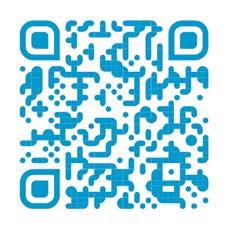
For those hesitant to try presiding, Jordan recommends starting small—begin with a local circuit and build up from there. She emphasizes that becoming a PO doesn’t mean giving up speeches in Congress. Rather, it means developing even more valuable skills to master Congressional Debate. You never know—presiding could end up being your niche, just like it was for Jordan.
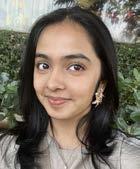
“Presiding has given me so many leadership skills that I’ve needed for everyday life. It has influenced my future goals because it has given me all the skills I need to command a room and to present myself professionally.”
Jordan’s inspirational story is a reminder of what makes speech and debate so special: the joy and effort that go into the events we love, and the unforgettable memories it leaves behind. There’s endless potential awaiting our own journeys, as long as we’re brave enough to try new things and always keep improving.
Anwesha Chowdhury is an NSDA Student Leadership Council Member from West Linn High School in Oregon.
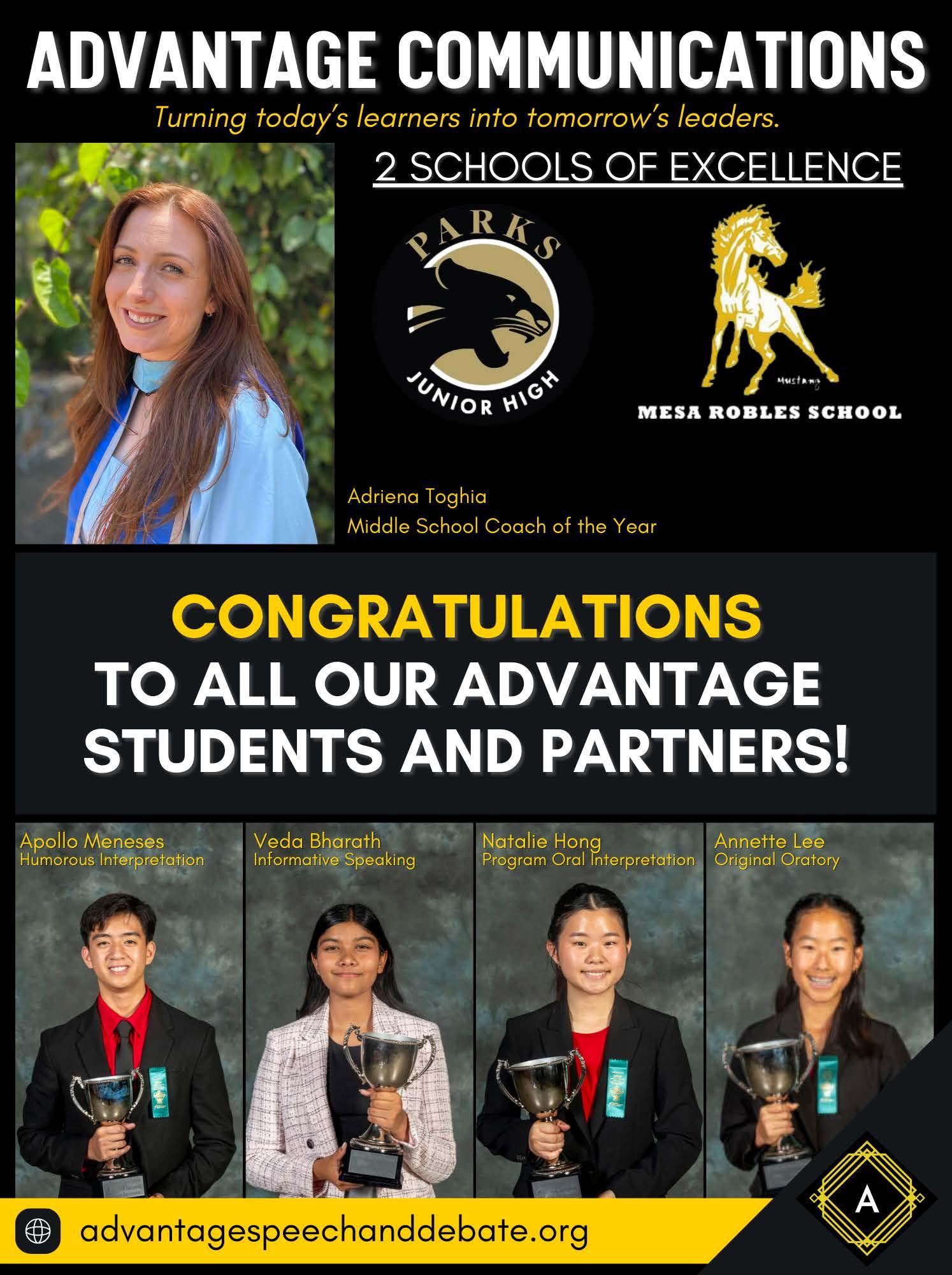

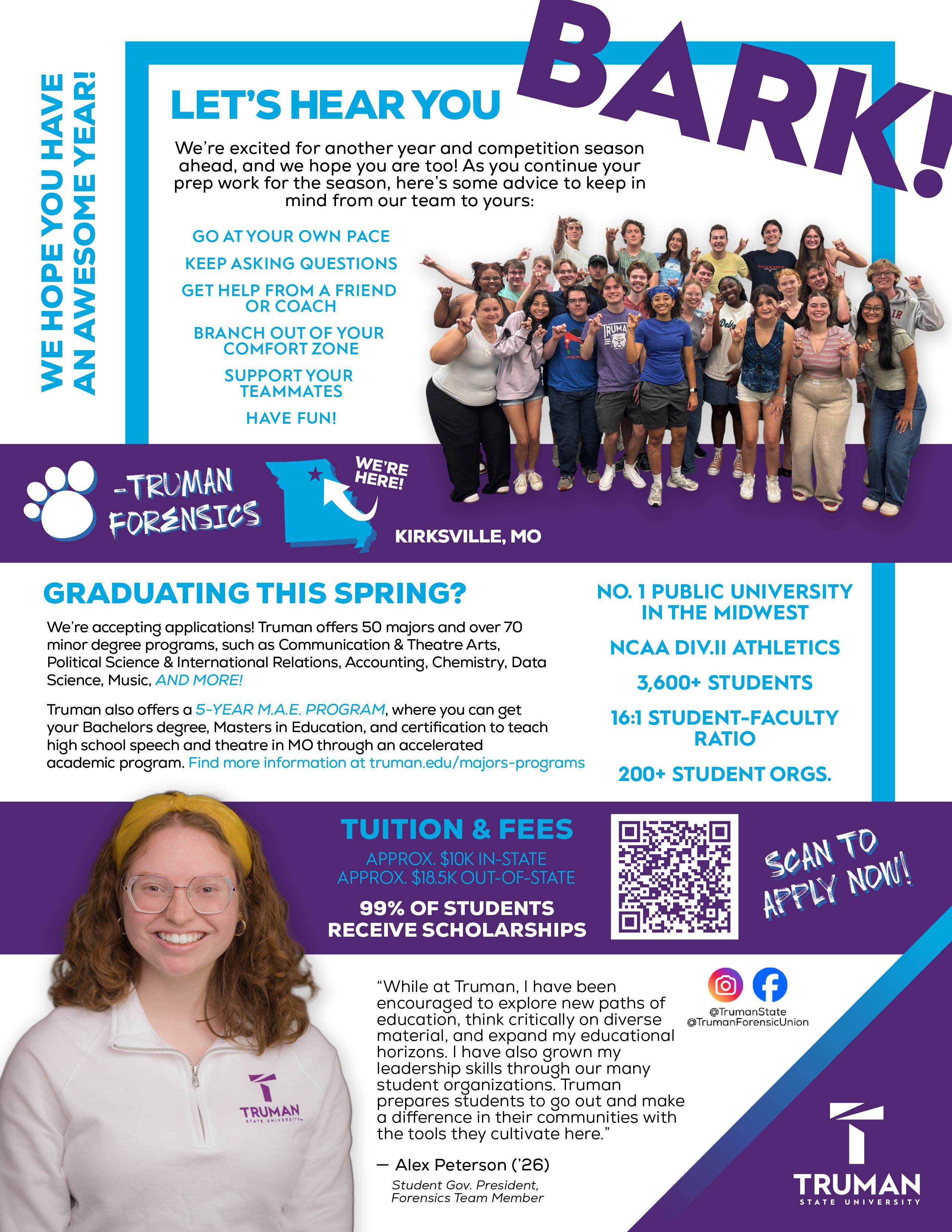
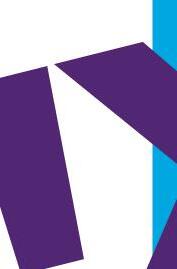
NO JUDGES? NO PROBLEM!
H ow Districts in Missouri Built a Sustainable Volunteer Judging System
by Kara Smith
In Missouri, several districts have quietly perfected a system that makes their tournaments run smoothly without ever paying for judges. The Missouri Heart of America, Show Me, Ozark, and Carver-Truman districts have developed a strong tradition of using volunteer judges, a model that saves money, strengthens community connections, and gives students a deeper sense of ownership in their programs.
Missouri coaches are proud to carry on a long tradition of volunteer judging that has been part of their tournaments for decades. They did not create it, but they have made it their own by building a welcoming, community-driven system that is thriving and well worth sharing.
How It Works
Tournament hosts are responsible for recruiting volunteers to cover all of the judging at their event. Each program sets its own expectations for how many rounds of judging their team needs to recruit based on team size and tournament goals. Students then reach
out to parents, teachers, administrators, alumni, and community members who can donate a weekend to support local speech and debate. By framing tournament hosting as their biggest fundraiser of the year, teams emphasize that donated time is just as valuable as donated money.
A key to their success is the personal connection students make when recruiting judges. Missouri programs have found that asking in person or over the phone dramatically increases the number of people who say yes. A warm, direct invitation from a student rather than an email blast helps potential judges feel valued and part of something meaningful.
To prepare volunteers, programs make excellent use of NSDA’s Judge Accreditation videos and often supplement them with optional judge training hosted by coaches the week before tournaments. These sessions answer questions, build confidence, and help volunteers feel ready to contribute to a positive tournament experience.
Teams also keep organized records of past judges and reach out annually to invite them back. Coaches start contacting volunteers two months before tournaments and follow up the week of the event to confirm schedules.
The Community Connection
The results are impressive. Volunteers range from parents and alumni to local leaders such as mayors and state legislators, as well as college students and company representatives completing community service hours. Many return year after year, marking tournament weekends on their calendars because they genuinely enjoy the experience.
Judges often leave tournaments feeling inspired by what they have witnessed. Some reflect on the optimism students bring to each round, saying things like, “I’m not as scared for the future.” Others are struck by the way students handle disagreement with thoughtfulness and respect, noting, “Regardless of politics, these students show how to disagree civilly.”
values and skills speech and debate cultivates firsthand.
For coaches, hearing these reflections reinforces the importance of building strong community ties through volunteer involvement. Each year, the program does not just rely on outside help. It strengthens relationships, fosters mutual appreciation, and gives everyone involved a sense of shared purpose.
The Payoff
This model has three major benefits. First, students learn to adapt their communication to a wide range of audiences. Second, coaches are free to spend more time working with students or watching rounds instead of judging. Third, schools have no judging obligation throughout the year except at their own event, removing a huge burden for coaches. The result is a smoother, more collaborative tournament environment.
By relying on volunteers instead of paid judges, Missouri tournaments have built a self-sustaining ecosystem rooted in trust, gratitude, and shared purpose. The success of this system shows that when a community rallies behind its students, everyone wins.
This kind of feedback highlights the broader impact of volunteer judging. It is not only a critical support for the tournament itself but also a chance for community members to experience the Kara Smith serves as Manager of Competition and Events at the NSDA.
JUDGE TRAINING
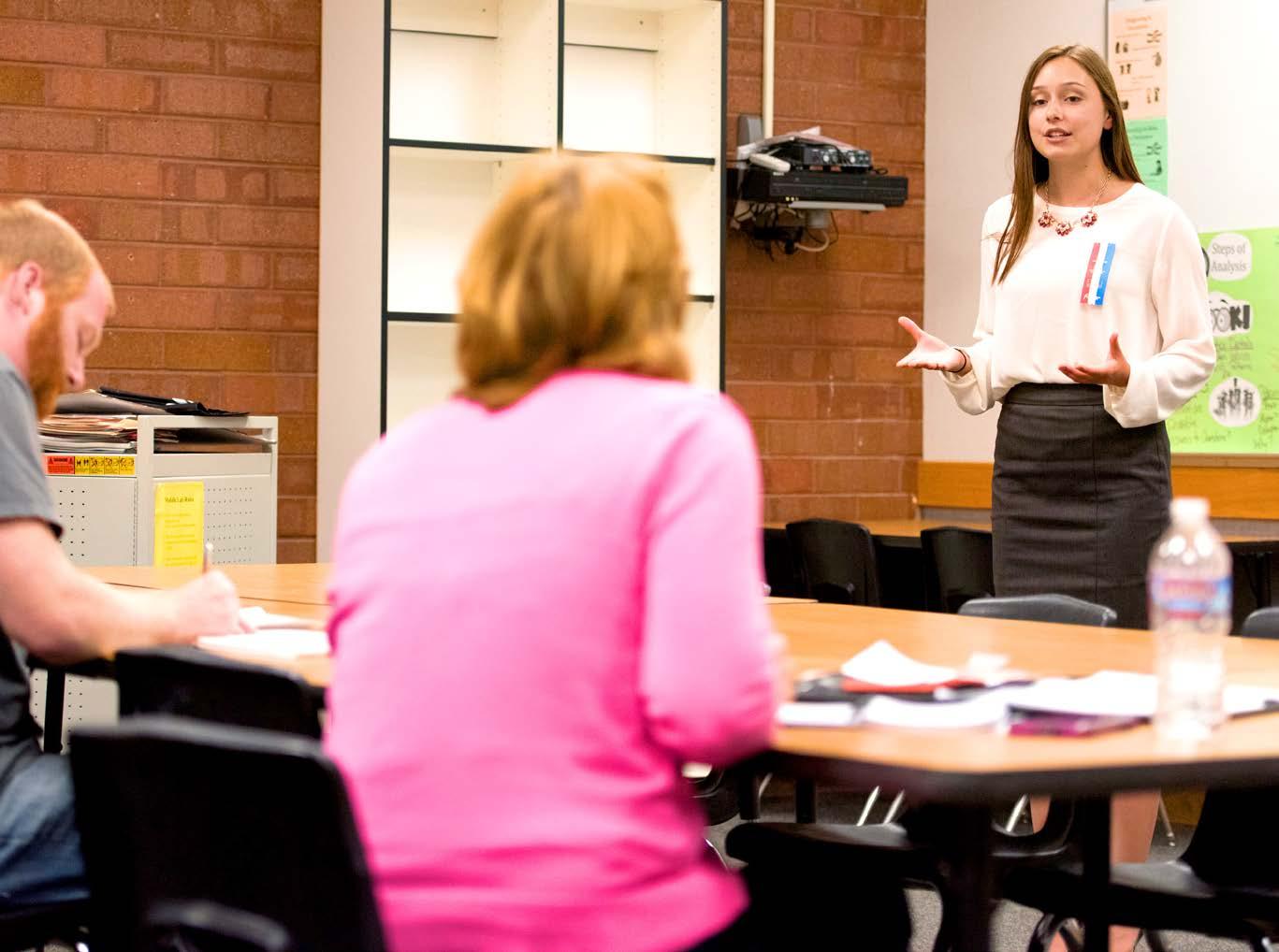

FREE COURSE
NSDA Judge Accreditation www.speechanddebate.org/learn/ judge-accreditation
The NSDA offers an ever-growing set of self-paced online judge accreditation modules. Upon successful completion of each module, judges can download a certificate and will be awarded a badge in Tabroom.com.
ENSURE YOU ARE GIVING STUDENTS HIGH QUALITY, PRODUCTIVE FEEDBACK! THIS FREE COURSE COVERS:
BASICS OF EACH EVENT
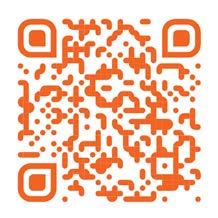
HOW TO FILL OUT SAMPLE BALLOTS
NSDA Judge Board www.speechanddebate.org/ judge-board
HOW TO PROVIDE COMMENTS THAT ARE CONSISTENT WITH BEST PRACTICES FOR CULTURAL PROFICIENCY.
www.speechanddebate.org/judge-training
The Judge Board is an online list of contacts in the speech and debate community who have indicated their interest in judging NSDA-affiliated and/or school-affiliated tournaments. If your school needs to hire a judge, use the information provided and reach out directly. Any hiring of judges is an agreement between the tournament/school and the judge, and is not endorsed by the National Speech & Debate Association.

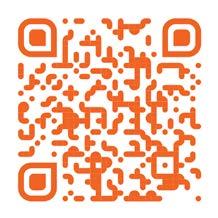
Paradigm Standards www.speechanddebate.org/ judge-paradigm-standards
The NSDA recently revised its judge paradigm standards. We encourage all judges to utilize these standards in writing/ updating paradigms and all schools to review the paradigms of judges hired.
NEW! Coaches now have an easier way to view their judges’ paradigms and when they were last updated directly from their school’s Judge Roster on Tabroom.com.
[SCHOOL NAME] JUDGE ROSTER
As a reminder: The paradigms published on Tabroom.com reflect the personal opinions and judging philosophies of their individual authors, not those of the NSDA or any affiliated institution.
Judges attending the high school and middle school National Tournament in June will be required to complete all Level 1 and Level 2 courses for the event pools in which they are entered to judge by May 15. Each course module is designed to be completed in 15 minutes or less, so the total time commitment most judges can expect would be approximately 30-75 minutes.
New Level 3 certification modules for each of our competition events will be live on March 15, and they will go into depth about how to write constructive feedback for each event. Plus, there have been updates made to the Level 1 module about how judges can interact respectfully with different perspectives; this module is now called Level 1: Impartial Judging. Judges who have already completed the previous version of the module do not need to take the updated version. The Level 1: Impartial Judging module focuses on three key characteristics necessary for impartial judging, examines how these qualities apply in practice, and offers practical strategies for providing fair, unbiased, and constructive feedback.
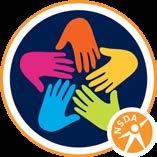
Judges play an important role in supporting students’ educational and competitive endeavors. Thank you for taking the time to become a better judge for our students!
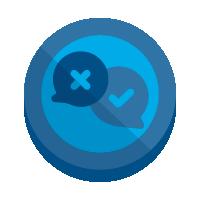

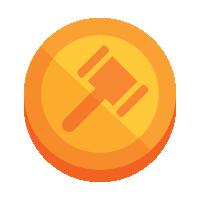


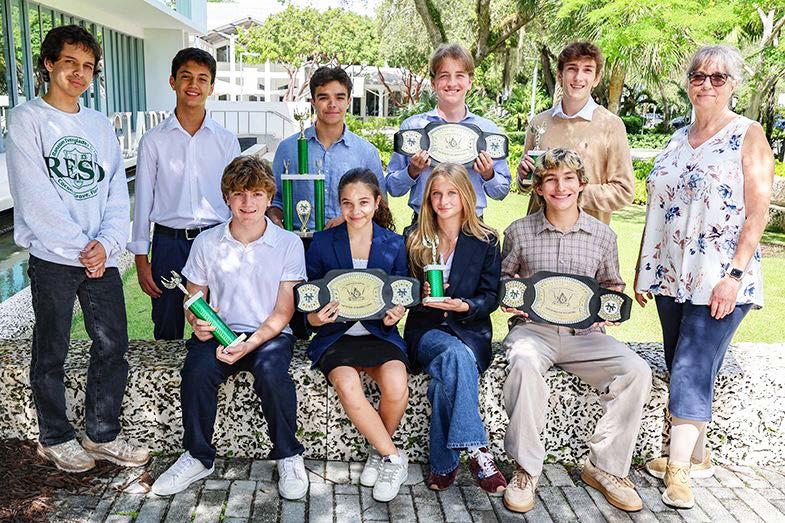
Five-diamond coach
Kate Hamm and her students appear to have cracked the code at Ransom Everglades School in Coconut Grove, Florida. Despite the considerable size of the speech and debate team and the wide variety of events they compete in, all students feel their voices are valued and share a strong sense of belonging. We spoke with Coach Hamm and a few of her student leaders to learn more about their unique structure and dedication to service, both on and off campus.
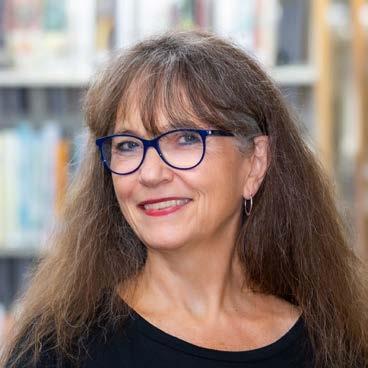
WA ll of Us Have a Voice
How the Ransom Everglades Speech and Debate Team Builds Community through Leadership and Service
hen asked how many students are typically on the team, Coach Hamm and her students can’t help but laugh. When Coach Hamm came to Ransom Everglades, the team had fewer than 10 students. Over the last decade, she has built an impressive team with about 165 students. Eli Tomasetti (’27) remarks, “It feels like almost one-quarter of the school is on the team.”
Coach Hamm recognizes the complications that come with such a large squad. “It’s a problem,” she says, “but it’s a great problem to have.”
Strength in Numbers
by Dr. Athena Murray
One such problem is ensuring each and every student has an impactful speech and debate experience. Coach Hamm says, “I want to make sure that every child in this program is seen and
heard and that their voice has volume.” In addition to Assistant Coach Justinmar Perez, the Ransom Everglades team relies on student leaders to accomplish this goal.
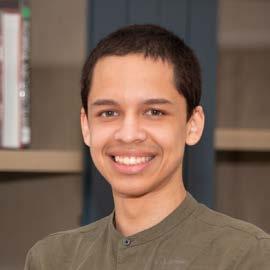
Coach Hamm created a student leadership structure to facilitate strong connections among everyone on the team. The Ransom Everglades team has a President, Vice President, and Secretary who perform a range of administrative tasks such as managing team communication, educating parents and families about speech and debate, recruiting, and writing press releases. Each event has Squad Captains who plan and run practices. Squad Captains run at least one main practice a week and make themselves available to other students for additional practice sessions.
On the Ransom Everglades
team, being a Squad Captain is an incredible responsibility. Like any coach, they teach the basics, debrief from tournaments, workshop speeches, discuss current events, and hold practice rounds.
Squad Captain Sofia Mena (’27) says, “I think I met with 20 kids in a single week. I didn’t eat lunch with my friends for two weeks. But it’s nice. It makes me feel happy that I’m creating an environment where they feel there is no such thing as a dumb question. I am happy the culture is changing for novices.”
In recognition of the workload associated with each leadership position, students apply for their roles. They go through an interview process with three members of the school staff who rank the candidates and make the final call.
Coach Hamm notes that Squad Captains are often competitively successful, but more importantly, “They’re good people. They’re kind people. They’re good at working with the struggling kids.”
Ransom Everglades’ leadership structure turned the “problem” of too many students into an incredible asset. As Squad Captain Connor Alfonso (’26) puts
it, “Having such a large team makes it so that novices can find at least one person that they can relate to.” Their leadership structure keeps every student on the team connected, engaged, and included. “There are people who I talk to that, otherwise, I would never have had a conversation with. Speech and debate is the thing that brings us together. Being inclusive is part of our team’s personality,” says Squad Captain Eli Tomasetti.
A Culture of Service
Dedication to service is also part of the team’s personality. It starts with Coach Hamm. In addition to being the director of the speech and debate program, Coach Hamm is the director of Region 5 of the Florida Forensic League, as well as the chair of the NSDA Flamingo District. She describes service to the speech and debate community as “an obligation I have, but not in a negative way.” She feels called to mentor new coaches and support speech and debate programs in South Florida. Fittingly, Coach Hamm won the Pelham Commendation at the 2025 National Tournament (sidebar)
Coach Hamm’s students feel that same call to serve others. Squad Captains view their role as much
more than warm-ups and speech workshops. They take pride in mentoring younger students.
Squad Captain Bella Parisi (’27) says it is “rewarding to help someone the way that I was helped as a novice” and to see “the novices grow and work hard and get better every time that I meet with them.” Novices look to the older members of the team not just for advice on speech and debate, but also for role models and familiar faces to turn to in challenging moments.
“We don’t just talk about our event,” says Squad Captain Nick Torres (’27). “Although our primary focus is to get better at speech and debate, it’s kind of family oriented because we help each other.”
In addition to serving their team, speech and debate students are actively involved in a wide variety of service activities off campus. Students work with organizations that help teens with legal problems, read to elementary students, perform outreach, assist students in business competitions, and so on. “All of us have a voice. It is what you do with your voice that can impact people’s lives,” states Squad Captain Veronica Luzine (’26). “After being in this program, you
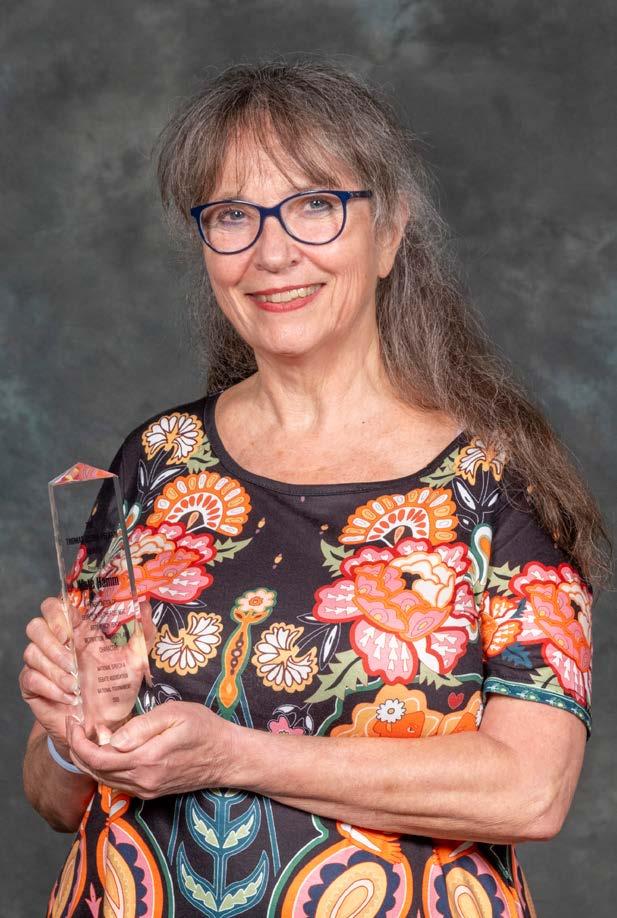
2025 PELHAM COMMENDATION RECIPIENT
Kate Hamm, Florida
The Pelham Commendation recognizes devotion to the forensic arts which teach motivation, integrity, and character. The award was established by the will of Thomas Glenn Pelham and is endowed by the Barkley Forum of Emory University. The award is given annually to someone who:
• has spent a decade or more as an educator or advocate in the high school speech and debate community;
• exhibits motivation, integrity, and character; and
• emphasizes to speech and debate students the importance of motivation, integrity, and character above competition.
learn that every single person has a different perspective and it is how to apply that to your community that makes a difference in someone’s life.” The student leadership structure at Ransom used to include a Service Coordinator who was responsible for spearheading volunteer opportunities for the team. The team performed so much service organically that they eliminated the position. “Everything that Ransom does is serviceoriented,” Coach Hamm says. “It is second nature for the team.”
be the best version of ourselves. We all came together and realized it was the moment to step up and be self-sufficient.” The team’s dedication to service and to each other prepared them to work together and support one another during Coach Hamm’s absence.
Ransom Everglades speech and debate students care about what they do, care about each other, and care about their communities. The size of their team is a powerful asset: each student has a role, and team leaders shoulder
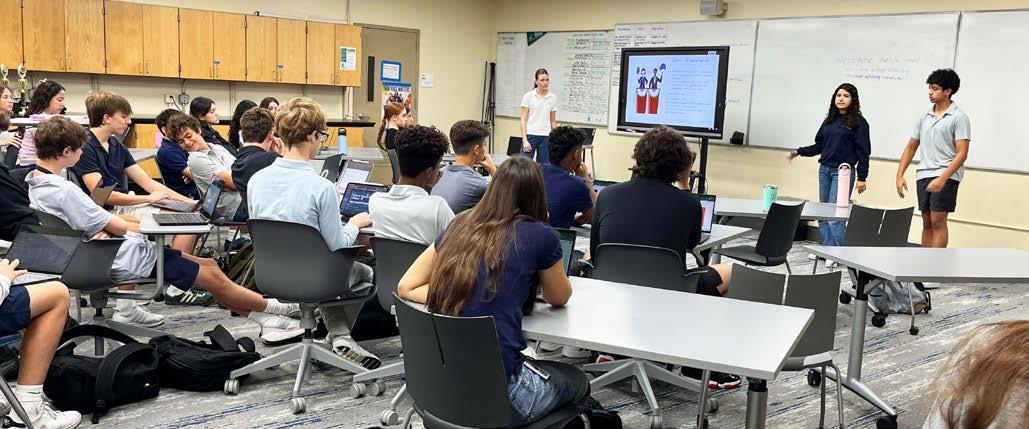
A Team Effort
Last year, Coach Hamm was injured by a vehicle and was unable to coach for months. It was a defining moment for the student leadership and the team. Veronica Luzine recalls how the team reacted: “Everyone was so shocked with the news of what happened. But we decided that we are here to compete and
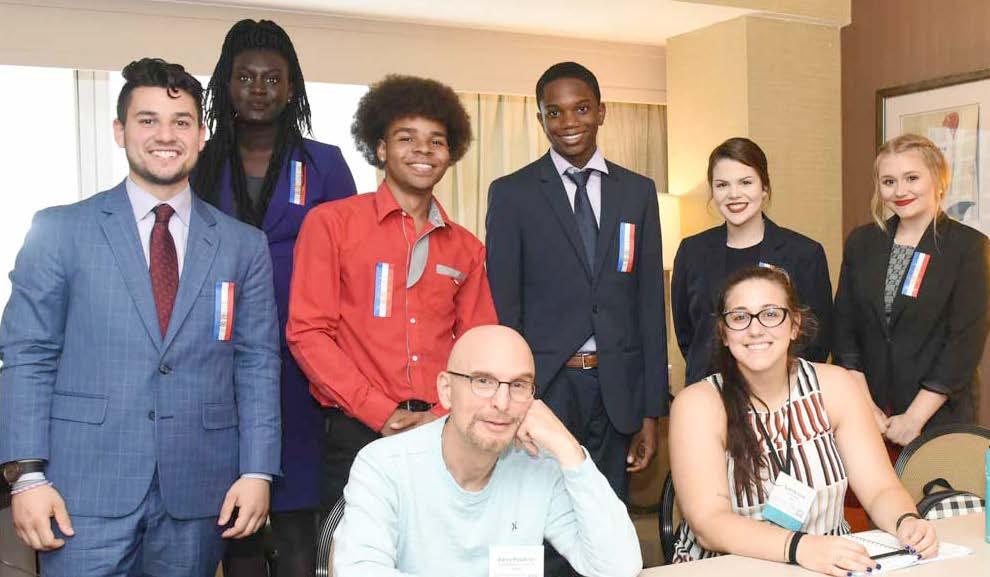
Student Leadership Positions

President
Oversees the function of the team and internal and external communication. They manage the team communication platform and support squad captains. In addition, they run parent meetings and share updates about the team.

Vice President
Assists the president with communication tasks. They are also responsible for sharing information about events and tournaments with the team and creating a communication plan for each tournament.

Secretary
Acts as the team historian. They are responsible for writing press releases, newsletters, and posts about the team. They also take videos and photos at tournaments to capture the team’s experience.

Squad Captains
additional coaching and mentoring responsibilities that drive the success of the team. Moreover, their dedication to service informs positive actions on the team and in their communities. In a society with decreasing empathy and increasing apathy, Coach Hamm and her students have created an inclusive, supportive, and vibrant team culture.

Responsible for a wide variety of coaching and mentoring activities in their event. They work with the coach to create practice schedules, collaborate to plan and run practices, and encourage all members of the team to attend and participate.
Service Coordinator
Creates service opportunities for the team. They identify the team’s skills and strengths and match them with local organizations and community needs.
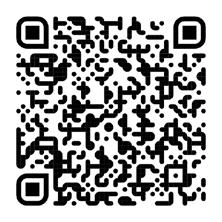
Interested in creating more student leadership opportunities on your team? Take our NSDA Learn course!
www.speechanddebate.org/learn/courses/ how-to-build-a-student-leadership-program
Dr. Athena Murray serves as Manager of Professional Learning Design at the NSDA.
SALAFA SAULALA
Student Leadership at Work in Alaska
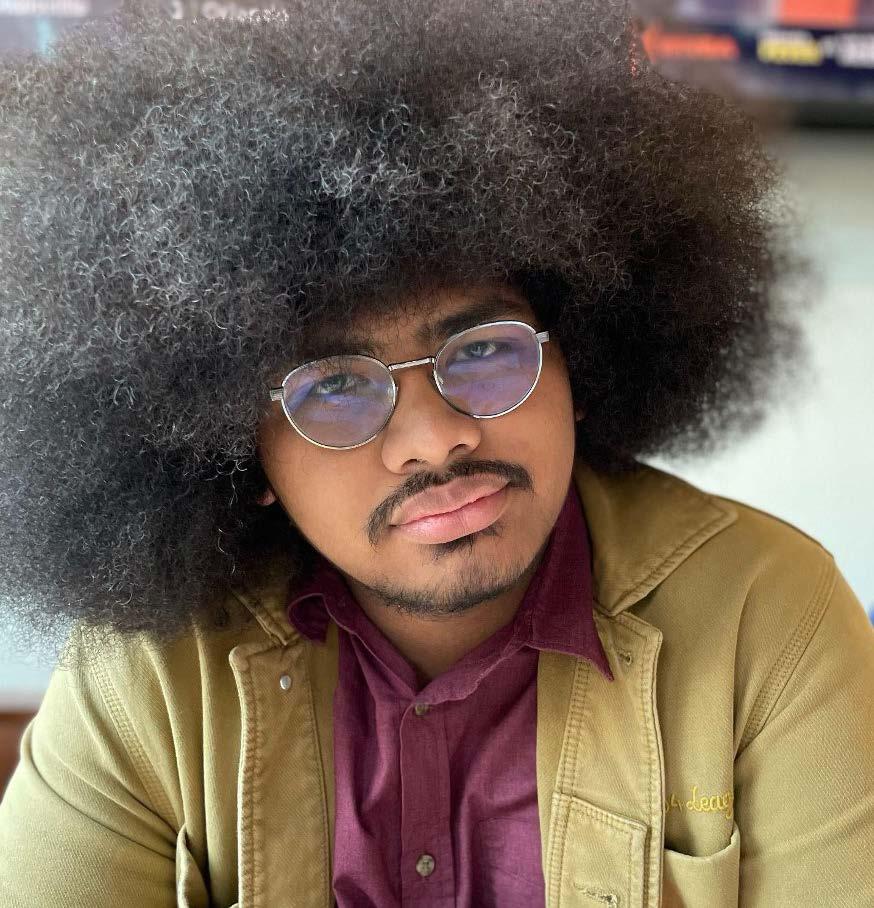
Speech and debate may be more prevalent in the Lower 48, but Salafa Saulala has a message for the rest of the country: “Don’t count Alaska out.”
From her home in Anchorage, Salafa is quickly growing the state’s largest speech and debate team with the support of her coach, Michaela Kolerok. Together, they’re proving that even in one of the most remote circuits in the country, tapping into student leadership can transform the landscape of DDF—Alaska’s drama, debate, and forensics program.
A Circuit Like No Other
The Alaskan circuit is small enough that Salafa sees the same competitors at nearly every tournament. With four tournaments before state, opportunities to compete are not abundant, but that scarcity has made her team’s competitors value every round. “Whatever opportunities there are, we’ll take them,” Salafa explains.
She describes Alaska’s circuit as both close-knit and traditional, a place where
innovation is slow but camaraderie runs deep. As the student manager of West Anchorage’s 30-member team, Salafa spends much of her time managing logistics. “Most of my job is actually just pure communication,” she says with a laugh. Without it, she says, her team starts losing momentum as well as members.
Building Belonging
Her next priority is planning practices. “We only have two practices a week here at West,” she says. That’s why it’s critical they are as productive as possible. Specifically, she’s implemented a structured weekly practice schedule, where each day has a distinct purpose, ensures balanced skill development across events, and also gives students concrete goals for each session, helping her team improve consistency and accountability.
“Visibility is a huge thing in recruitment. To be blunt, if you don’t see people who look like you or have your same experiences, you’re not nearly as incentivized to do it.” As a Polynesian student, she’s experienced this firsthand. While growing up, she says “there were not many Polynesians in any of these super academic activities.” For a long time, she thought her presence in speech and debate alone would change that. Over time, though, she’s realized that part of what makes a difference is actively encouraging her peers to perform pieces and write speeches that connect to who they are.
by Vivek Rajdev
Learning to Lead
The rest of Salafa’s time goes to mentoring novices and middle school students. She lights up recalling a moment from earlier this year. “Two novices I’d been working with throughout the year handed me this marble. Apparently, for their English final, they were supposed to hand the marble to someone who had a good deal of impact in their life.” That was the moment she realized that mentoring younger students really mattered. It was also the moment when she realized that leadership comes in many forms. For her, leadership primarily meant checking off action items. But her mentoring experiences reframed leadership as an exercise in one-onone connection, both to the speech and debate community and each other.
Over time, she’s developed a leadership philosophy that works for her and her team: meet people where they are. Originally, she was fixated on the idea of debate cases needing to be done by a specific time before a tournament. “But then I realized that’s just not how a lot of my novices work,” she says. Salafa realized that rather than a one-size-fits-all model, “you have to go with each individual and see what’s stopping them from working on their case, what are the roadblocks, and just talk to them and engage with them one-on-one.”
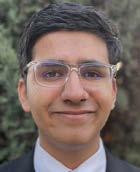
Vivek Rajdev is a member of the NSDA Student Leadership Council from Khan Lab School in California.
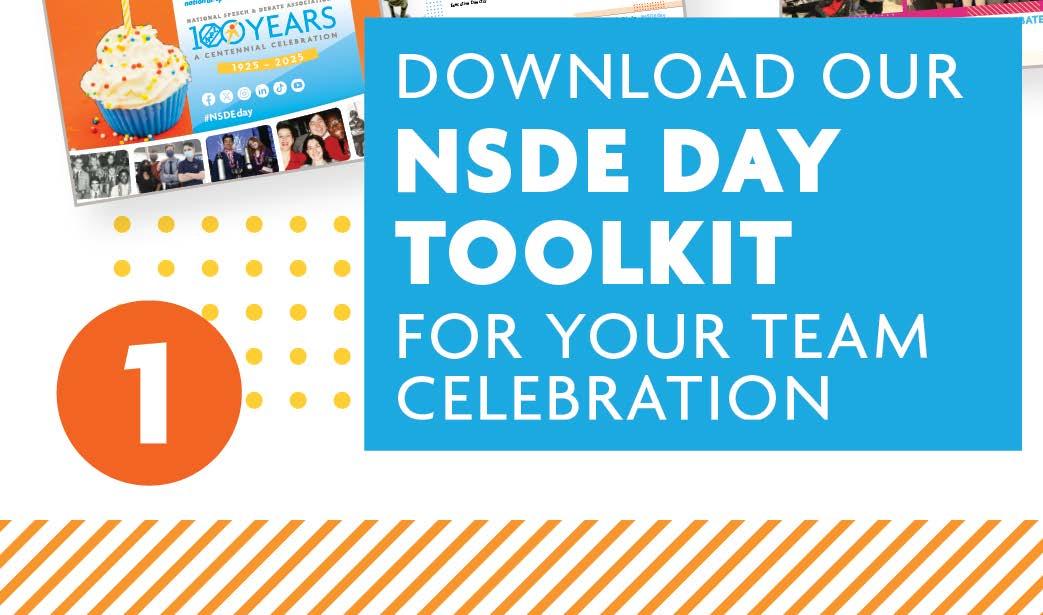
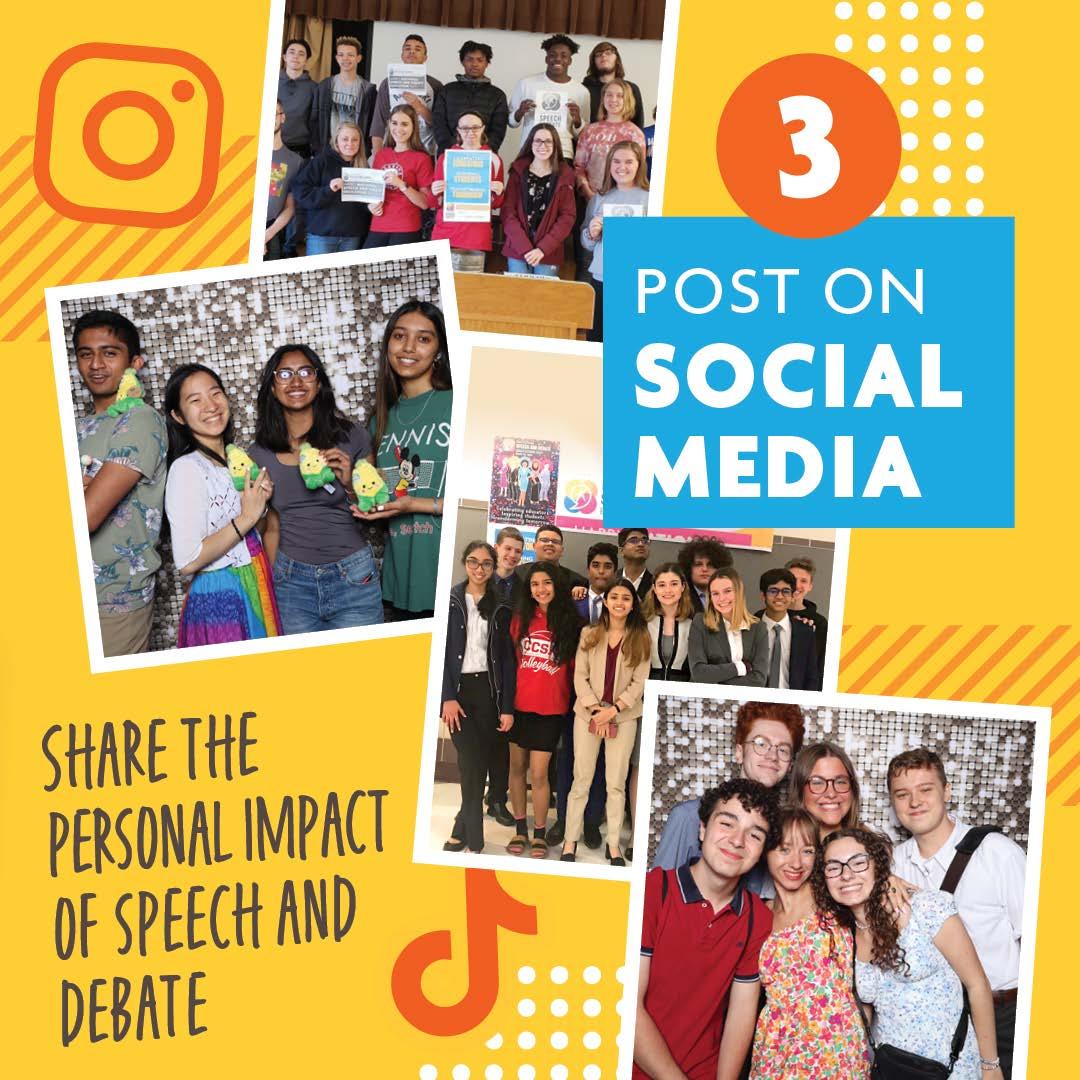
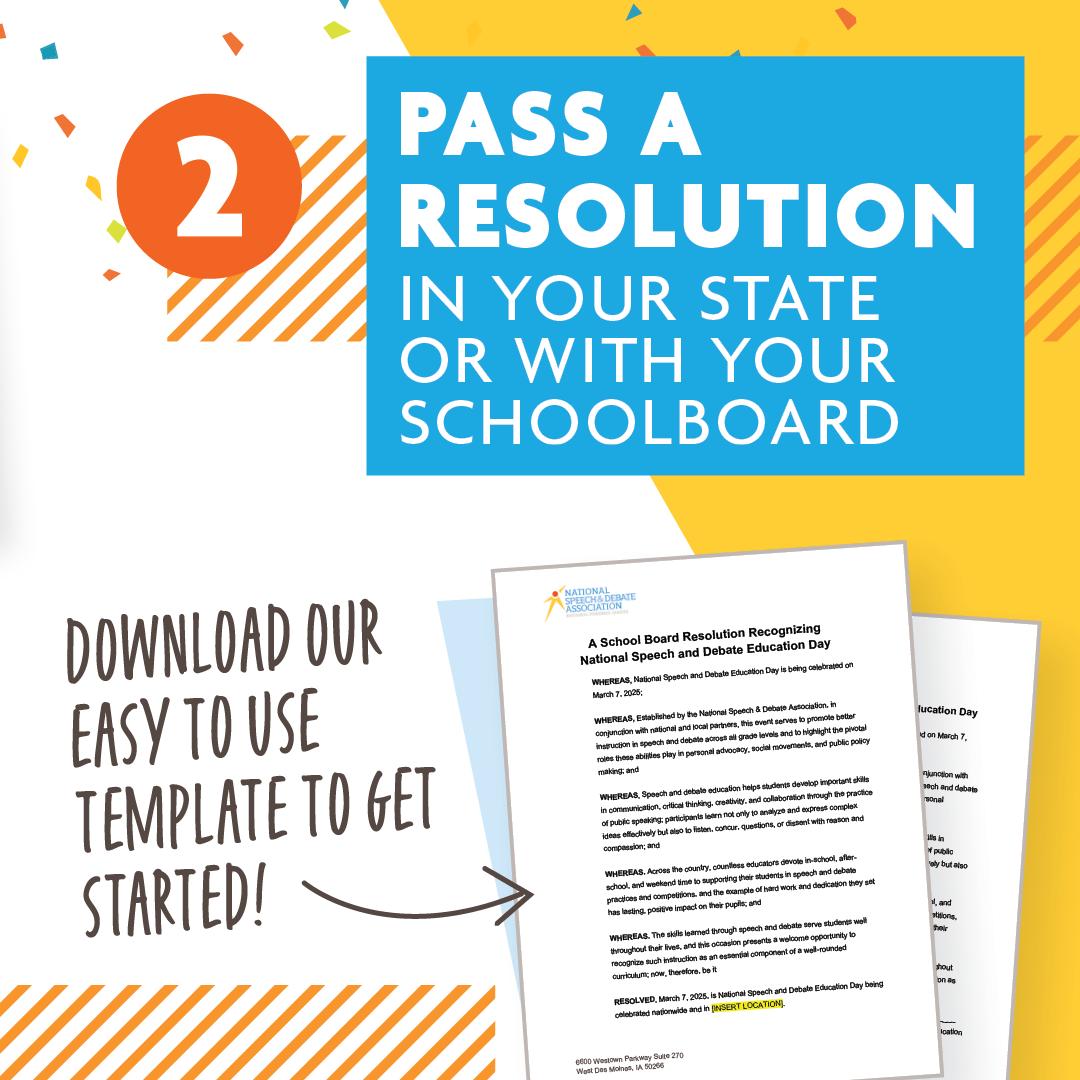
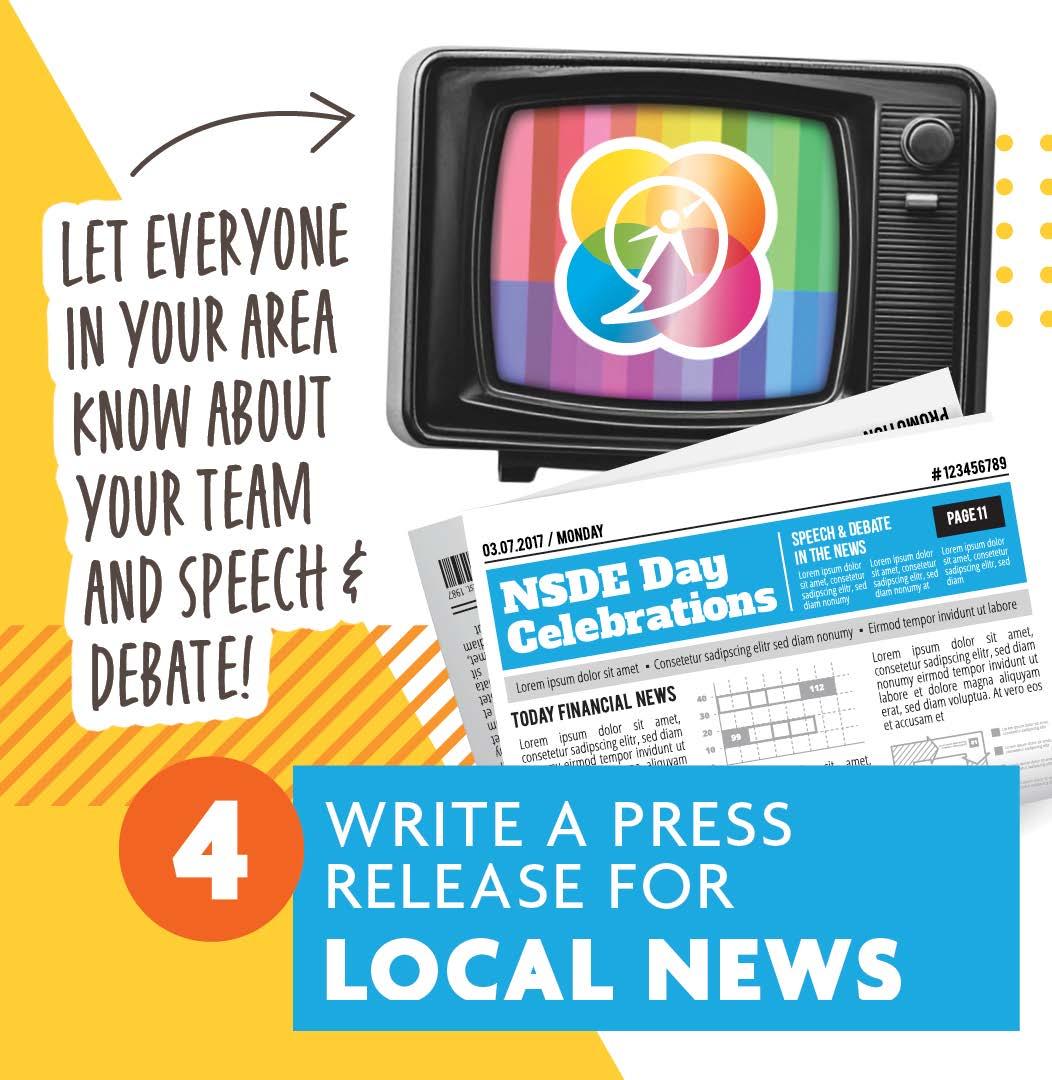
EDUCATION DAY
•MARCH 7, 2025
CELEBRATING EDUCATORS. INSPIRING STUDENTS. TRANSFORMING TOMORROW.
PREP TIMELINE PREP TIMELINE

We have outlined some suggested steps below which will assist you in the development of your participation plans for National Speech and Debate Education (NSDE) Day. Get others involved now so that you can make plans for a great celebration!
STEP ONE
D E C E M B E R – Now is the time to start brainstorming how you want to celebrate and promote NSDE Day.
IDEAS FOR PLANNING:
{ Choose an NSDE Day Captain or Planning Committee.
{ Discuss ideas for celebrating and promoting NSDE Day at your school. Check out the opposite page and download our NSDE Day Toolkit for additional ideas!
{ Review NSDE Day materials at www. speechanddebate. org/national-speechdebate-education-day to determine what additional resources will be necessary for your celebration.
J A N U A R Y – Determine how you are going to promote and celebrate NSDE Day.
IDEAS FOR PLANNING:
{ Find out when the next School Board/ City Council meeting is being held so you can propose a resolution. You can use the template on www. speechanddebate. org/national-speechdebate-education-day or write your own!
{ Plan to hold an event at your school.
{ Set fundraising goals.
{ Order merchandise from the Speech and Debate Store at www. speechanddebate.org/ store
{ Find ways to make an announcement in school publications, announcements, websites, and other sources!
STEP TWO MA R CH 6
F E B R U A R Y – NSDE Day is right around the corner! Use the last few weeks of the month to finalize details.
IDEAS TO PROMOTE:
{ Write articles for local and school publications emphasizing the importance of speech and debate.
{ Write thank you letters to educators, coaches, administrators, and other speech and debate supporters.
{ Customize the Press Release template available online to send to your local media outlets.
{ Plan to use NSDE Day posters, graphics, and other materials around your school.
M A R C H – Use your voice to celebrate speech and debate at your school and across your community.
IDEAS TO PROMOTE:
{ Share your story! Tell us how speech and debate has impacted your life on social media by using the hashtag #NSDEday
{ Celebrate at your school by hanging posters or holding your event!
{ Show us what you’re doing to celebrate the day by tagging us @speechanddebate.
{ HAVE FUN!
Faces in the crowd
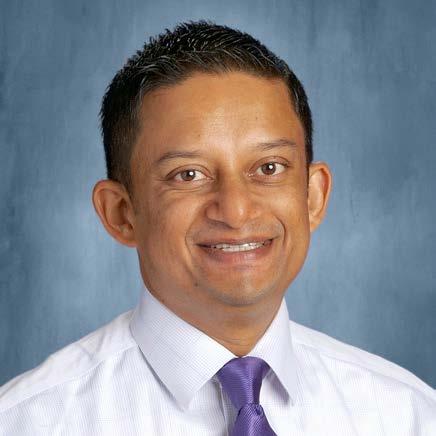
MARTY
DE, M.ED.
Tierra Linda Middle School, California
Marty De is committed to equity and inclusion as he has started programs at four different schools, one of which was a charter school in Los Angeles Unified School District where 40% of students are English Language Learners. He now leads the program at Tierra Linda Middle School, a school that didn’t have a program five years ago. He gives up his evenings and weekends to coach students and chaperone/judge at tournaments and also teaches a speech and debate class during first period every day.
— Nominated by Claire Xing
HELEN FANG
Troy High School, California
Helen Fang led the creation of STEM of Our Humanity ( tinyurl. com/4hs7r95t ), a powerful documentary that explores the quiet divide between STEM and the humanities, especially in highachieving STEM schools. By inviting students and educators to reflect on their experiences, Helen sparked an important conversation about identity, balance, and what we truly value in education. Her work reflects the NSDA’s mission by uplifting overlooked voices and creating space for inclusive dialogue. — Nominated by Wei Wang
We’re thrilled to highlight individuals whose everyday actions embody the NSDA’s core value of equity and help make speech and debate a more inclusive and supportive activity. Through the actions, attitudes, and leadership shown, these stories are a gentle reminder that even in competition, our community is rich with kindness and care. The individuals in this piece were nominated by either their students, teammates, coaches, or members of the speech and debate community. Join us in celebrating these faces in the crowd!
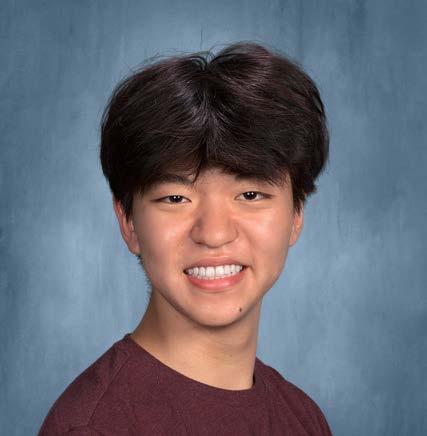
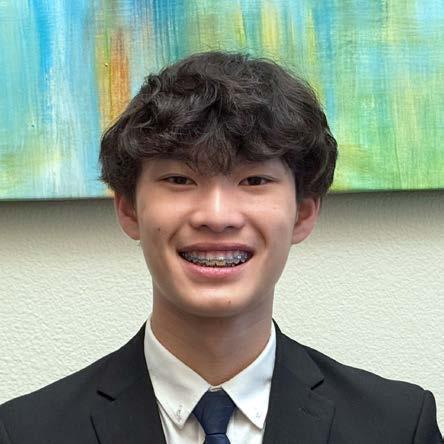
Orange County School of the Arts, California
Valencia High School, California
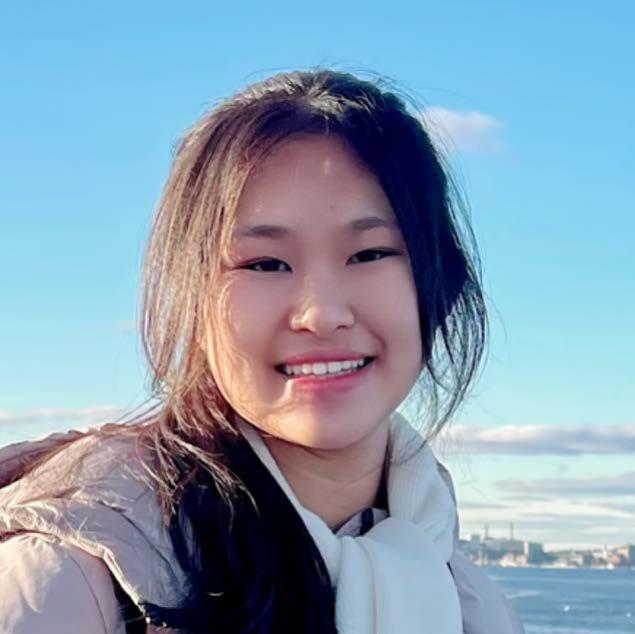
Valencia High School, California
Nathan Han, Eric Chang, and Alisa Chang created Resilience on Record ( tinyurl.com/2jf33r43 ), a student-led documentary that explores what resilience really looks like in speech and debate—not just the trophies, but the tough rounds, self-doubt, and growth that happen along the way. By giving voice to students, coaches, and parents across the country, they built a project rooted in empathy, vulnerability, and community. Their work reflects the heart of what NSDA stands for: connection, courage, and showing up. — Nominated by Wei Wang
PAT LAMARCHE
Sumner Middle School, Maine
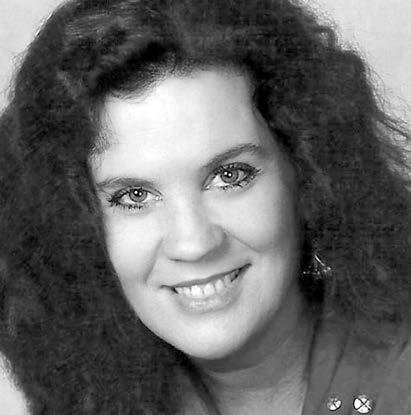
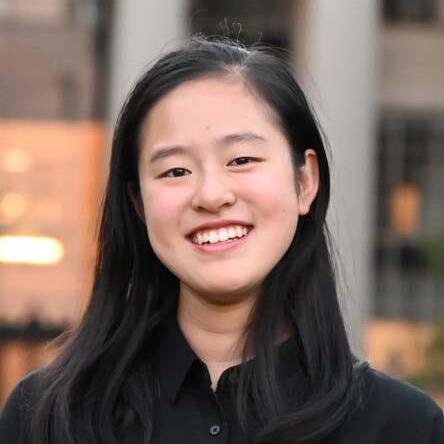
Pat LaMarche has been devoted to speech and debate since her son John Russell started competing back in 2001. Though she’s always lived a minimum of 500 miles from any of the teams her son has coached, she has always gone out of her way to judge for them, even traveling to Nationals to judge on two separate occasions. She works especially hard to be there for historically underrepresented students, as demonstrated by her honorary membership on New Mexico’s Navajo Prep team.
— Nominated by John Russell
Do you know someone who makes speech and debate a more inclusive space? Nominate them today!
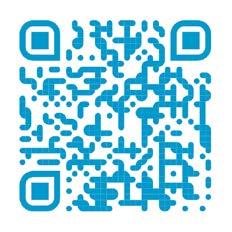
www.speechanddebate.org/ faces-in-the-crowd
NATHAN HAN
ERIC CHANG
ALISA CHANG
This Veterans Day, we salute all who have served their country with courage and honor, including our staff, coaches, leaders, and alumni.
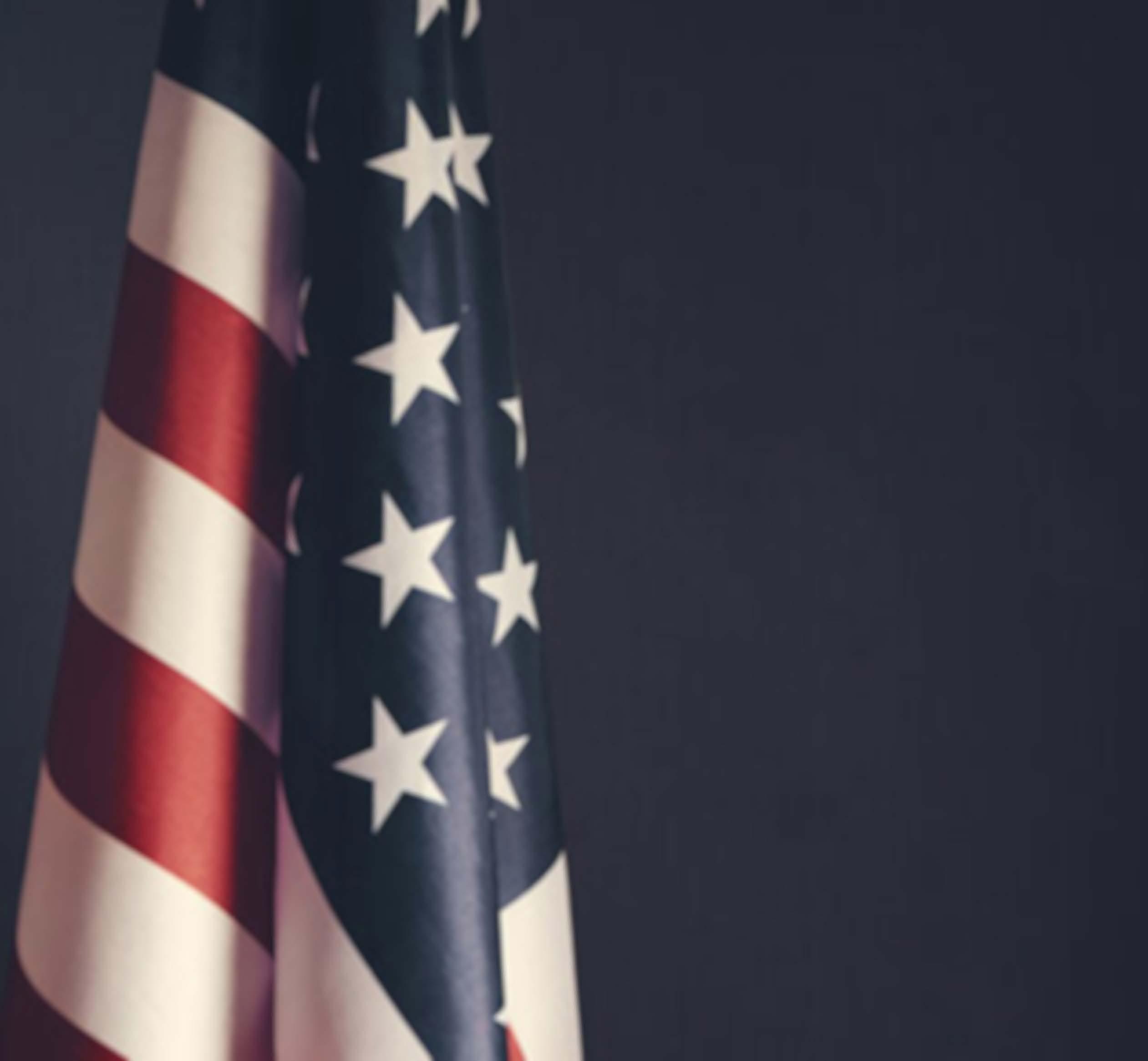
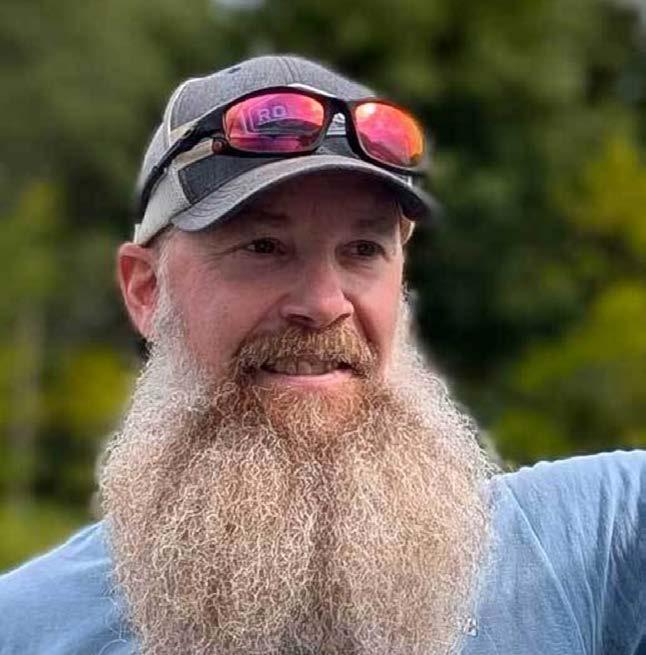
Thank you for your service!
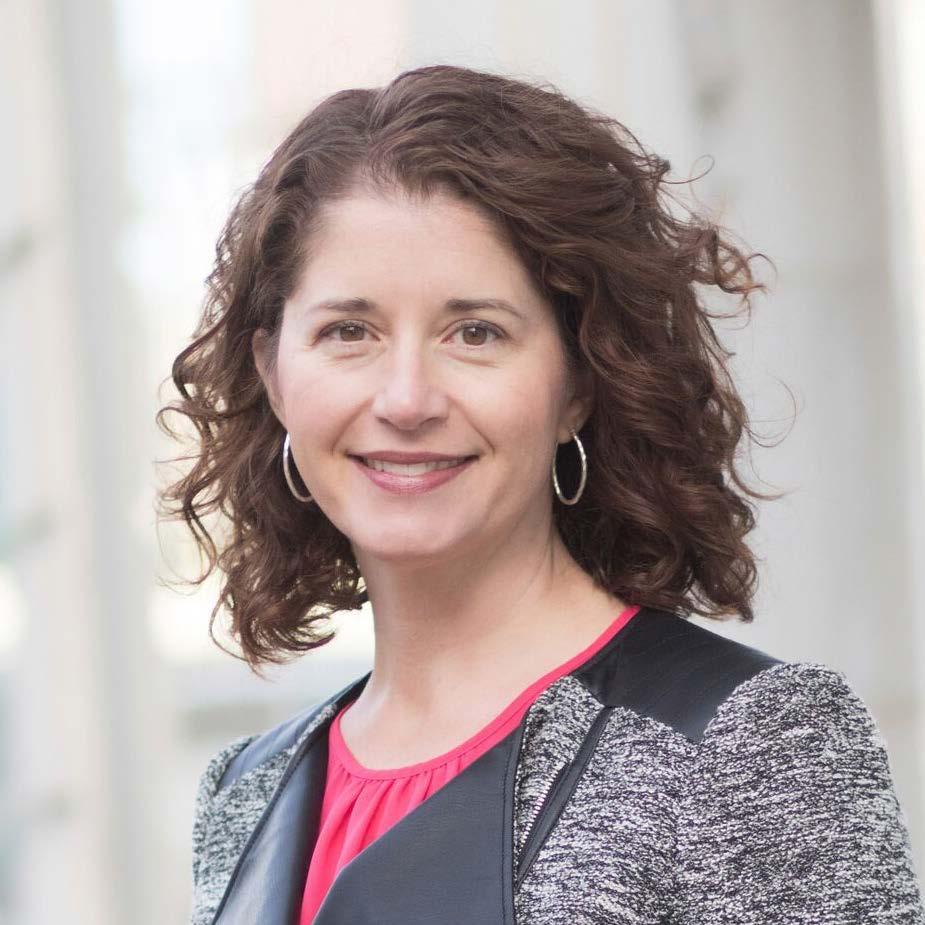
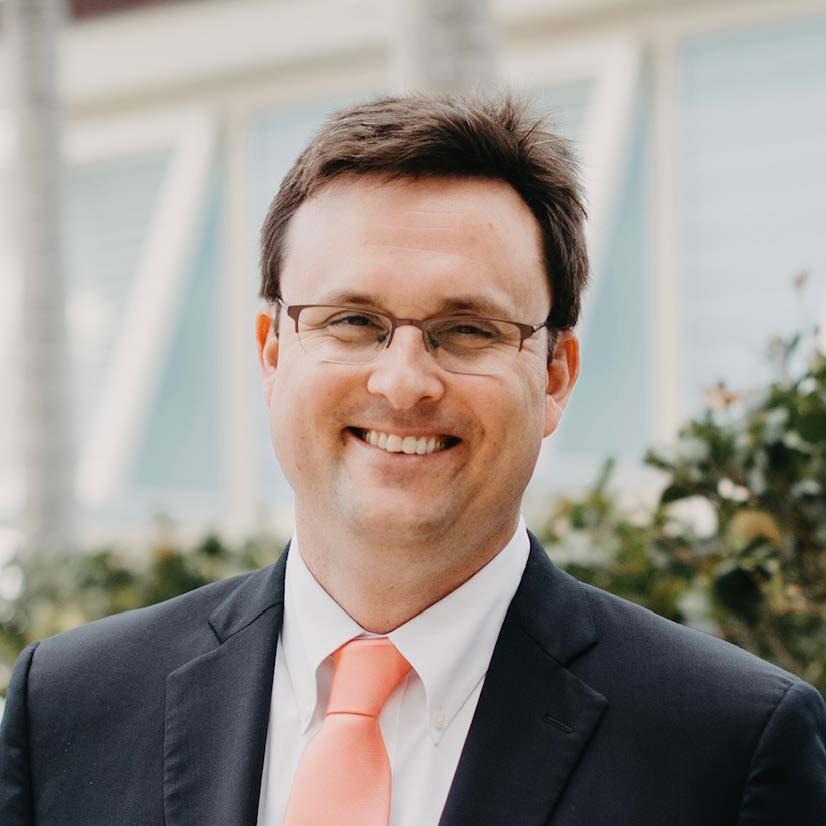
ERIK ALTMAN
NSDA Web Content Specialist
LAURA STEIN NSDA Chief Financial Officer
JOSH SWARTSEL NSDA Board Member
Speech and debate saved my life and helped me develop skills that have given me tremendous opportunities around the world. I added the NSDA to my will to ensure that this life-changing activity will continue for generations to come.”
Chase Williams NSDA COACH
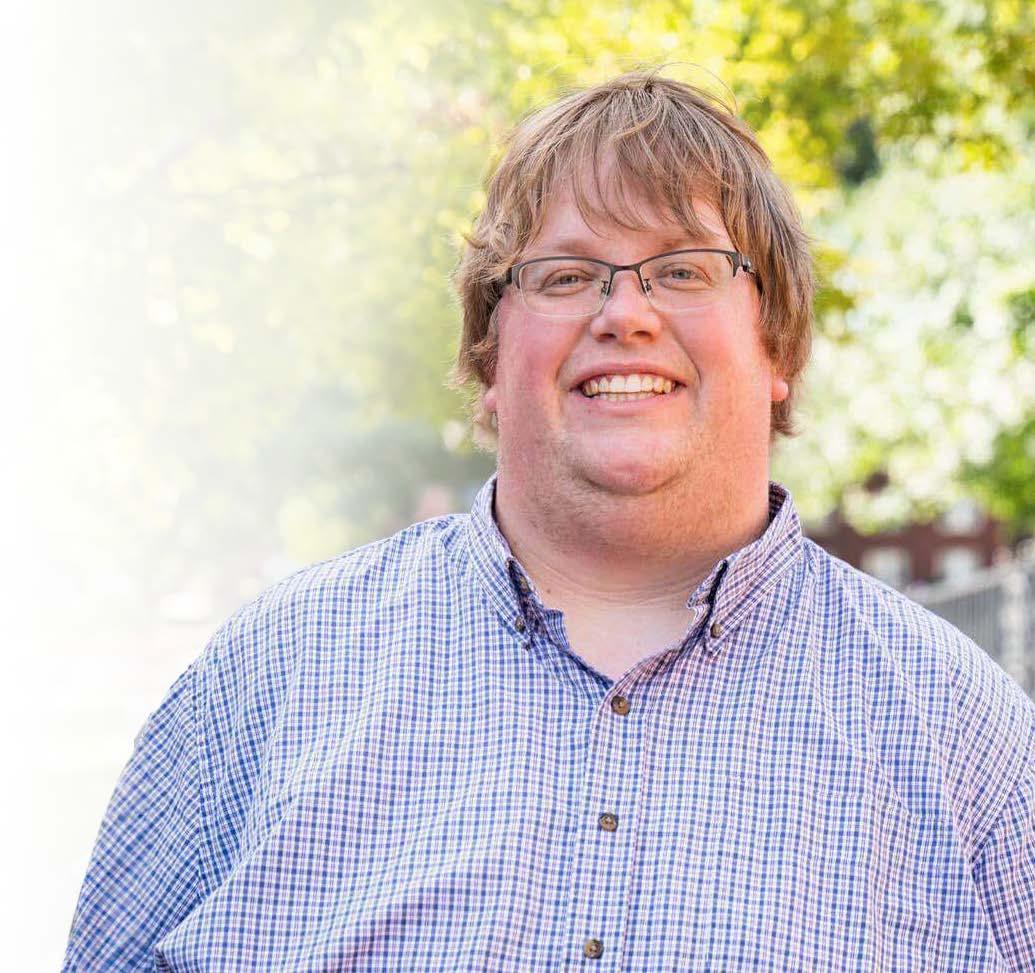
THE SOCIETY 1925
Extend
Your Legacy with the National Speech & Debate Association
A bequest in your estate plan (also known as a planned gift) costs nothing today, but provides sustained support to the National Speech & Debate Association for years to come. It is a powerful way to create a lasting impact.
Ways to Leave a Legacy with the NSDA
y Designate the NSDA as a beneficiary of your retirement or insurance policies
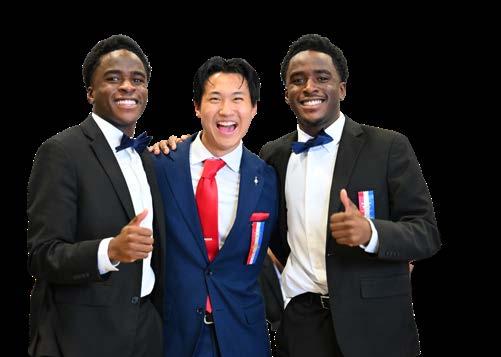
y Make a charitable gift directly from your individual retirement account (IRA)
y Donate appreciated stock to benefit the NSDA’s future
Interested in Joining the 1925 Society?
Utilize FreeWill.com/NSDA . FreeWill is a secure and easy-to-use tool that lets you write your will in about 20 minutes, entirely for free. If you choose, you’ll also have the option to include a legacy gift to the NSDA.
OR – Add a simple paragraph to your will designating the NSDA as a beneficiary. Notify Nicole Wanzer-Serrano (nicole@speechanddebate.org) that the NSDA has been added to your will.

Extending your living legacy through the National Speech & Debate Association
by Tova Prax
We all seek meaningful ways to fill our days and to leave our mark on the world. If you are here reading this, you have already left your mark on the world through your time in speech and debate—through each speech given, each round judged, and each student impacted.
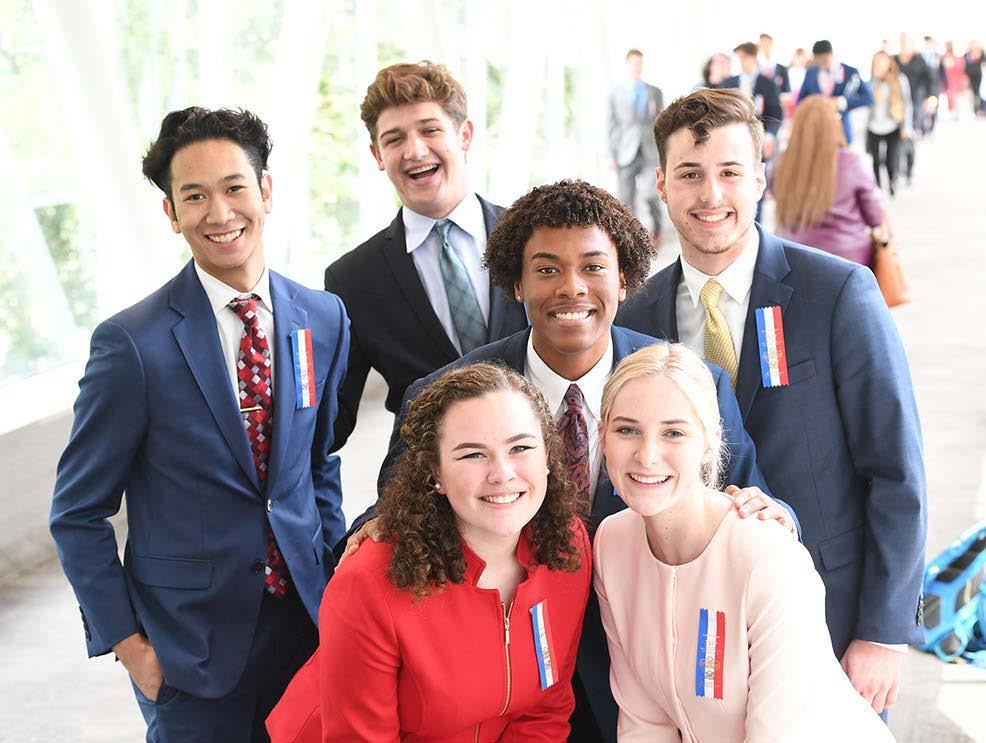
Speech and debate saved my life and helped me develop skills that have given me tremendous opportunities around the world. I added NSDA to my will to ensure that this life-changing activity will continue for generations to come.”
THE BENEFITS OF PLANNED GIVING THE
You know and believe in the power of this activity. Whether you are a school administrator creating a new program, a coach reading this after a long practice, a parent learning your child’s new event, or an engaged alum or supporter, your energy ensures that students today have opportunities to grow through speech and debate. Your mark on society is keenly felt as each speech and debate student goes out into the world and makes it a better place.
Chase Williams
We are grateful to acknowledge the following individuals and families who have chosen to extend their speech and debate legacy by joining the 1925 Society.
Joojin Abaoag
Your Legacy with the
Association
Susan Anderson
Anonymous
Extend
National Speech & Debate
Byron Arthur
Phyllis Flory Barton
Jane Boyd
James Copeland
Don and Ann Crabtree
Rob Dekoven
NSDA COACH
Albert Odom, Jr.
Randi Oleson
J. W. Patterson
Capt. Joseph L. and Jan Pizzo
Zachary and Tova Prax
A bequest in your estate plan (also known as a planned gift) costs nothing today, but provides sustained support to the National Speech & Debate Association for years to come. It is a powerful way to create a lasting impact.
Dr. Mike Edmonds
A. C. Eley
Vickie and Joe Fellers
Your work today shapes our society—you can extend that legacy far into the future through planned giving. Also called legacy giving, planned giving offers a way to maximize your contributions, extending them beyond your lifetime. Commonly established when filling out a retirement beneficiary form or writing a will, planned giving allows individuals the opportunity to include an organization as a beneficiary or recipient of a part of their estate after their death. Planned giving is a powerful way to ensure lasting support for organizations and causes you care about.
y Donate appreciated stock to benefit the NSDA’s future
Brian Presnall
David Price
Dr. Polly and Bruce Reikowski
Donus and Lovila Roberts
SOCIETY
James Rye, III
Steve and Anna Schappaugh
David Seikel
Ways to Leave a Legacy with the NSDA
Aaron Hardy
Bill and Charlotte Hicks
David and Judy Huston
Jennifer Jerome
y Make a charitable gift directly from your individual retirement account (IRA)
Harold Keller
Kandi King
Cherian and Betsy Koshy
Paige Lalicker
Michael Shapiro
Sandra Silvers
Yatesh Singh and Liz Vieira
Thadeus Hagan Smith
Richard Sodikow
Designate the NSDA as a beneficiary of your retirement insurance policies
Bob and Salli Stockton
William Woods Tate, Jr.
Interested in Joining the 1925 Society?
Crawford Leavoy and Clayton Alfonso
Dr. Tommie Lindsey, Jr.
Aarzu Maknojia
Scott and Chan Waldrop
Nicole and Darrel Wanzer-Serrano
Utilize FreeWill.com/NSDA . FreeWill is a secure and easy-to-use tool that lets you write your will in about 20 minutes, entirely for free. If you choose, you’ll also have the option to include a legacy gift to the NSDA.
Pam and Ray McComas
H. B. Mitchell
Athena Murray
Lanny and B. J. Naegelin
Cheryl Watkins
Dr. Sue Wenzlaff
Abigail Wichlacz
Chase Williams
OR – Add a simple paragraph to your will designating the NSDA as a beneficiary. Notify Nicole Wanzer-Serrano (nicole@speechanddebate.org) that the NSDA has been added to your will.
Khang Minh Ngo
J. Scott and Megan Wunn
Joe and Pam Wycoff
David and Tatiana Yastremski
We joined the 1925 Society to help ensure that our living legacy continues on for our son well into the future.
Zachary
Tova Prax
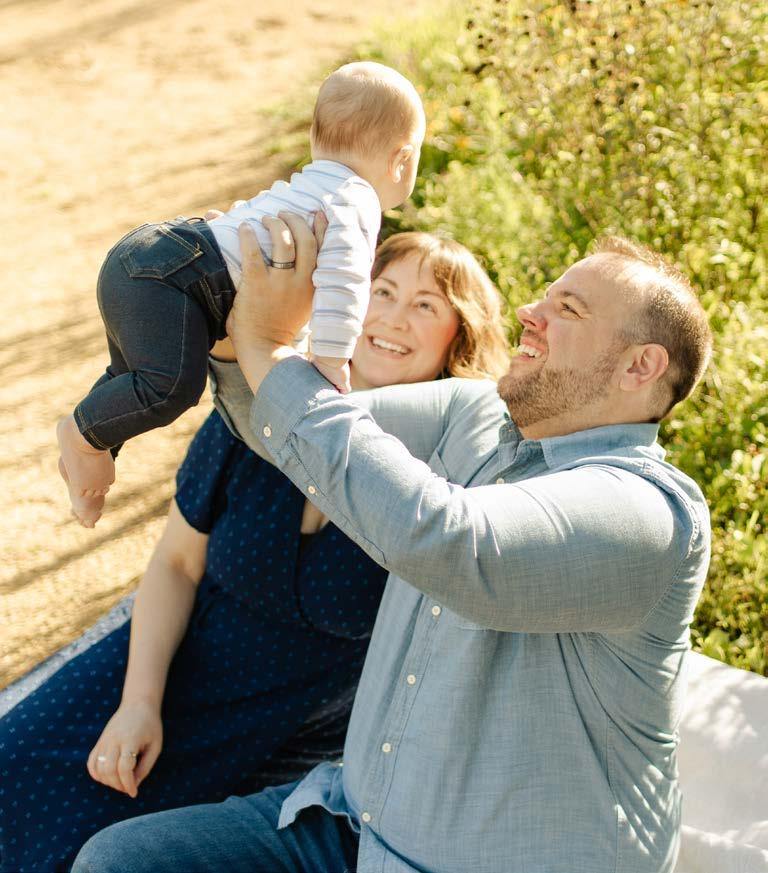
THE SOCIETY 1925
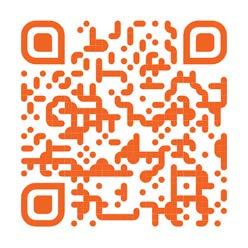
The NSDA celebrates individuals who have chosen to leave a planned gift in the 1925 Society, our legacy giving society founded in 2016. NSDA Board members, Hall of Fame members, coaches, alumni, and other supporters have joined, making a strong statement that those who have been dedicated to this activity in the past and present are the strongest champions for ensuring its future. Speech and debate might not exist today without the tremendous support from these individuals. Their legacies will remain present and active for years to come as students find their place and tap into their potential through speech and debate.
As someone who did not participate in speech and debate in high school, my fear of public speaking lives on to this day. Working at the NSDA, I often find myself marveling at the talented students who speak boldly with poise and confidence, articulating creative ideas and thoughtful solutions while being completely undeterred by the presence of an audience.
Now, I’m married to a speech and debate coach and educator of 20+ years. After the birth of our son this year, my husband and I felt an urgent need to update our wills. Not only do we want to support student empowerment opportunities during our lifetimes, we want to ensure that even in our absence, our son lives in a world with people who speak kindly, who leverage critical thinking skills, and who tackle complex challenges collaboratively. We know that any amount of support can make a lasting difference, and that even one student impacted matters. We joined the 1925 Society to help ensure that our living legacy continues on for our son well into the future.
If you would like to extend your legacy through a planned gift, please feel free to reach out. We would be honored to hear more about your speech and debate story, answer any questions about the 1925 Society, and discuss how the NSDA can best ensure that your legacy is carried forward in your stead.
Learn more about how to extend your legacy with the NSDA by visiting our website or reach out to nicole@speechanddebate.org for more information.
Tova Prax serves as Development Manager at the NSDA.
and
photo credit: Jenna Paulson Photography
2024-2025 TOP 100 SCHOOLS
We’re proud to announce the Top 100 Schools for the 2024-2025 school year! (Please note ties.) Each year, the 100 chapters with the largest number of new degrees in the National Forensic League Honor Society receive the Top 100 Schools designation. Visit www.speechanddebate.org/school-recognition for details.
1. The Bronx High School Of Science, NY
2. Regis High School, NY
3. Millard North High School, NE
4. Shawnee Mission East High School, KS
5. Leland High School, CA
6. George Washington High School, CO
7. Flower Mound High School, TX
8. Eagan High School, MN
9. Eastview High School, MN
10. Gabrielino High School, CA
11. Lexington High School, MA
12. Cherry Creek High School, CO
13. Bellarmine College Prep, CA
14. North Allegheny High School, PA
15. Washburn Rural High School, KS
16. Aberdeen Central High School, SD
17. Archbishop Mitty High School, CA
18. Ransom Everglades School, FL
19. Lincoln East High School, NE
20. Seven Lakes High School, TX
21. Pembroke Hill School, MO
22. Palo Alto High School, CA
23. American Heritage School - Broward, FL
24. Ridge High School, NJ
25. Lawrence Free State High School, KS
26. Westwood High School, TX
27. Edina High School, MN
28. James Logan High School, CA
29. Newton South High School, MA
30. Strake Jesuit College Preparatory, TX
31. Jefferson City High School, MO
32. Jenks High School, OK
33. Blue Springs High School, MO
34. Marist School, GA
35. Cabot High School, AR
36. Highland High School, ID
37. BASIS Peoria, AZ
38. Lake Highland Preparatory School, FL
39. Cheyenne East High School, WY
40. Blue Springs South High School, MO
41. Plano East Senior High School, TX
42. East Ridge High School, MN
42. Liberty North High School, MO
44. Lee’s Summit North, MO
45. Stephen F. Austin High School, TX
46. CR North High School, PA
47. Central High School, MO
48. Cary Academy, NC
49. Denver East High School, CO
50. Riverside High School, SC
51. Munster High School, IN
51. Upper St. Clair High School, PA
53. Arizona College Prep High School, AZ
54. Greenhill School, TX
55. Shrewsbury High School, MA
56. Interlake High School, WA
57. Dublin Jerome High School, OH
58. Perry High School, OH
59. Rock Bridge High School, MO
60. Hinsdale Central High School, IL
61. Lakeville North High School, MN
62. Syosset High School, NY
63. Coppell High School, TX
64. Colegio Bilingue New Horizons, FL
65. Lincoln Southwest High School, NE
66. Willard High School, MO
67. Taipei American School, Taiwan
68. Jordan High School, TX
69. The Harker School, CA
70. Flintridge Preparatory School, CA
71. Lee’s Summit West High School, MO
72. Pittsburg High School, KS
73. Bozeman High School, MT
74. Roosevelt High School, SD
75. Hawken School, OH
76. Liberty High School, MO
77. Flathead High School, MT
78. Eden Prairie High School, MN
78. The Potomac School, VA
80. Monta Vista High School, CA
80. Bolivar High School, MO
82. Glacier High School, MT
83. Pennsbury High School, PA
84. Los Altos High School, CA
84. Penn High School, IN
84. Topeka High School, KS
84. Summit High School, NJ
88. Monte Vista High School, CA
88. Neosho High School, MO
90. Blackfoot High School, ID
91. Apple Valley High School, MN
92. The Quarry Lane School, CA
93. West Fargo Horace HS, ND
94. College Prep, CA
95. Notre Dame Preparatory School, MI
96. American Heritage Schools, Palm Beach Campus, FL
97. Alhambra High School, CA
97. Moorhead High School, MN
99. Rigby High School, ID
100. Rockhurst High School, MO
100. Solon High School, OH
LEGACIES THAT ENDURE
As our Centennial Celebration draws to a close, we take a moment to honor the individuals whose legacies live on through a range of prestigious eponymous events and awards within the National Speech & Debate Association. Learn more about these remarkable coaches, alumni, supporters, and civic leaders!
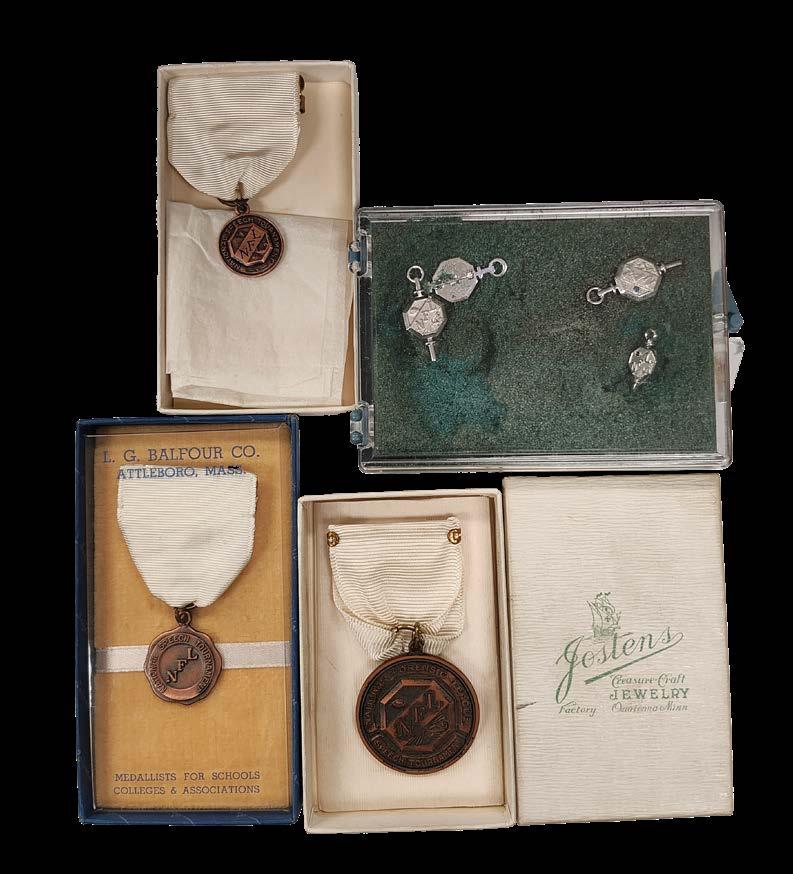
of speech and debate. They each received a gold key at the sixth National Tournament in Oklahoma City.
The Board set a new limit of 500 charter chapters. A waiting list of schools was established.
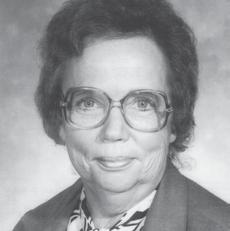
Phyllis Flory Barton
Top Speaker Award
The top high school Policy Debate speaker is recognized annually at the National Tournament. The trophy is named in honor of one of debate’s great coaches, Phyllis Flory Barton of Ohio. She coached a national championship debate team in both the NSDA and the NCFL tournaments, and upon her death, her students and colleagues endowed the Phyllis Flory Barton Top Speaker Award.
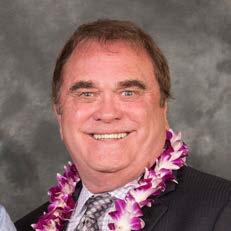
Ted W. Belch
Ted W. Belch Award
Each year, the Ted W. Belch Award is presented to the coach of the national champion high school Policy Debate team. The award is named after legendary fivediamond Hall of Fame coach and former NSDA Board Vice President Ted Belch of Illinois—the most successful high school Policy Debate coach of all time.

Ralph E. Carey
Award for Distinguished Career Service
This highest honor for NSDA district chairs is named after the late Ralph E. Carey, a three-diamond Hall of Fame coach and longtime district chair from South Florida. The career award is endowed by a generous bequest from his estate.
Dean Ralph
Karl E. Mundt from South Dakota, a fundamental leader in establishing the National Forensic League, was elected NFL Board President.
Karl E. Mundt, South Dakota
A collection of vintage insignia
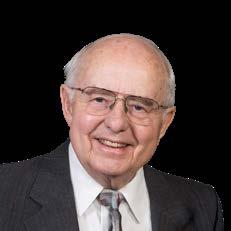
James M. Copeland
High School Coach of the Year Award
In his own words, James Copeland “bridged two generations,” having met NSDA founder Bruno Jacob as a student contestant in 1957, later earning success as an acclaimed debate coach, and ultimately serving as the Association’s Executive Secretary from 1985 to 2003. Today, the James M. Copeland High School Coach of the Year Award annually honors high school coaches who reflect outstanding leadership and commitment to speech and debate activities.
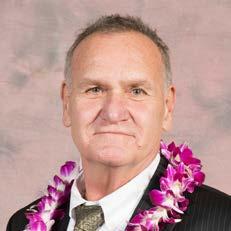
Don Crabtree
Distinguished Service Award
Coaches who perform service for the NSDA, such as hosting tournaments, writing or presenting about the Association, recruiting a new chapter school, or writing an article for Rostrum, earn service citations. Those who earn 20 citations are given a special gold key. Those who receive an additional 50 citations are presented with a bronze plaque. In 2018, the awards were named in honor of Don Crabtree of Missouri—former NSDA Board President, 10-diamond coach, Hall of Fame member, and service citation record holder.
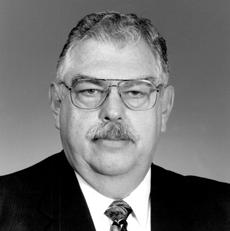
A. C. Eley
International
Extemporaneous Speaking
The late A. C. Eley, a six-diamond coach from Kansas, was celebrated for his remarkable coaching success as well as his philanthropy. He was inducted into the NSDA Hall of Fame in 1994 and later gifted funds to the Association to sponsor International Extemporaneous Speaking at the National Speech & Debate Tournament.
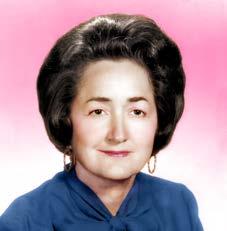
United States
Extemporaneous Speaking
At the National Tournament, United States Extemporaneous Speaking is named in honor of Hall of Fame coach Carmendale Fernandes of California. She served as the NSDA’s first female Board President and was triumphed as a coach, teacher, and leader who inspired multiple generations of female students to engage in an activity that valued their intellect and diligence.
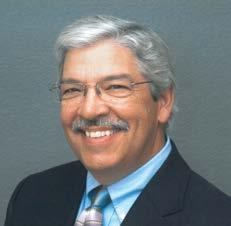
David Huston
Final Round Judge Pin
In 2025, the NSDA introduced the David Huston Final Round Judge Pin, which honors judges who exemplify the spirit and dedication of our activity. The commemorative pin is named for NSDA Board Vice President and five-diamond Hall of Fame coach David Huston of Texas.
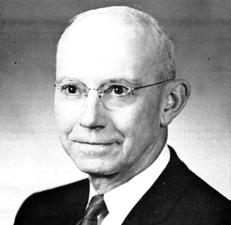
Bruno E. Jacob
Bruno E. Jacob / Pi Kappa Delta Trophy
Named after the founder of the National Speech & Debate Association, the NSDA’s top trophy is awarded to the school that has earned the greatest number of cumulative rounds in main events at the National Speech & Debate Tournament. The award is endowed by Pi Kappa Delta, the oldest national collegiate forensic honorary.
Bruno Commendation
If more than 50 percent of the points necessary for the procurement of the Bruno E. Jacob Trophy were gained under the direction of one instructor, that coach receives a special award in recognition of their service in effective speech and debate education.
Carmendale Fernandes
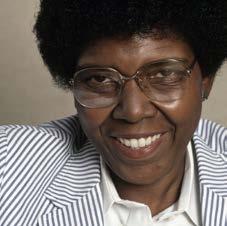
Rep. Barbara Jordan
Congressional Debate –House Final Session
At the National Speech & Debate Tournament, the final round of the House is named in Rep. Barbara Jordan’s honor. Barbara was a member of the inaugural class at Texas Southern University, where she later joined the debate team. In 1972, she was elected to the U.S. House of Representatives, the first woman elected to represent Texas in the House.
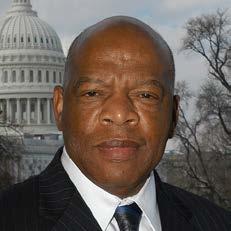
Rep. John R. Lewis
Lewis Medallion
Rep. John Lewis was an American civil rights activist and statesman who served in the United States House of Representatives for Georgia’s 5th congressional district from 1987 until his death in 2020. At the National Speech & Debate Tournament, all high school final round participants in Congressional Debate receive commemorative Lewis Medallions in honor of his legacy.
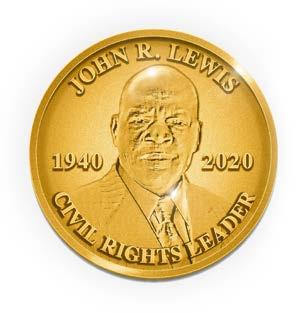
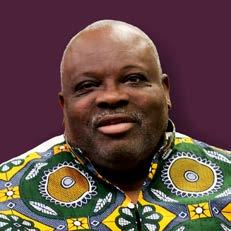
Dr. Tommie Lindsey, Jr.
Duo Interpretation
At the National Tournament, Duo Interpretation is named in honor of seven-diamond Hall of Fame coach
Dr. Tommie Lindsey, Jr. He is the first African American elected to the NSDA Board of Directors and served for 20 years, most recently as Vice President. As the longtime coach at James Logan High School in California, Tommie’s philosophy has always been to “recognize that every child has a voice, and to work insatiably to create an environment where they discover the skills necessary to develop it.”
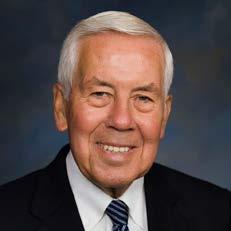
Sen. Richard Lugar
Congressional Debate –Senate Final Session
At the National Tournament, the final round of the Senate is named in Sen. Richard Lugar’s honor. Richard attended Shortridge High School in Indiana. He served as a United States senator, representing Indiana from 1977 to 2013. During his tenure, he was Chairman of the Senate Committee on Foreign Relations, serving as the ranking member of the committee from 2007 until his departure in 2013.
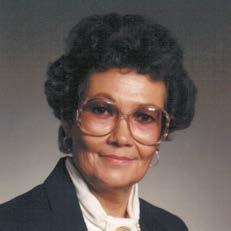
Dale Lauder McCall
Lincoln-Douglas Debate Top Speaker Award
The top high school speaker in Lincoln-Douglas Debate is recognized annually at the National Tournament, presented in honor of six-diamond Hall of Fame coach Dale Lauder McCall of Florida. When LincolnDouglas was created, Dale was one of the biggest supporters of the new debate event. Her expertise helped define its rules and develop best practices for teams to succeed.
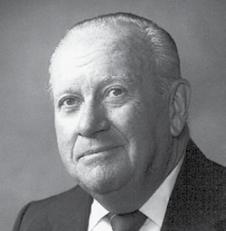
Harland B. Mitchell
Harland B. Mitchell Trophy
The high school Policy Debate national champion team receives the Harland B. Mitchell Trophy, named after the Association’s legendary Hall of Fame debate coach from Oklahoma. During his extensive 39-year career, Harland coached 18 state debate champions, three national debate champions, three national debate runners-up, and a national champion in Extemp.


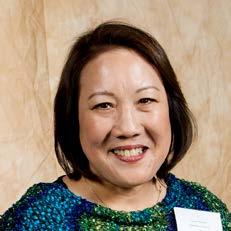
Karen Miyakado
Hawaiian Lei Tradition
For many years, the NSDA has presented Hawaiian leis to every national champion. In 2025, this portion of the National Awards Assembly was named the Karen Miyakado Hawaiian Lei Tradition after the beloved two-diamond Hall of Fame coach from Hawaii, recognizing the legacy of aloha spirit these leis have brought over the years.
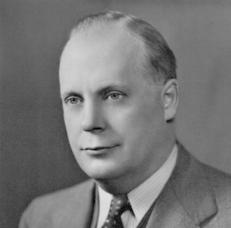
Karl E. Mundt
Karl Mundt Trophy
Awarded since the first National Student Congress in 1938, the Karl Mundt Trophy is presented to the school with the largest number of cumulative participation points in Congressional Debate at the National Tournament. Karl Mundt served as a member of the U.S. Congress, representing South Dakota in both the House of Representatives (19391948) and the Senate (1948-1973). Throughout his lifetime, he was a devoted advocate, active participant, and committed coach of speech and debate. He served as President of the National Forensic League (1932-1971) and was inducted into the Hall of Fame founding class in 1978.
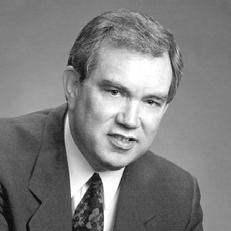
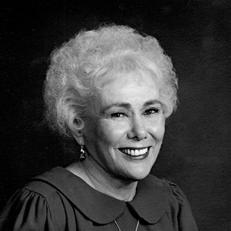
Lanny D. and B. J. Naegelin
Dramatic Interpretation
At the National Tournament, Dramatic Interpretation is named in honor of two esteemed Hall of Fame coaches from Texas, Lanny Dean and Billy Jean Naegelin. Fondly referred to as “Team Naegelin,” Lanny and B. J. were inducted into the NSDA Hall of Fame in 1988 and 2001, respectively. Today, the Naegelin Memorial Fund continues to support the dramatic event they treasured.
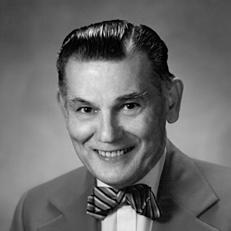
Odom Commendation
The Odom Commendation is presented annually to the coach of the school receiving the coveted Bruno E. Jacob / Pi Kappa Delta Trophy. Albert Odom coached at Albany High School in New York, the first chapter in the inaugural National Forensic League. Albert later moved to Wisconsin where he served as Assistant Executive Secretary for 30 years and Associate Secretary Emeritus for another 10 years.
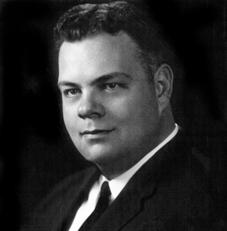
Thomas Glenn Pelham
Pelham Commendation
Glenn Pelham served as the director of the Barkley Forum at Emory University for more than 13 years. He believed so strongly in recognizing educators who worked tirelessly to provide speech and debate opportunities to college and high school students that he established this award in his will. The Pelham Commendation has been given annually since 1990 and is endowed by the Barkley Forum for Debate, Deliberation, and Dialogue at Emory University.
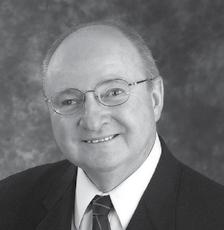
Donus D. Roberts
Public Forum Debate
Starting in 2026, Public Forum Debate at the NSDA National Tournament will be named in honor of Donus D. Roberts. A renowned Hall of Fame coach from South Dakota, Donus has been a longtime proponent of the Public Forum debate format since its creation in 2002.
Coaching Excellence Award
During his tenure, Donus has earned an impressive 11 Diamond Awards! NSDA coaches receive one point for every merit point earned by their students through competition, service, and leadership activities until they earn 10,000 points and the Donus D. Roberts Coaching Excellence Award. Once coaches earn 15,000 points and have been members for at least five years, they receive their First Diamond Award.
Albert S. Odom
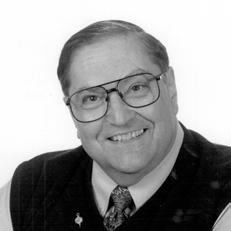
Frank Sferra
Director’s Commendation
The Director’s Commendation is awarded annually for outstanding contributions by a coach. The award is named after Frank Sferra, a longtime Hall of Fame coach from Colorado. During his lifetime, Frank was a fierce champion of all speech and debate programs. He had a passion for providing assistance to all with a vision for building the activity.
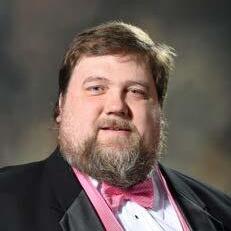
Timothy E. Sheaff
National Tournament Final Round Stage
Tim Sheaff loved being the National Tournament awards emcee. He loved awarding excellence. He loved being the voice. But, above all, he loved what this all symbolized: an organization and a mission that he loved— deeply. To honor the legacy of this former NSDA Board member and five-diamond Hall of Fame coach from Iowa, the final round stage in Des Moines was dedicated in Tim’s honor in 2024 and 2025.

Robert Shrum
Robert Shrum Award
The top speaker award presented at the World Schools Debate Invitational is named after Robert Shrum—legendary attorney, speechwriter, columnist, political consultant, NSDA alum, and outstanding debater at the 1965 Collegiate National Debate Tournament.
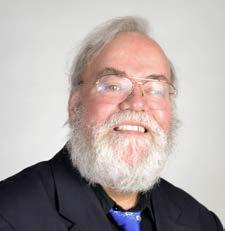
Dr. Alfred “Tuna” Snider
Championship Plaque
At the conclusion of the World Schools Debate Invitational, the winning high school team receives the Dr. Alfred “Tuna” Snider Championship Plaque. A former coach from the University of Vermont, Dr. Snider conducted formal debate training in more than 40 countries and trained debaters from more than 55 nations.
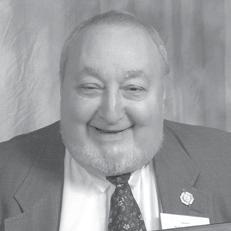
Richard B. Sodikow
Policy Debate
At Nationals, Policy Debate is named in honor of the late Richard B. Sodikow— former NSDA Board member and sevendiamond Hall of Fame coach of New York. Richard coached the largest debate program in the U.S. during his time, often finishing among the nation’s top 10 teams. He believed everything was debatable and every student had a right to debate.
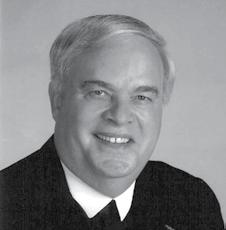
Brother Gregory “René” Sterner, FSC
Lifetime Service Award
This award honors individuals who have dedicated their life to the activity of forensics through true service to the National Speech & Debate Association. The award is named after one of the NSDA’s greatest servants, and its inaugural winner, Brother René Sterner. Brother René was a former NSDA Board member and six-diamond Hall of Fame coach from Pennyslvania.
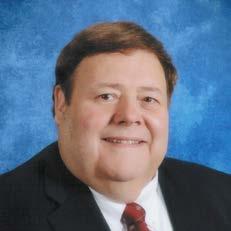
William “Billy” Woods Tate, Jr.
National Student of the Year
Each year, coaches may nominate a graduating senior who best represents the tenets of the NSDA’s Code of Honor: humility, equity, integrity, respect, leadership, and service. Finalists interview with an esteemed panel, and the winning student is announced during the National Awards Assembly. This prestigious award is named in honor of the late Billy Tate, former NSDA Board President and five-diamond Hall of Fame coach from Tennessee.
Road to Nationals Fund
The Road to Nationals Fund, founded by the William Woods Tate, Jr., Memorial Fund, is designed to help students attend the high school National Tournament. The Road to Nationals Fund provides financial assistance to schools that lack financial resources.
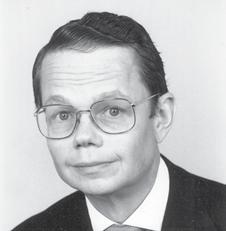
James J. Unger
The Unger Cup
This annual award, endowed in honor of one of America’s finest debaters and coaches, former Georgetown Professor and Director of Forensics James Unger, is awarded to the high school Policy Debate school that has placed the highest cumulatively in the five great national debate tournaments: the NSDA National Tournament; the NCFL Grand Debate Tournament; the University of Kentucky Tournament of Champions (TOC); the NAUDL Urban Debate National Championship Tournament; and the National Debate Coaches Association (NDCA) Debate Tournament. An antique silver, three-handled loving cup, created by Tiffany at the turn of the century, remains at the national office with a professionally designed base honoring all of the recipients.
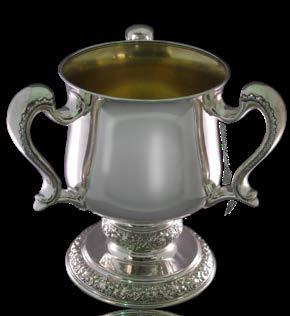
Explore more history on our website! w ww.speechanddebate.org/ centennial-timeline
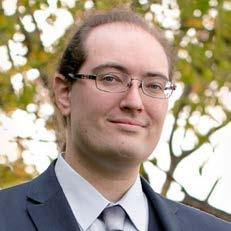
Keith West
Keith West Memorial School Grants
Keith West dedicated his life to coaching and teaching youth in the ways of argumentation and debate. He believed that speech and debate could unleash a student’s true potential. In order to ensure more students have access to speech and debate, the Keith West Memorial School Grant provides grants to schools that show strong potential, but a significant lack of financial resources.
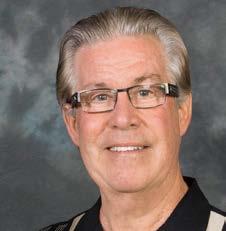
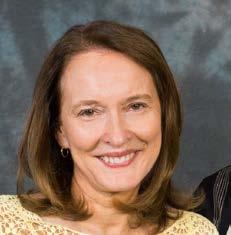
Joe and Pam Wycoff
Original Oratory
In 2016, the NSDA named Original Oratory at the National Tournament after Joe and Pam Wycoff in response to their incredible influence on the direction of the event with successful students. Joe, a four-diamond coach, and Pam, an eight-diamond coach, were inducted into the NSDA Hall of Fame in 1992 and 2007, respectively. Pam served on the NSDA Board of Directors for 20 years, most recently as President.
The highest honor for any high school speech and debate coach is election to the National Speech & Debate Association Hall of Fame.
Each year, nominations are sought from NSDA member coaches.




Individuals with 25 years of NSDA coach membership prior to the start of the National Tournament, or who are retired from coaching and teaching, are eligible for this prestigious award.
In addition, a Hall of Fame Legend is a coach or non-coach adult who is worthy of consideration for this high honor. Any coach, student, alum, or speech and debate supporter may nominate an individual for consideration.
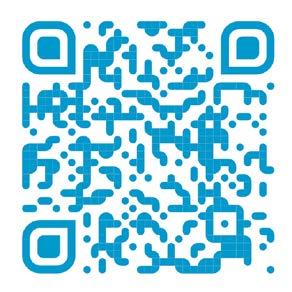
Visit our website to learn more about the dedicated individuals who have been inducted into the Hall of Fame over
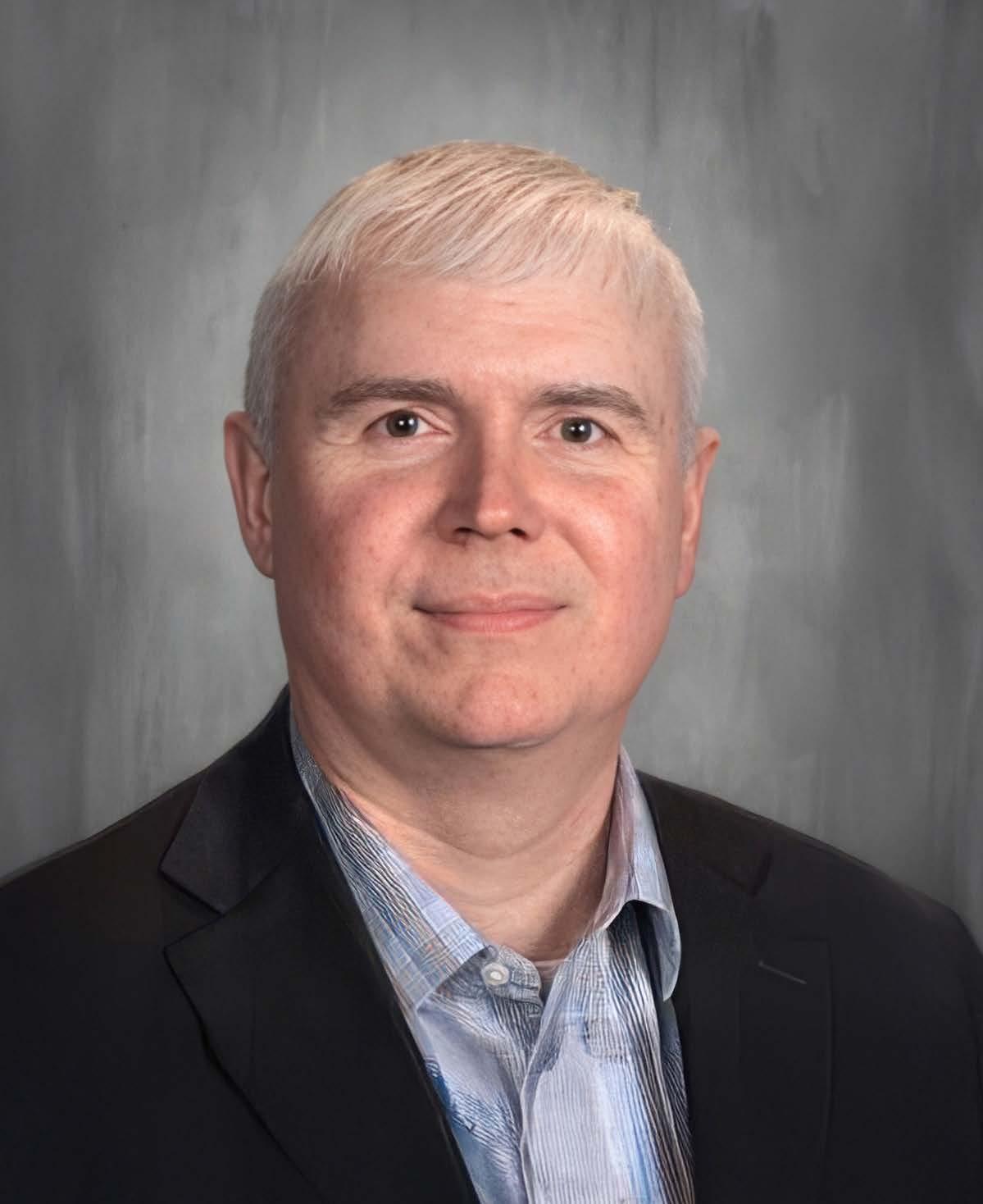
Dear Colleagues,
I am privileged to write this letter in strong support of the speech and debate program. As a campus administrator, I believe deeply in its value, and I have seen firsthand the powerful impact it has on both students and our campus as a whole.
While speech and debate is not a required course on our campus, the skills developed through the program are beneficial to students in every pathway. Communication is an essential skill as students navigate school, careers, and life. One of our campus goals is to equip students with the tools necessary to succeed in whatever future they choose, and regardless of that path, effective communication is fundamental to success.
Many students are initially hesitant to take this class, yet I have not encountered a student who, after completing the course, did not gain the confidence to advocate for their ideas. Speech and debate instills critical thinking, research skills, and a passion for understanding multiple perspectives, all while teaching students how to communicate their arguments clearly and respectfully. These skills align with and strengthen so many of the academic and extracurricular programs we offer.
Each semester, our students research their position and defend it effectively. The conversations I have with students who are thoughtfully and appropriately advocating for their stance demonstrate the true value of this program. It provides a structured way for students to practice civic engagement and leadership skills that will serve them throughout their lives.
I encourage every school to consider offering and supporting speech and debate. The growth we have witnessed in our students—academically, personally, and socially—has been remarkable, and the benefits extend far beyond the classroom.
Thank you for your time and consideration in supporting this vital program.
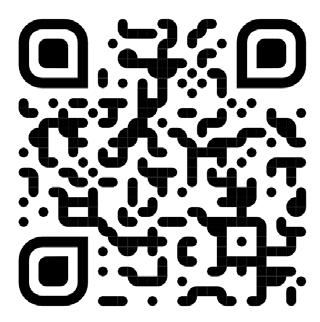

Sincerely,
Randall Speights, Principal Whitehouse
School, Texas

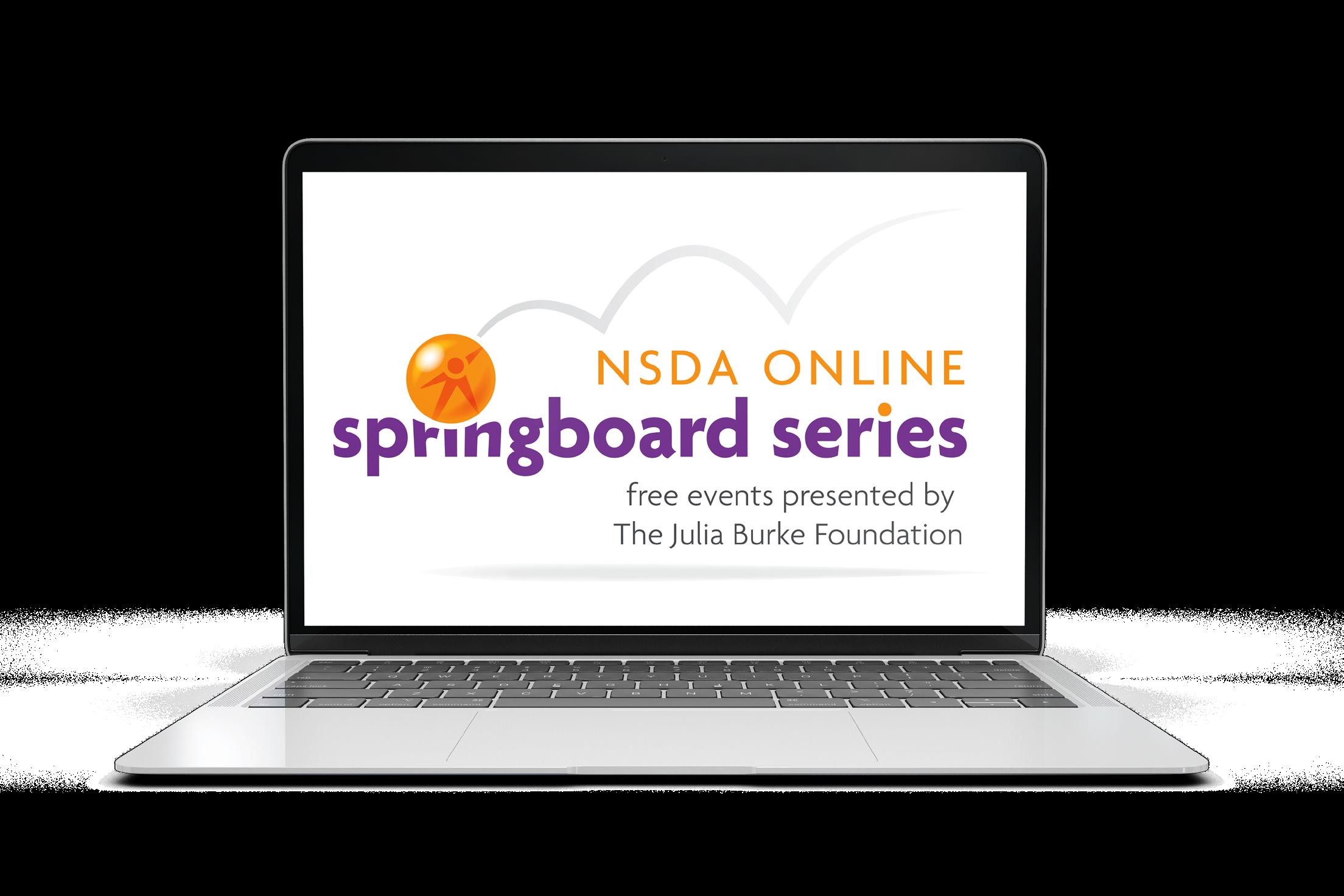

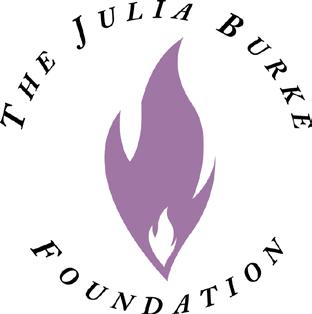
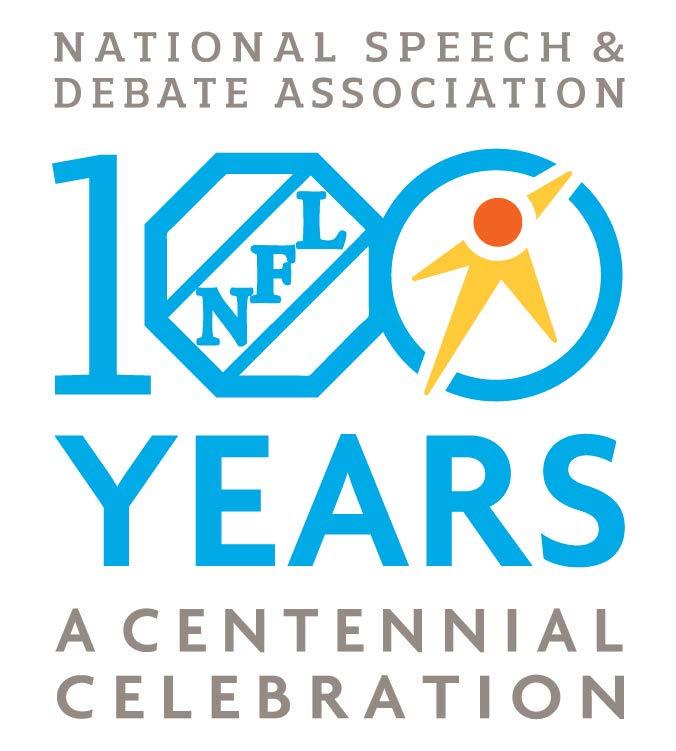
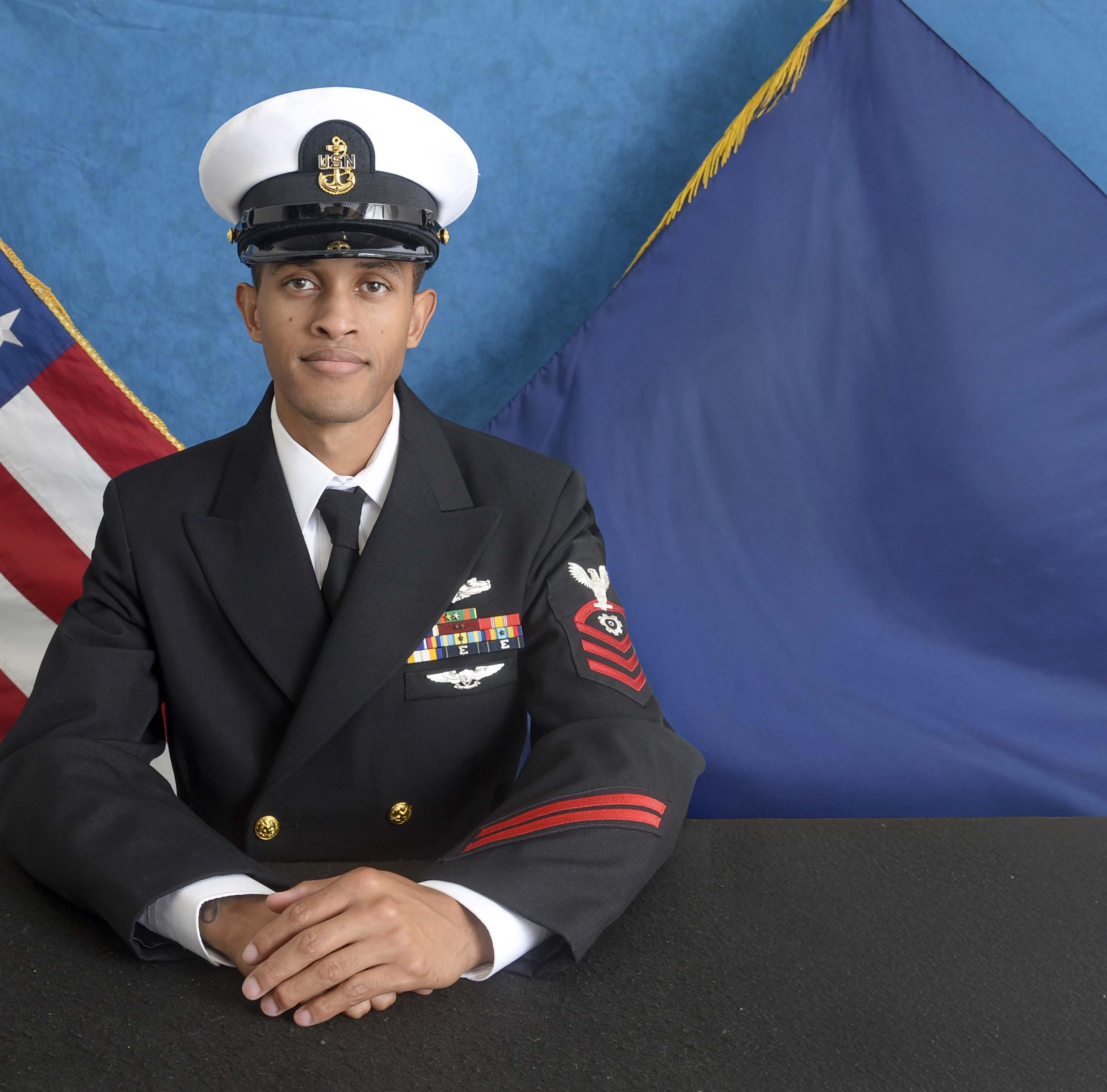
The skills speech and debate equip you with go beyond the classroom, auditoriums, and even grand stages. They teach you how to bring passion to advocacy and change to your communities through your voice.
ROBINSON
Helix Charter High School , California – Class of 2011
WE ARE SPEECH AND DEBATE
DOMINIQUE
